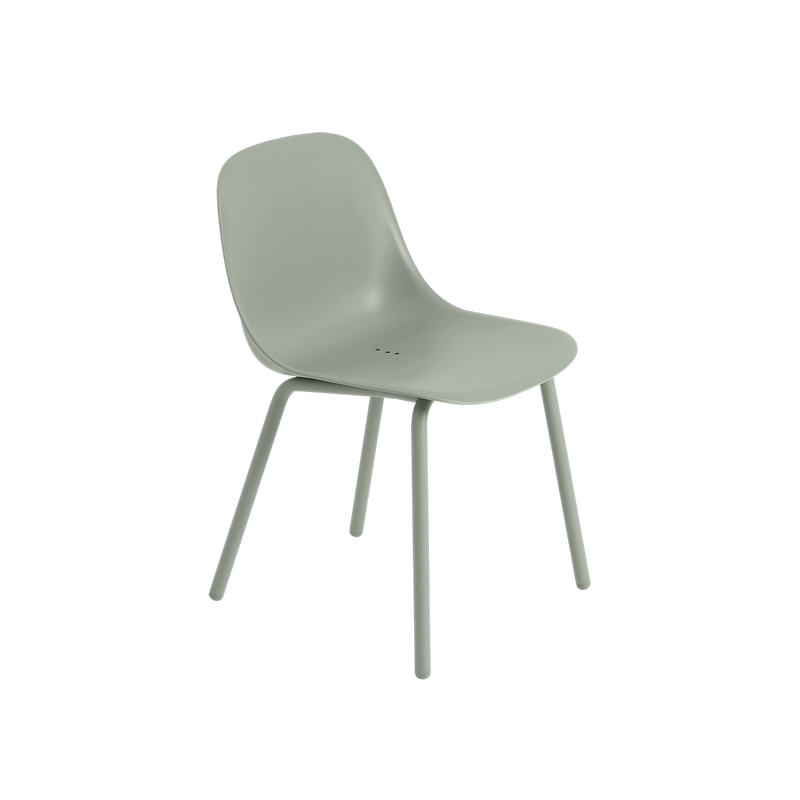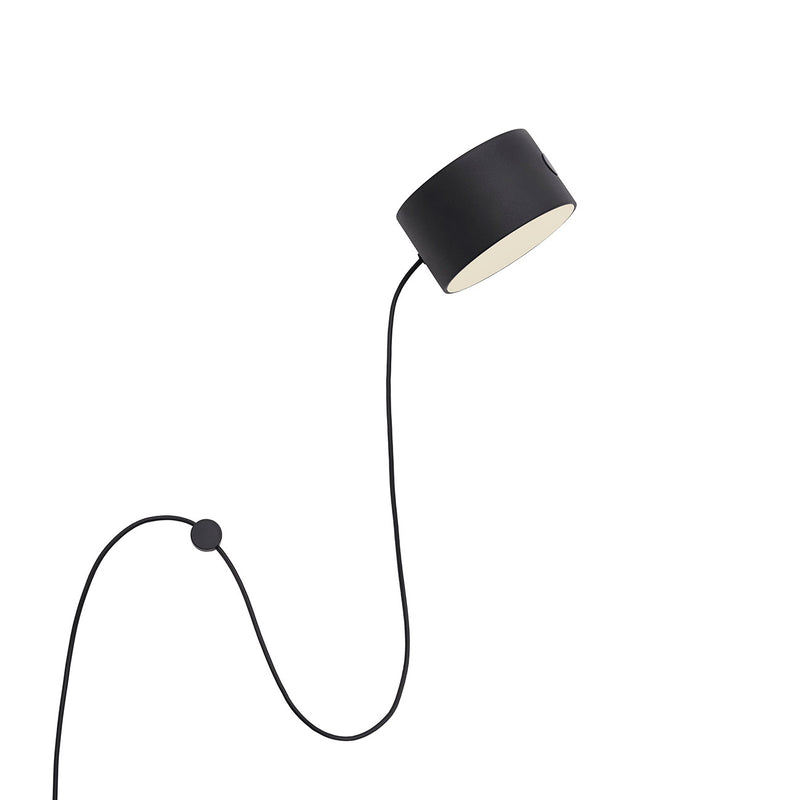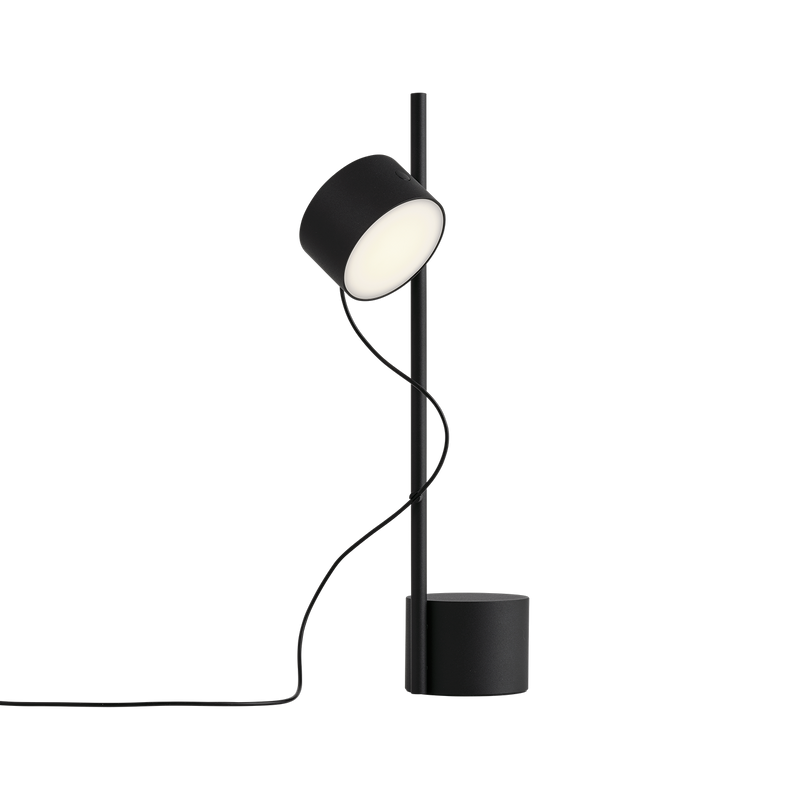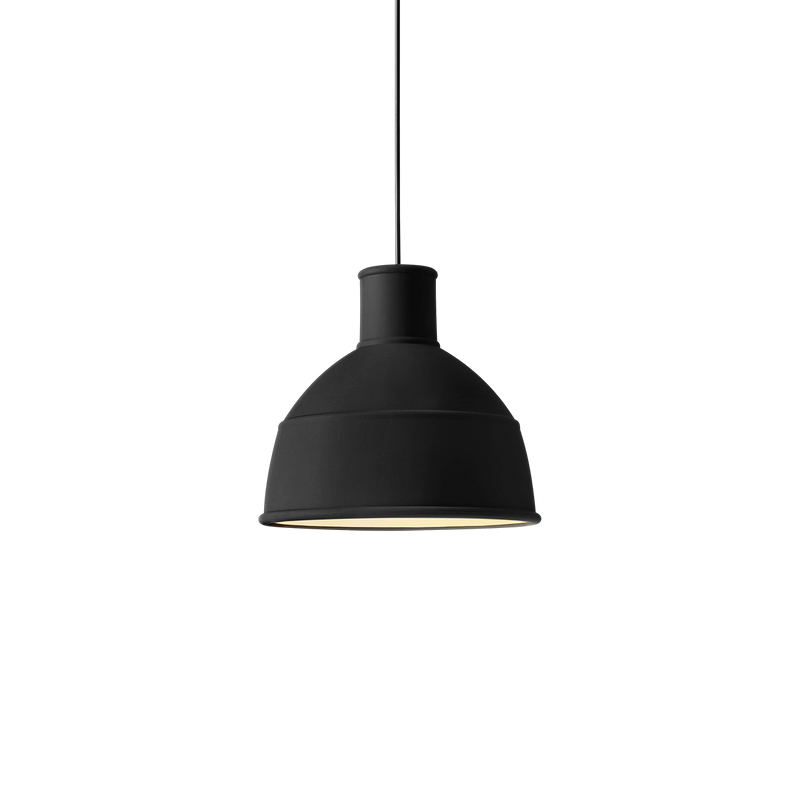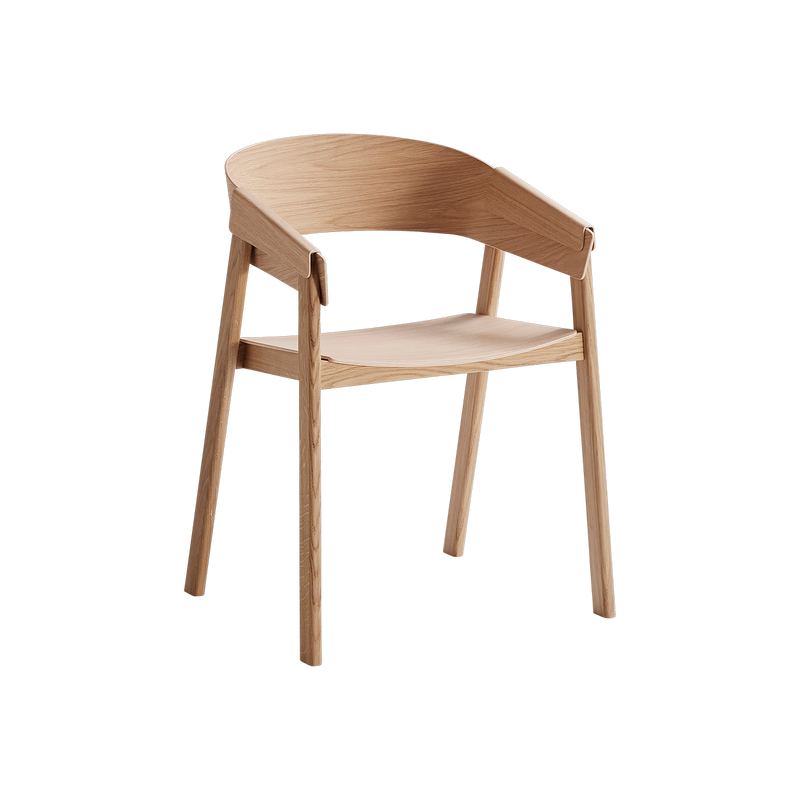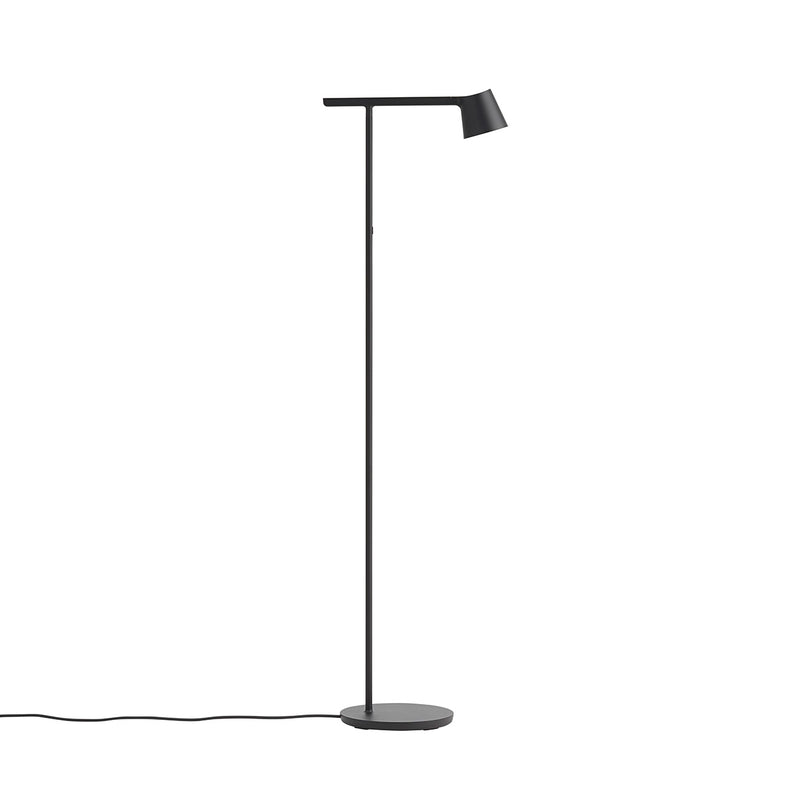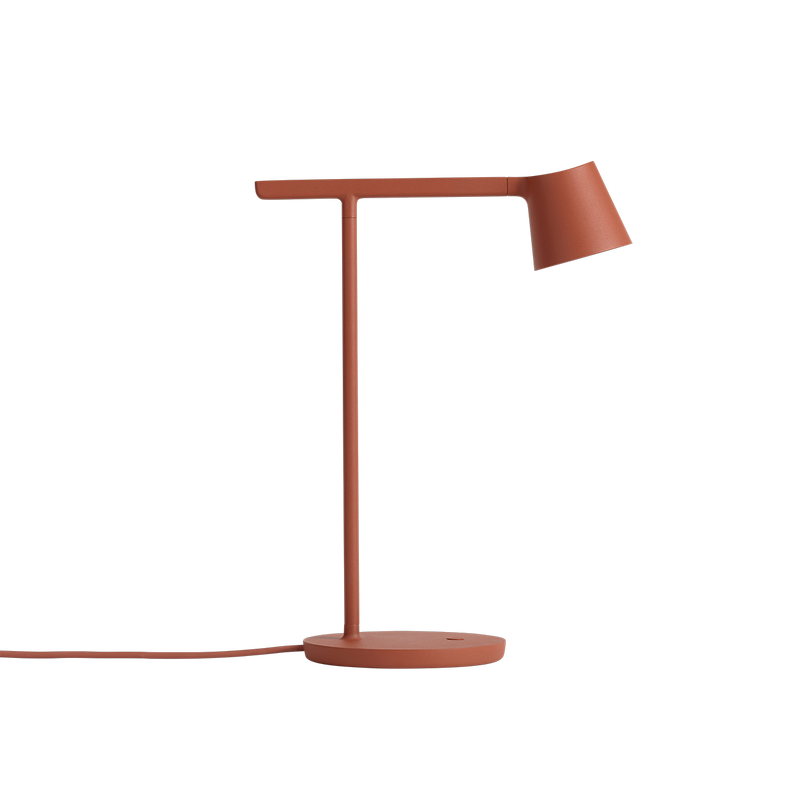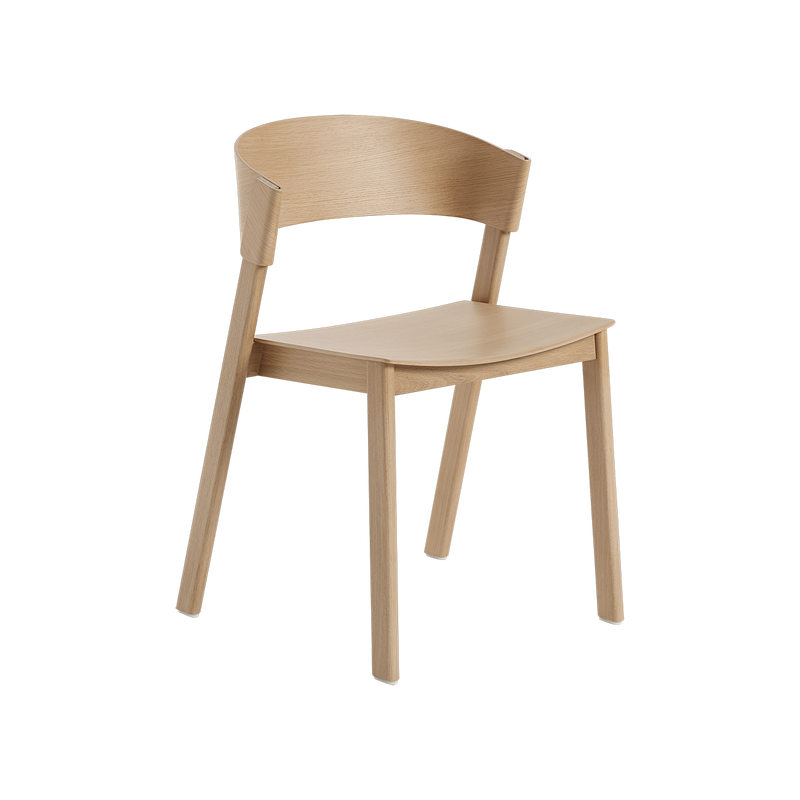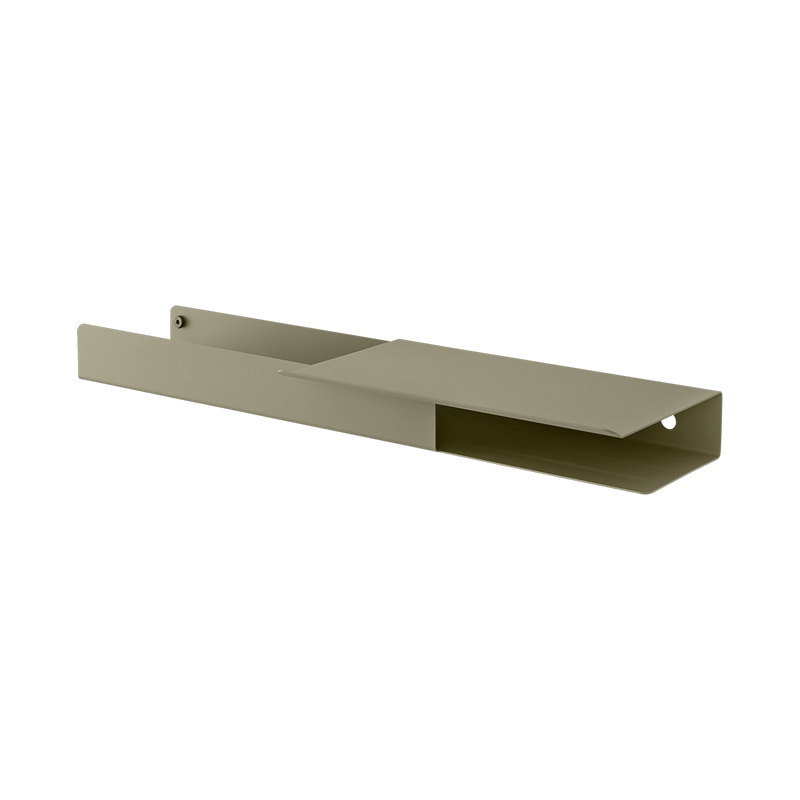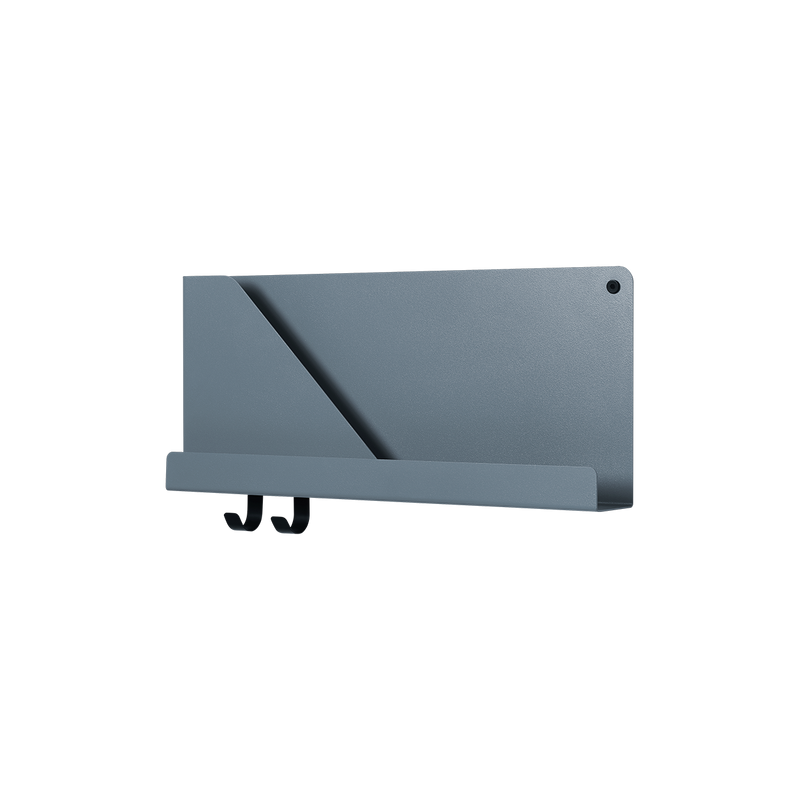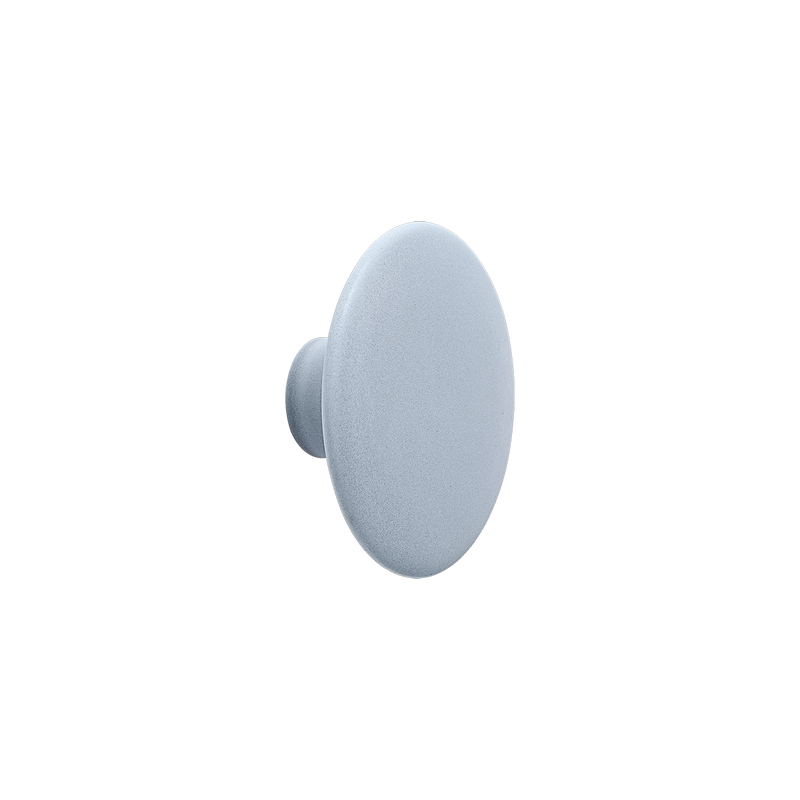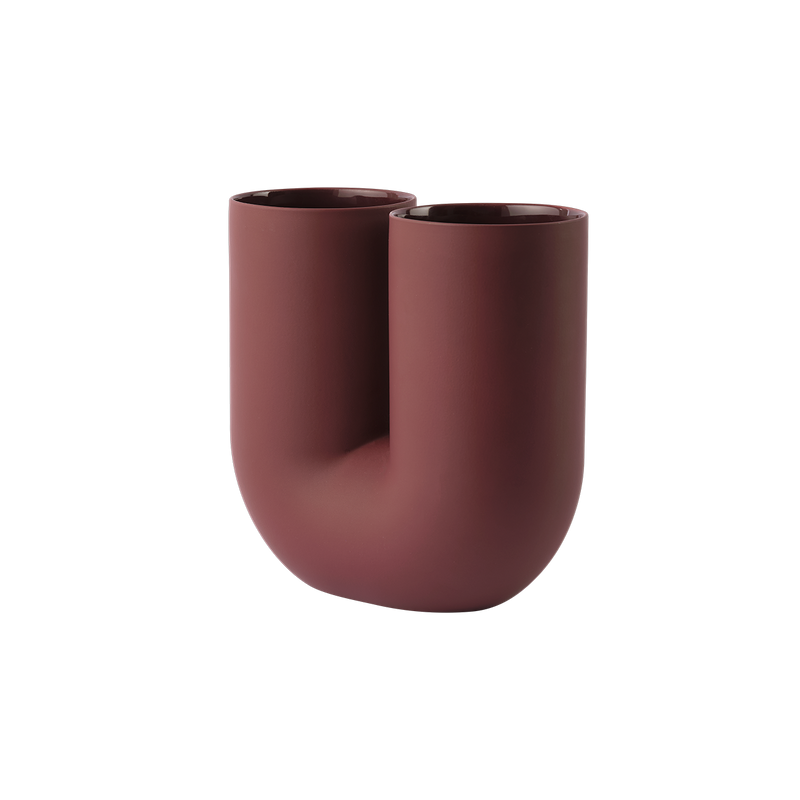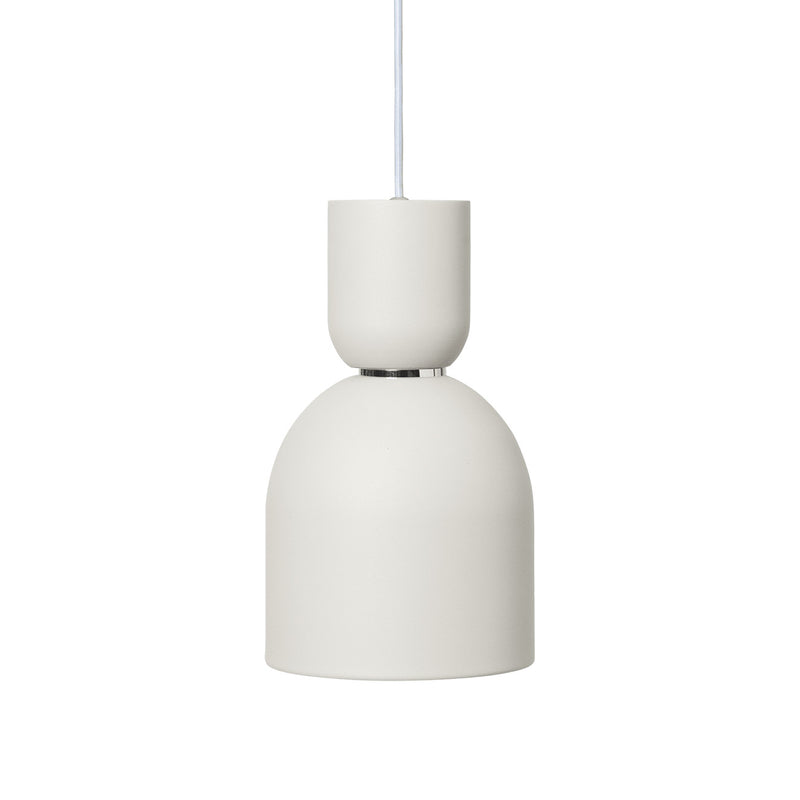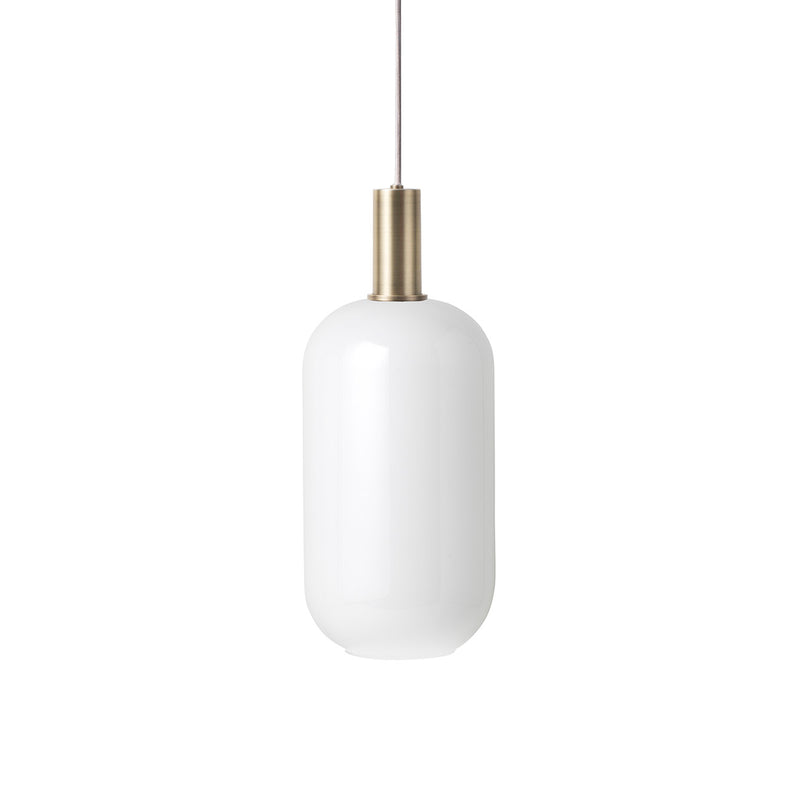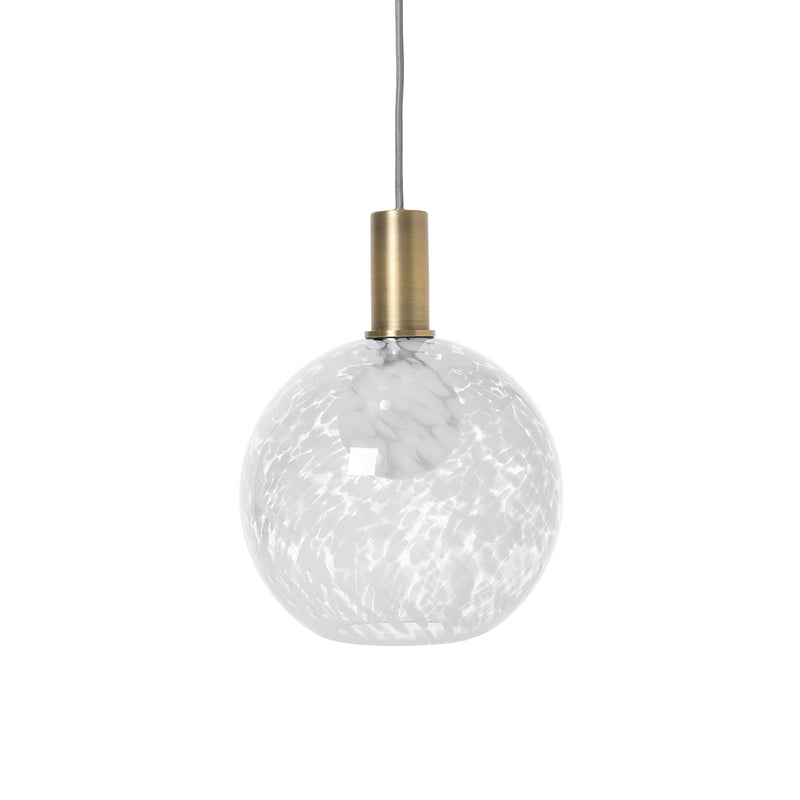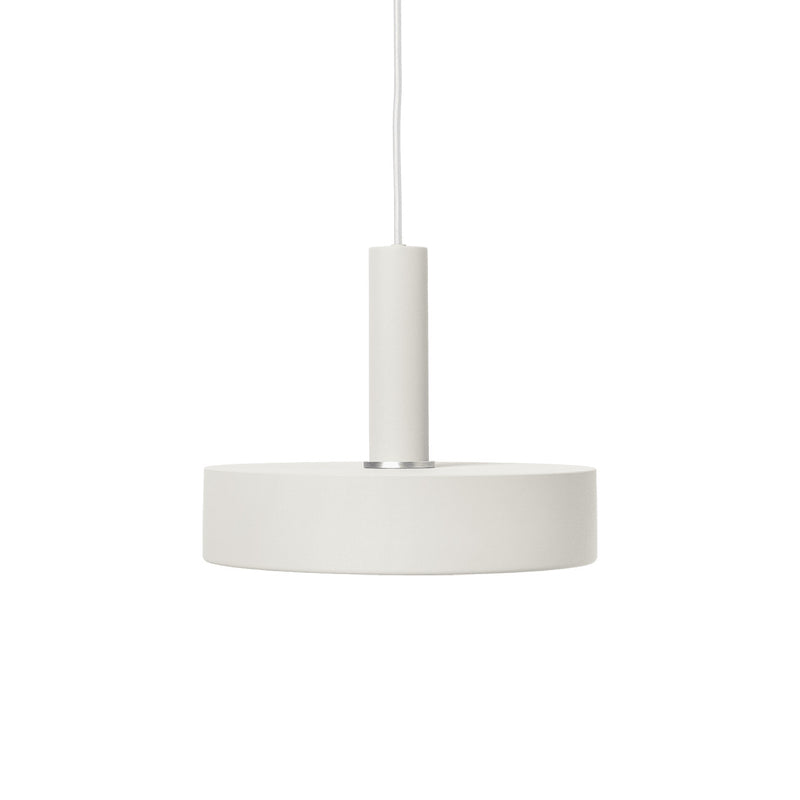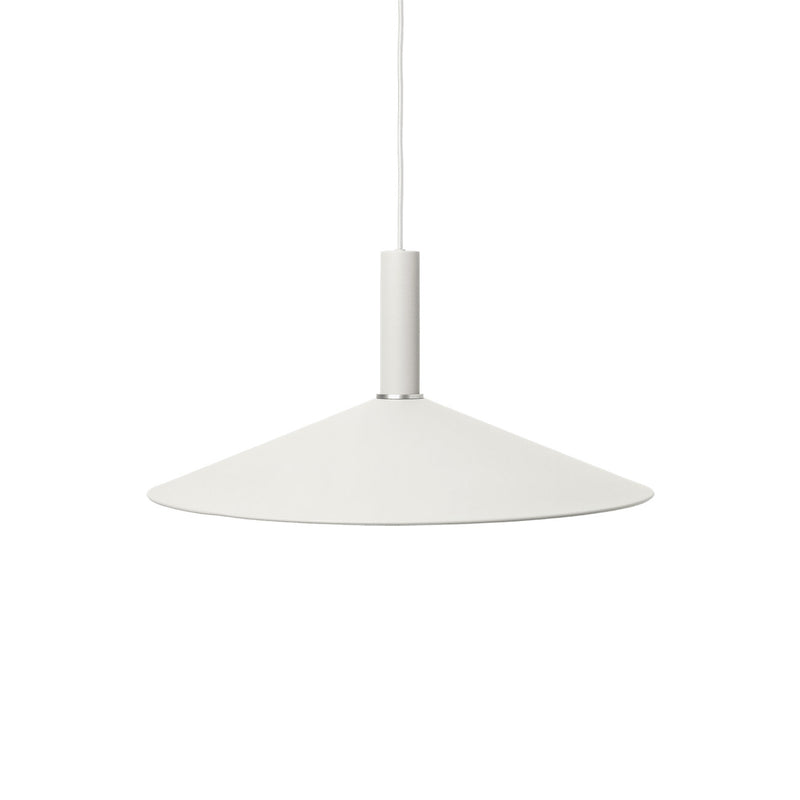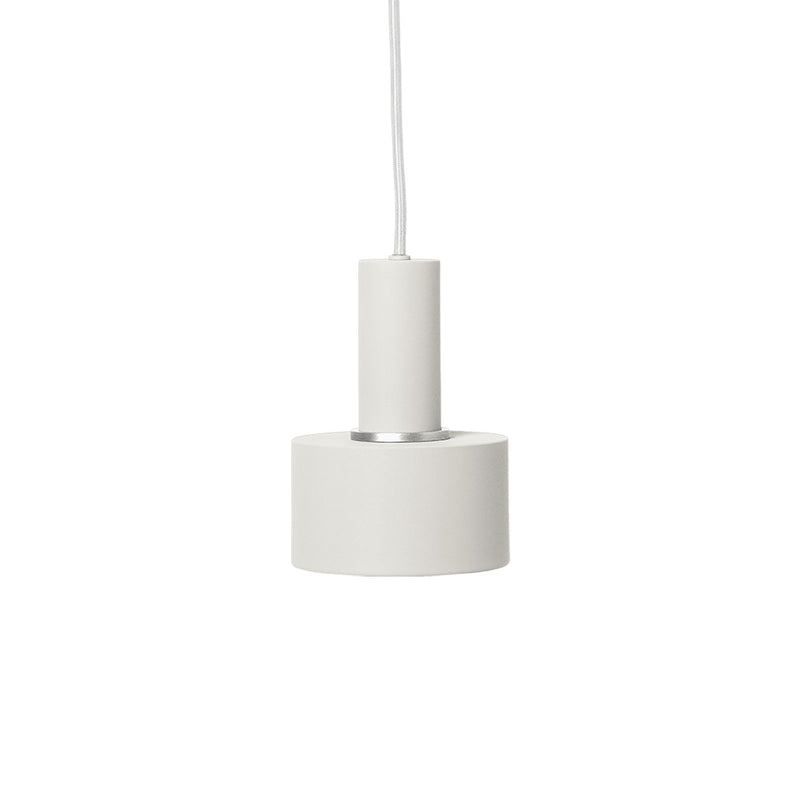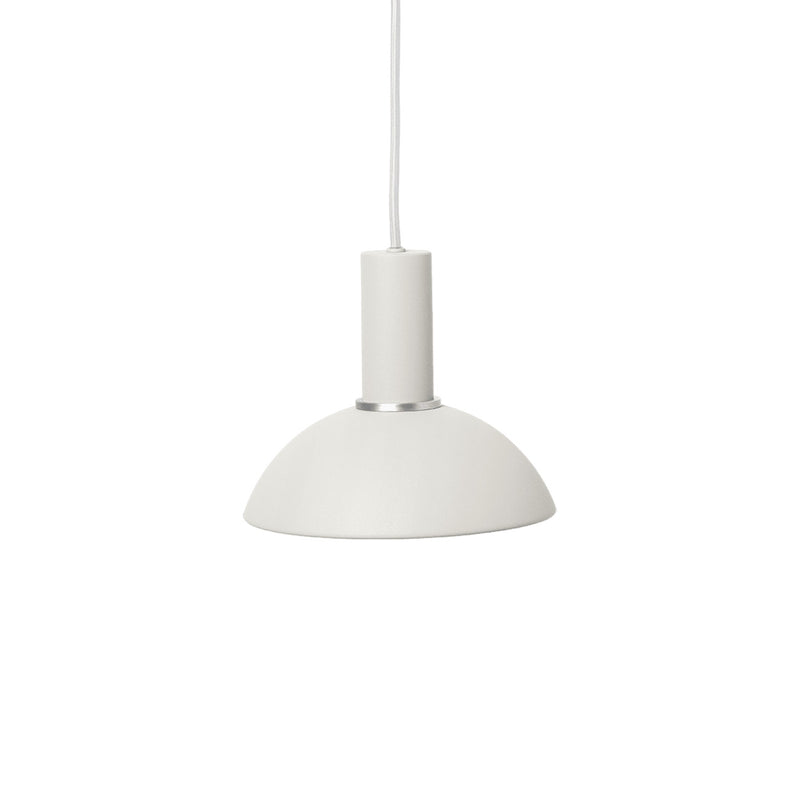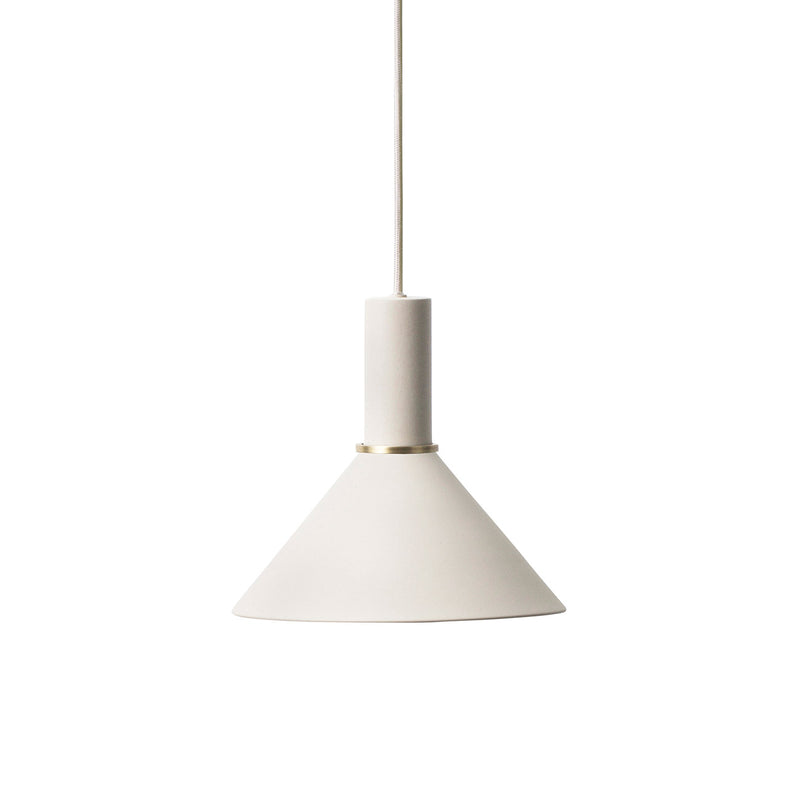Environments
Discover our products in a real-life context and find the inspiration you need.
Immerse yourself in a unique experience where you can explore our designer products in a real-life setting. Visualize how they fit into your home and discover their versatility. Be inspired by the different options and find the furniture that best suits your tastes and needs.
Explore, imagine and create your ideal home.
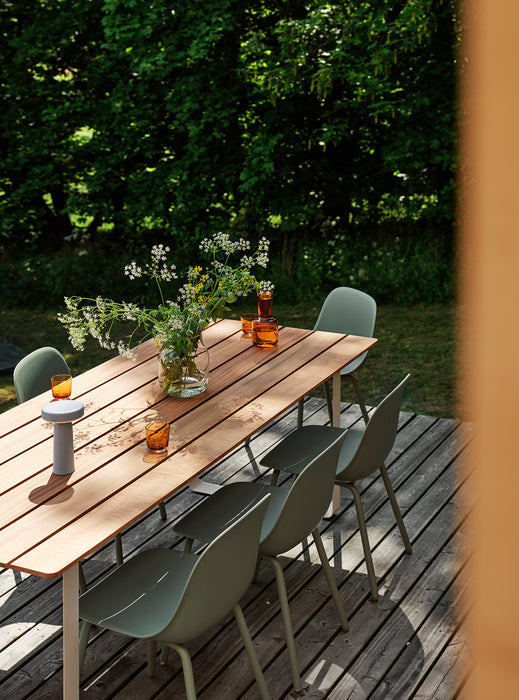

Fiber Outdoor Chair
Muuto's Fiber Outdoor chair offers a new take on contemporary outdoor furniture, combining ergonomic design, durability, and environmental commitment. Its shell, made entirely from 100% recycled plastic, gives a second life to at least 2.5 kg of waste per unit, without sacrificing the aesthetics and comfort characteristic of the Fiber collection.
The enveloping curves of its design provide generous and inviting comfort, while UV stabilizers integrated into the material protect the color from sun exposure and weather conditions. It also features discreet drainage holes that prevent water accumulation, facilitating maintenance and prolonging its outdoor durability.
A lightweight, durable, and sustainable chair, designed to blend seamlessly into terraces, gardens, or contract spaces that combine contemporary design with environmental awareness.
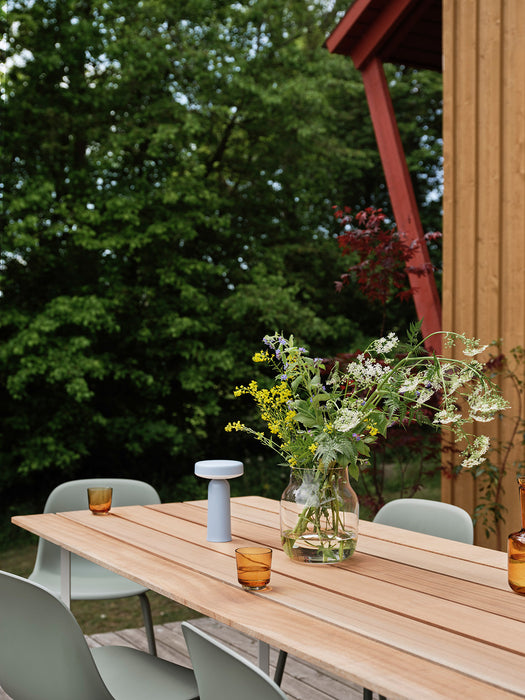

Fiber Outdoor Chair
Muuto's Fiber Outdoor chair offers a new take on contemporary outdoor furniture, combining ergonomic design, durability, and environmental commitment. Its shell, made entirely from 100% recycled plastic, gives a second life to at least 2.5 kg of waste per unit, without sacrificing the aesthetics and comfort characteristic of the Fiber collection.
The enveloping curves of its design provide generous and inviting comfort, while UV stabilizers integrated into the material protect the color from sun exposure and weather conditions. It also features discreet drainage holes that prevent water accumulation, facilitating maintenance and prolonging its outdoor durability.
A lightweight, durable, and sustainable chair, designed to blend seamlessly into terraces, gardens, or contract spaces that combine contemporary design with environmental awareness.
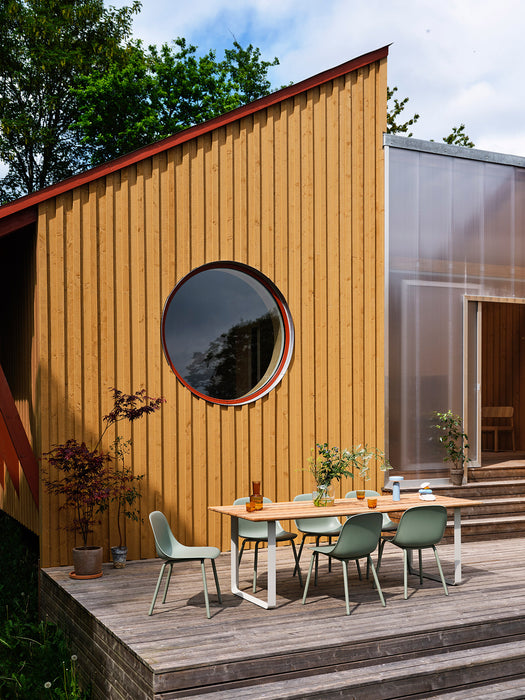

Fiber Outdoor Chair
Muuto's Fiber Outdoor chair offers a new take on contemporary outdoor furniture, combining ergonomic design, durability, and environmental commitment. Its shell, made entirely from 100% recycled plastic, gives a second life to at least 2.5 kg of waste per unit, without sacrificing the aesthetics and comfort characteristic of the Fiber collection.
The enveloping curves of its design provide generous and inviting comfort, while UV stabilizers integrated into the material protect the color from sun exposure and weather conditions. It also features discreet drainage holes that prevent water accumulation, facilitating maintenance and prolonging its outdoor durability.
A lightweight, durable, and sustainable chair, designed to blend seamlessly into terraces, gardens, or contract spaces that combine contemporary design with environmental awareness.
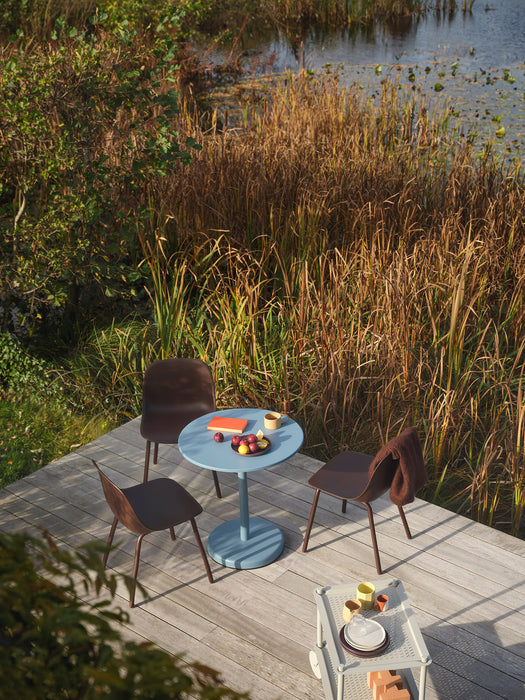

Fiber Outdoor Chair
Muuto's Fiber Outdoor chair offers a new take on contemporary outdoor furniture, combining ergonomic design, durability, and environmental commitment. Its shell, made entirely from 100% recycled plastic, gives a second life to at least 2.5 kg of waste per unit, without sacrificing the aesthetics and comfort characteristic of the Fiber collection.
The enveloping curves of its design provide generous and inviting comfort, while UV stabilizers integrated into the material protect the color from sun exposure and weather conditions. It also features discreet drainage holes that prevent water accumulation, facilitating maintenance and prolonging its outdoor durability.
A lightweight, durable, and sustainable chair, designed to blend seamlessly into terraces, gardens, or contract spaces that combine contemporary design with environmental awareness.
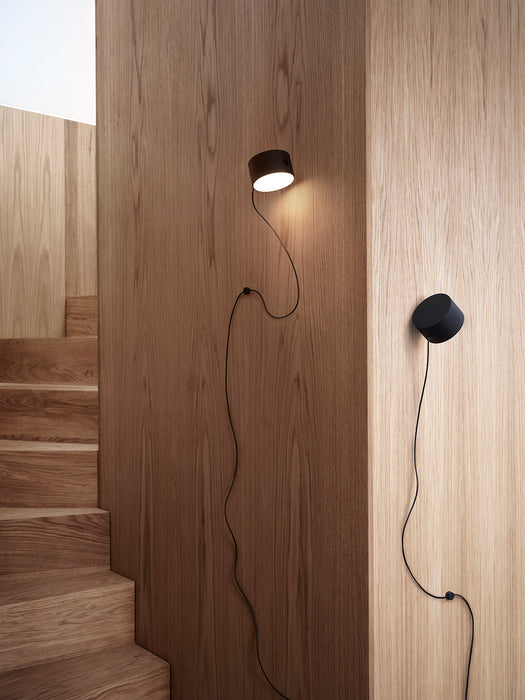

Post wall lamp
Muuto's Post wall lamp reimagines architectural lighting from an innovative perspective, combining essential forms, graphic design, and advanced functionality. Its magnetic mounting system allows the light to be freely directed, rotated, and dimmed, adapting to the needs of each moment and creating personalized atmospheres.
The design allows the cable to be routed along the wall in a linear fashion or in more expressive compositions, transforming the installation into a visual gesture that adds character to the space. Thanks to its power hub, additional lighting units (available as accessories) can be added, expanding the configuration and adapting it to different contexts or metal surfaces.
A flexible, sculptural, and contemporary lighting solution, ideal for those seeking a balance between technology, design, and creative freedom.
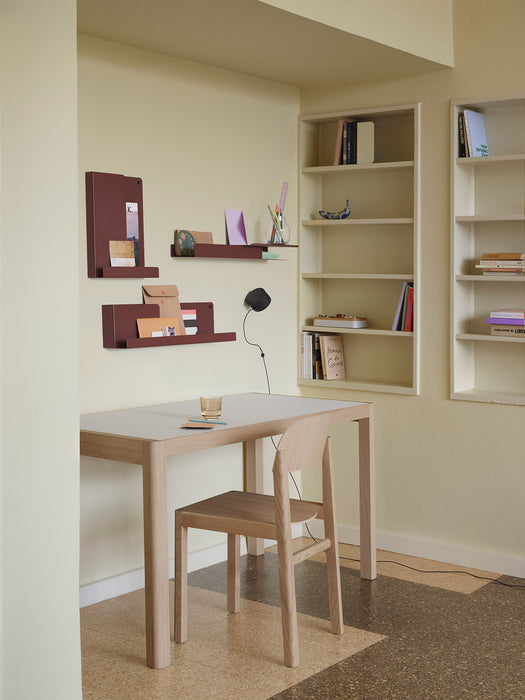

Post wall lamp
Muuto's Post wall lamp reimagines architectural lighting from an innovative perspective, combining essential forms, graphic design, and advanced functionality. Its magnetic mounting system allows the light to be freely directed, rotated, and dimmed, adapting to the needs of each moment and creating personalized atmospheres.
The design allows the cable to be routed along the wall in a linear fashion or in more expressive compositions, transforming the installation into a visual gesture that adds character to the space. Thanks to its power hub, additional lighting units (available as accessories) can be added, expanding the configuration and adapting it to different contexts or metal surfaces.
A flexible, sculptural, and contemporary lighting solution, ideal for those seeking a balance between technology, design, and creative freedom.
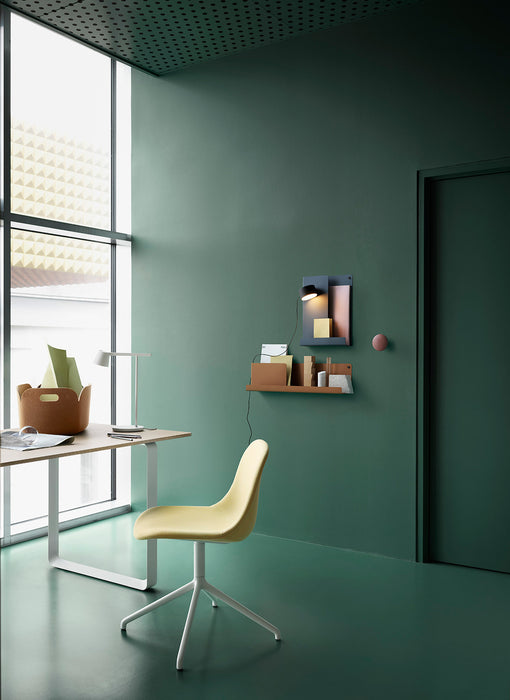

Post wall lamp
Muuto's Post wall lamp reimagines architectural lighting from an innovative perspective, combining essential forms, graphic design, and advanced functionality. Its magnetic mounting system allows the light to be freely directed, rotated, and dimmed, adapting to the needs of each moment and creating personalized atmospheres.
The design allows the cable to be routed along the wall in a linear fashion or in more expressive compositions, transforming the installation into a visual gesture that adds character to the space. Thanks to its power hub, additional lighting units (available as accessories) can be added, expanding the configuration and adapting it to different contexts or metal surfaces.
A flexible, sculptural, and contemporary lighting solution, ideal for those seeking a balance between technology, design, and creative freedom.
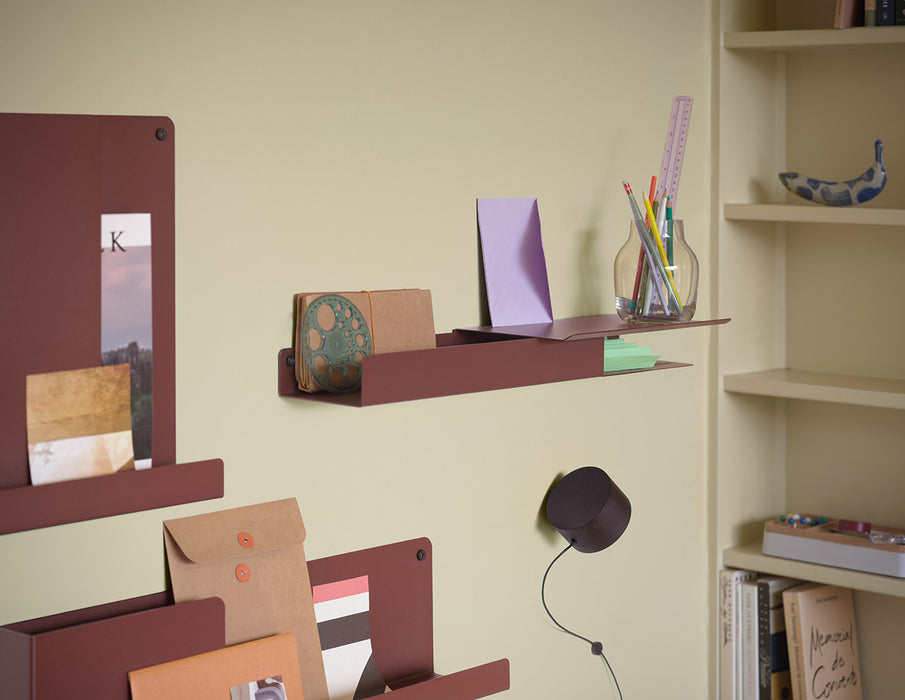

Post wall lamp
Muuto's Post wall lamp reimagines architectural lighting from an innovative perspective, combining essential forms, graphic design, and advanced functionality. Its magnetic mounting system allows the light to be freely directed, rotated, and dimmed, adapting to the needs of each moment and creating personalized atmospheres.
The design allows the cable to be routed along the wall in a linear fashion or in more expressive compositions, transforming the installation into a visual gesture that adds character to the space. Thanks to its power hub, additional lighting units (available as accessories) can be added, expanding the configuration and adapting it to different contexts or metal surfaces.
A flexible, sculptural, and contemporary lighting solution, ideal for those seeking a balance between technology, design, and creative freedom.
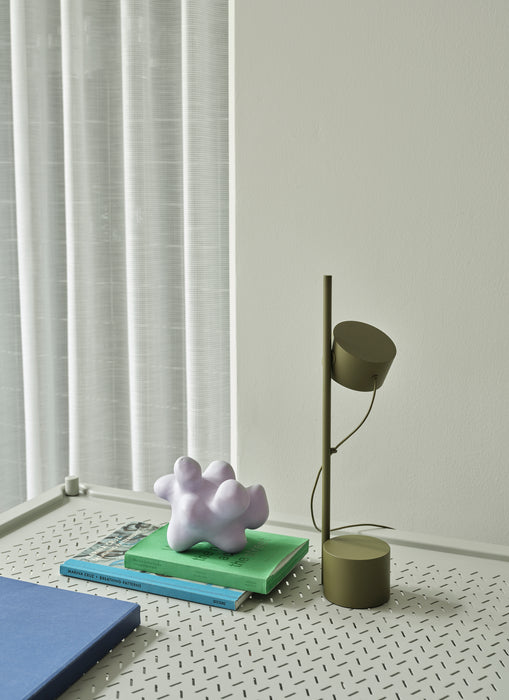

Post table lamp
Muuto's Post table lamp redefines lighting through innovative means, combining essential shapes, graphic aesthetics, and advanced functional technology. Its modular design incorporates a magnetically connected light unit that allows you to freely orient, rotate, and dim the light, adapting the lighting to different moments and needs.
Thanks to its clean structure and compact base, this version is ideal for bedside tables, bookshelves, desks, or mantels, blending seamlessly into home or professional settings. The magnetic fixing system allows for easy rearrangement of elements, while the magnetic cable ties ensure neat and elegant cable management. A second light unit (optional accessory) can also be added by connecting it to the same power hub, thus expanding the lighting possibilities of the unit.
A piece that balances personalized functionality and contemporary language, transforming light into a flexible and sophisticated experience.
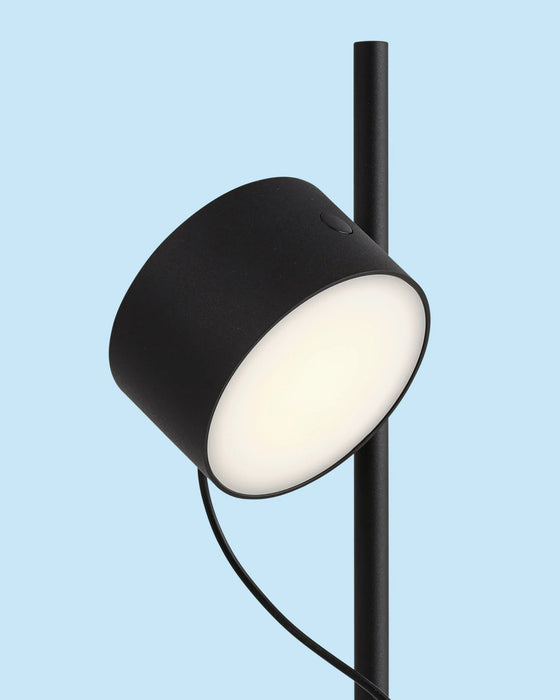

Post table lamp
Muuto's Post table lamp redefines lighting through innovative means, combining essential shapes, graphic aesthetics, and advanced functional technology. Its modular design incorporates a magnetically connected light unit that allows you to freely orient, rotate, and dim the light, adapting the lighting to different moments and needs.
Thanks to its clean structure and compact base, this version is ideal for bedside tables, bookshelves, desks, or mantels, blending seamlessly into home or professional settings. The magnetic fixing system allows for easy rearrangement of elements, while the magnetic cable ties ensure neat and elegant cable management. A second light unit (optional accessory) can also be added by connecting it to the same power hub, thus expanding the lighting possibilities of the unit.
A piece that balances personalized functionality and contemporary language, transforming light into a flexible and sophisticated experience.
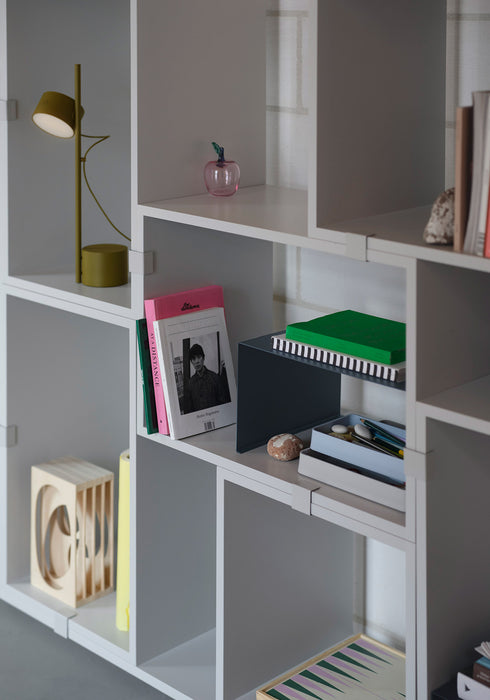

Post table lamp
Muuto's Post table lamp redefines lighting through innovative means, combining essential shapes, graphic aesthetics, and advanced functional technology. Its modular design incorporates a magnetically connected light unit that allows you to freely orient, rotate, and dim the light, adapting the lighting to different moments and needs.
Thanks to its clean structure and compact base, this version is ideal for bedside tables, bookshelves, desks, or mantels, blending seamlessly into home or professional settings. The magnetic fixing system allows for easy rearrangement of elements, while the magnetic cable ties ensure neat and elegant cable management. A second light unit (optional accessory) can also be added by connecting it to the same power hub, thus expanding the lighting possibilities of the unit.
A piece that balances personalized functionality and contemporary language, transforming light into a flexible and sophisticated experience.
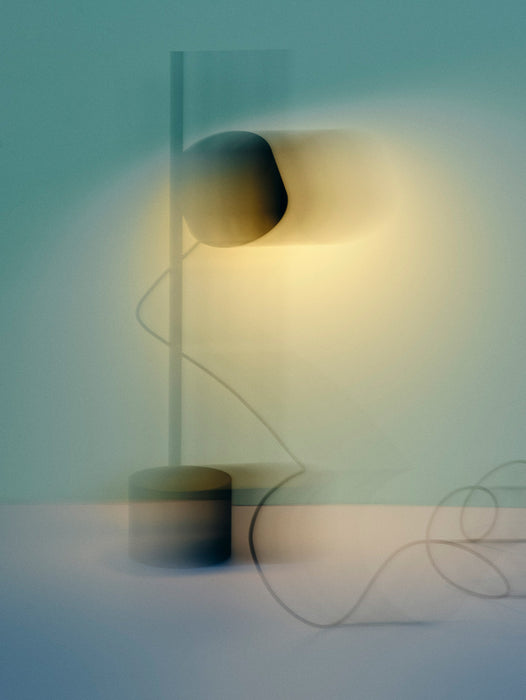

Post table lamp
Muuto's Post table lamp redefines lighting through innovative means, combining essential shapes, graphic aesthetics, and advanced functional technology. Its modular design incorporates a magnetically connected light unit that allows you to freely orient, rotate, and dim the light, adapting the lighting to different moments and needs.
Thanks to its clean structure and compact base, this version is ideal for bedside tables, bookshelves, desks, or mantels, blending seamlessly into home or professional settings. The magnetic fixing system allows for easy rearrangement of elements, while the magnetic cable ties ensure neat and elegant cable management. A second light unit (optional accessory) can also be added by connecting it to the same power hub, thus expanding the lighting possibilities of the unit.
A piece that balances personalized functionality and contemporary language, transforming light into a flexible and sophisticated experience.
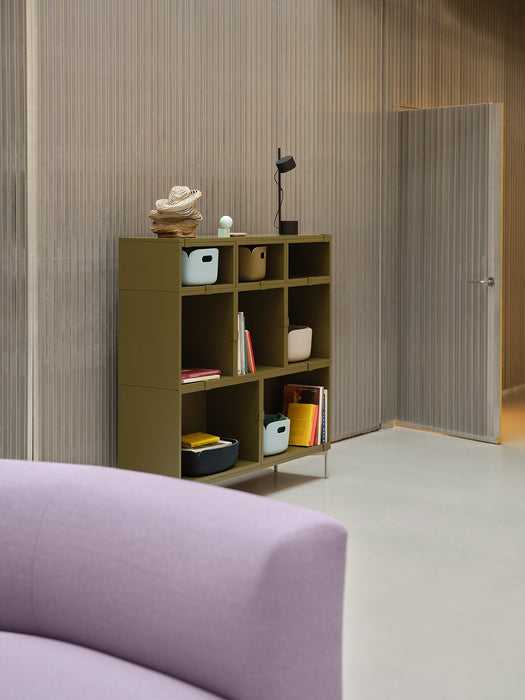

Post table lamp
Muuto's Post table lamp redefines lighting through innovative means, combining essential shapes, graphic aesthetics, and advanced functional technology. Its modular design incorporates a magnetically connected light unit that allows you to freely orient, rotate, and dim the light, adapting the lighting to different moments and needs.
Thanks to its clean structure and compact base, this version is ideal for bedside tables, bookshelves, desks, or mantels, blending seamlessly into home or professional settings. The magnetic fixing system allows for easy rearrangement of elements, while the magnetic cable ties ensure neat and elegant cable management. A second light unit (optional accessory) can also be added by connecting it to the same power hub, thus expanding the lighting possibilities of the unit.
A piece that balances personalized functionality and contemporary language, transforming light into a flexible and sophisticated experience.
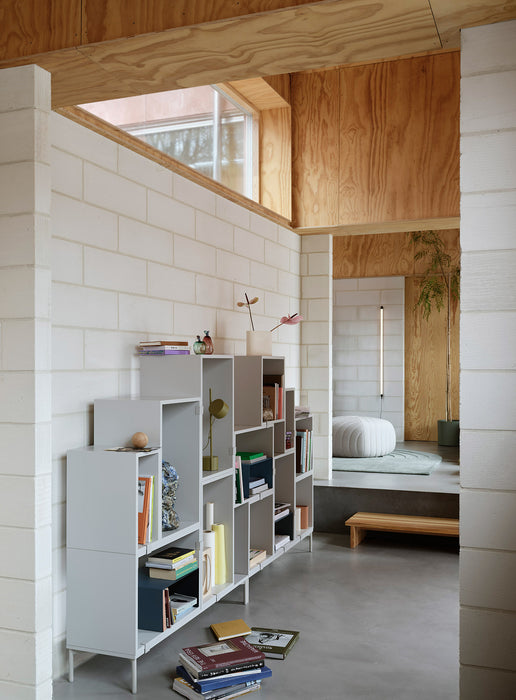

Post table lamp
Muuto's Post table lamp redefines lighting through innovative means, combining essential shapes, graphic aesthetics, and advanced functional technology. Its modular design incorporates a magnetically connected light unit that allows you to freely orient, rotate, and dim the light, adapting the lighting to different moments and needs.
Thanks to its clean structure and compact base, this version is ideal for bedside tables, bookshelves, desks, or mantels, blending seamlessly into home or professional settings. The magnetic fixing system allows for easy rearrangement of elements, while the magnetic cable ties ensure neat and elegant cable management. A second light unit (optional accessory) can also be added by connecting it to the same power hub, thus expanding the lighting possibilities of the unit.
A piece that balances personalized functionality and contemporary language, transforming light into a flexible and sophisticated experience.
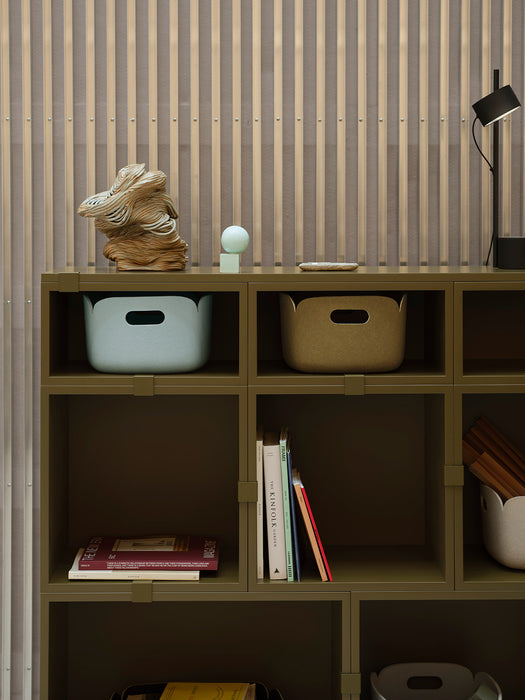

Post table lamp
Muuto's Post table lamp redefines lighting through innovative means, combining essential shapes, graphic aesthetics, and advanced functional technology. Its modular design incorporates a magnetically connected light unit that allows you to freely orient, rotate, and dim the light, adapting the lighting to different moments and needs.
Thanks to its clean structure and compact base, this version is ideal for bedside tables, bookshelves, desks, or mantels, blending seamlessly into home or professional settings. The magnetic fixing system allows for easy rearrangement of elements, while the magnetic cable ties ensure neat and elegant cable management. A second light unit (optional accessory) can also be added by connecting it to the same power hub, thus expanding the lighting possibilities of the unit.
A piece that balances personalized functionality and contemporary language, transforming light into a flexible and sophisticated experience.
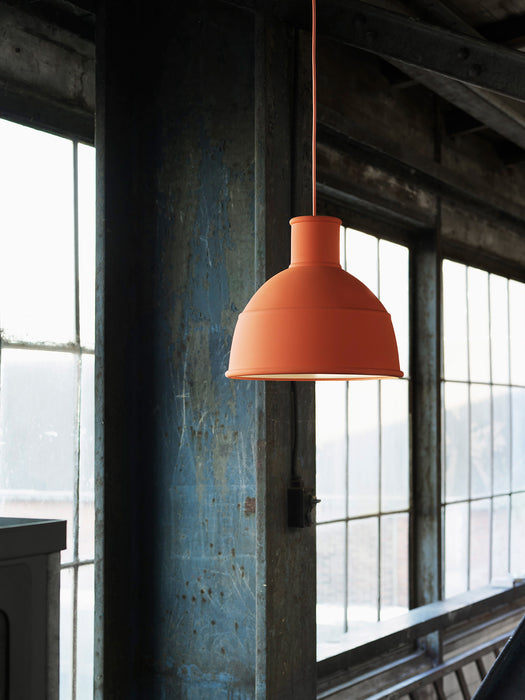

Unfold ceiling lamp
Muuto's Unfold lamp reinterprets the iconic industrial pendant from a contemporary and friendly perspective, combining functionality and visual expressiveness. Made of flexible silicone, its silhouette retains the robust essence of the classic design, but with a softer, more tactile character that brings warmth and a subtle playfulness to the space.
Available in a carefully curated range of vibrant colors or in a translucent version for a more enveloping ambient light, Unfold adapts naturally to a variety of settings: kitchens, dining rooms, workspaces, or contract environments. Its material allows for agile installation and a lightweight presence, making it a versatile option that transforms lighting into a contemporary visual statement.
A lamp that balances shape, texture and color to create atmospheres with personality.
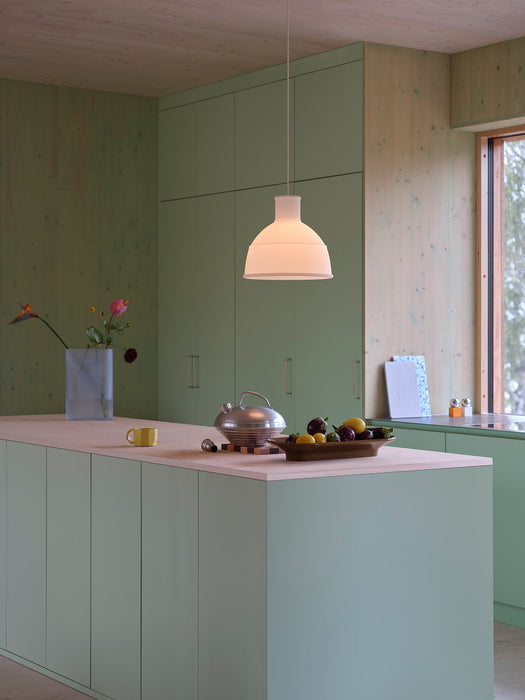

Unfold ceiling lamp
Muuto's Unfold lamp reinterprets the iconic industrial pendant from a contemporary and friendly perspective, combining functionality and visual expressiveness. Made of flexible silicone, its silhouette retains the robust essence of the classic design, but with a softer, more tactile character that brings warmth and a subtle playfulness to the space.
Available in a carefully curated range of vibrant colors or in a translucent version for a more enveloping ambient light, Unfold adapts naturally to a variety of settings: kitchens, dining rooms, workspaces, or contract environments. Its material allows for agile installation and a lightweight presence, making it a versatile option that transforms lighting into a contemporary visual statement.
A lamp that balances shape, texture and color to create atmospheres with personality.
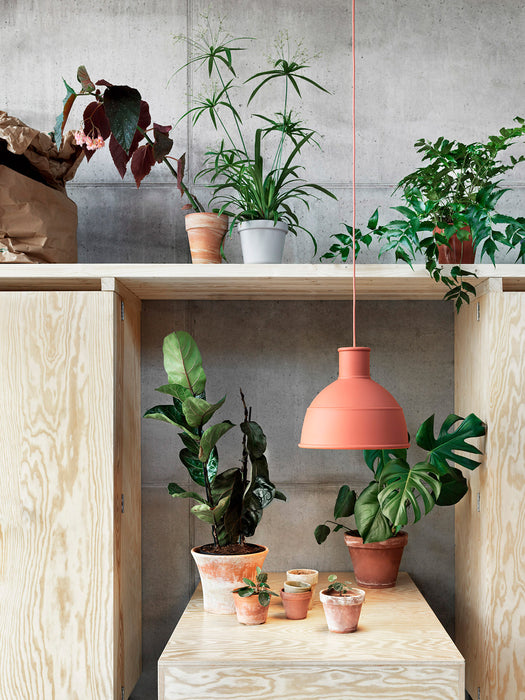

Unfold ceiling lamp
Muuto's Unfold lamp reinterprets the iconic industrial pendant from a contemporary and friendly perspective, combining functionality and visual expressiveness. Made of flexible silicone, its silhouette retains the robust essence of the classic design, but with a softer, more tactile character that brings warmth and a subtle playfulness to the space.
Available in a carefully curated range of vibrant colors or in a translucent version for a more enveloping ambient light, Unfold adapts naturally to a variety of settings: kitchens, dining rooms, workspaces, or contract environments. Its material allows for agile installation and a lightweight presence, making it a versatile option that transforms lighting into a contemporary visual statement.
A lamp that balances shape, texture and color to create atmospheres with personality.
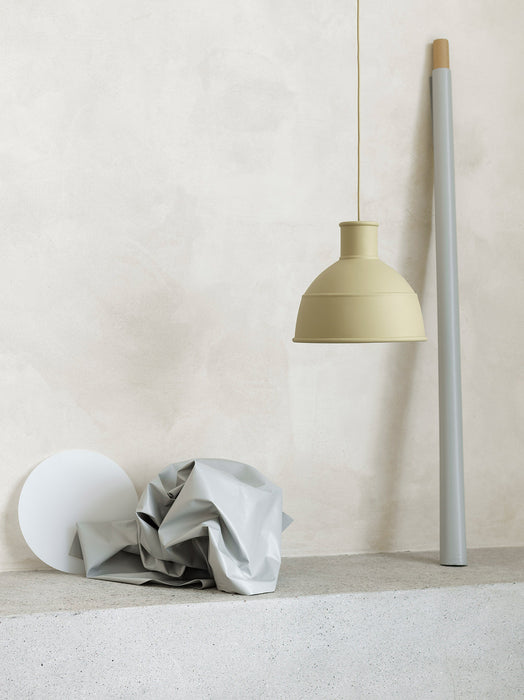

Unfold ceiling lamp
Muuto's Unfold lamp reinterprets the iconic industrial pendant from a contemporary and friendly perspective, combining functionality and visual expressiveness. Made of flexible silicone, its silhouette retains the robust essence of the classic design, but with a softer, more tactile character that brings warmth and a subtle playfulness to the space.
Available in a carefully curated range of vibrant colors or in a translucent version for a more enveloping ambient light, Unfold adapts naturally to a variety of settings: kitchens, dining rooms, workspaces, or contract environments. Its material allows for agile installation and a lightweight presence, making it a versatile option that transforms lighting into a contemporary visual statement.
A lamp that balances shape, texture and color to create atmospheres with personality.
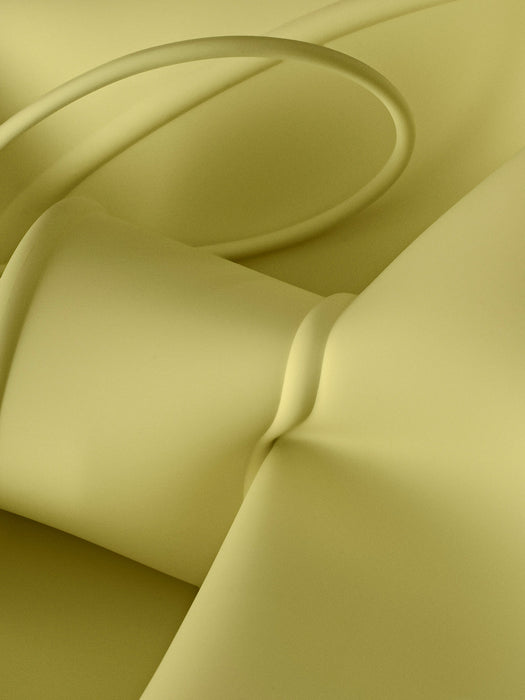

Unfold ceiling lamp
Muuto's Unfold lamp reinterprets the iconic industrial pendant from a contemporary and friendly perspective, combining functionality and visual expressiveness. Made of flexible silicone, its silhouette retains the robust essence of the classic design, but with a softer, more tactile character that brings warmth and a subtle playfulness to the space.
Available in a carefully curated range of vibrant colors or in a translucent version for a more enveloping ambient light, Unfold adapts naturally to a variety of settings: kitchens, dining rooms, workspaces, or contract environments. Its material allows for agile installation and a lightweight presence, making it a versatile option that transforms lighting into a contemporary visual statement.
A lamp that balances shape, texture and color to create atmospheres with personality.
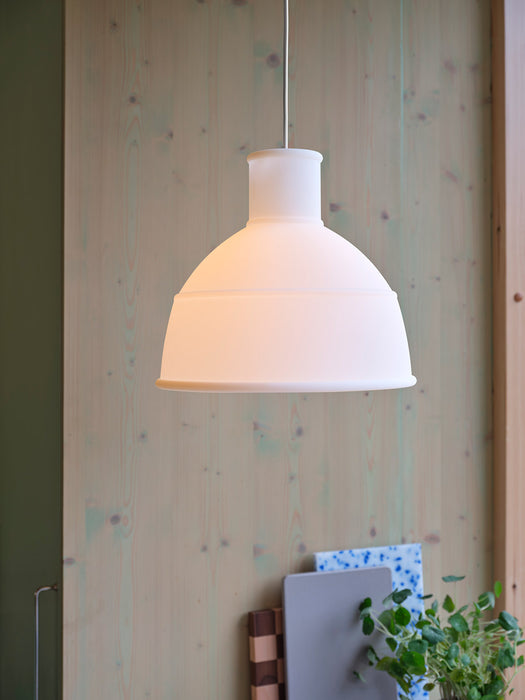

Unfold ceiling lamp
Muuto's Unfold lamp reinterprets the iconic industrial pendant from a contemporary and friendly perspective, combining functionality and visual expressiveness. Made of flexible silicone, its silhouette retains the robust essence of the classic design, but with a softer, more tactile character that brings warmth and a subtle playfulness to the space.
Available in a carefully curated range of vibrant colors or in a translucent version for a more enveloping ambient light, Unfold adapts naturally to a variety of settings: kitchens, dining rooms, workspaces, or contract environments. Its material allows for agile installation and a lightweight presence, making it a versatile option that transforms lighting into a contemporary visual statement.
A lamp that balances shape, texture and color to create atmospheres with personality.
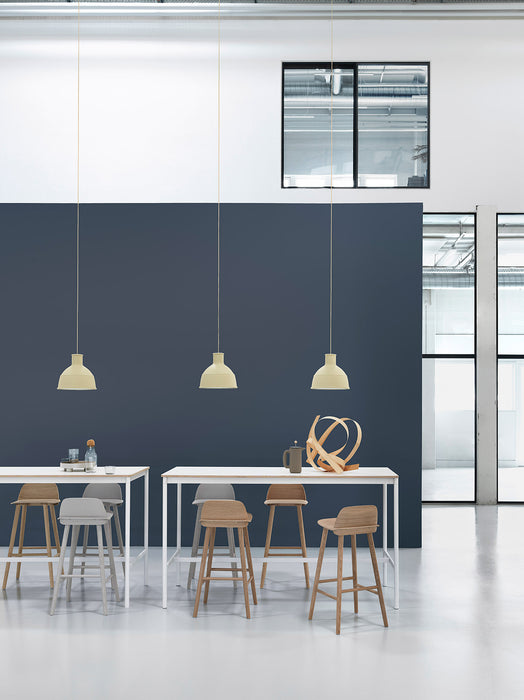

Unfold ceiling lamp
Muuto's Unfold lamp reinterprets the iconic industrial pendant from a contemporary and friendly perspective, combining functionality and visual expressiveness. Made of flexible silicone, its silhouette retains the robust essence of the classic design, but with a softer, more tactile character that brings warmth and a subtle playfulness to the space.
Available in a carefully curated range of vibrant colors or in a translucent version for a more enveloping ambient light, Unfold adapts naturally to a variety of settings: kitchens, dining rooms, workspaces, or contract environments. Its material allows for agile installation and a lightweight presence, making it a versatile option that transforms lighting into a contemporary visual statement.
A lamp that balances shape, texture and color to create atmospheres with personality.
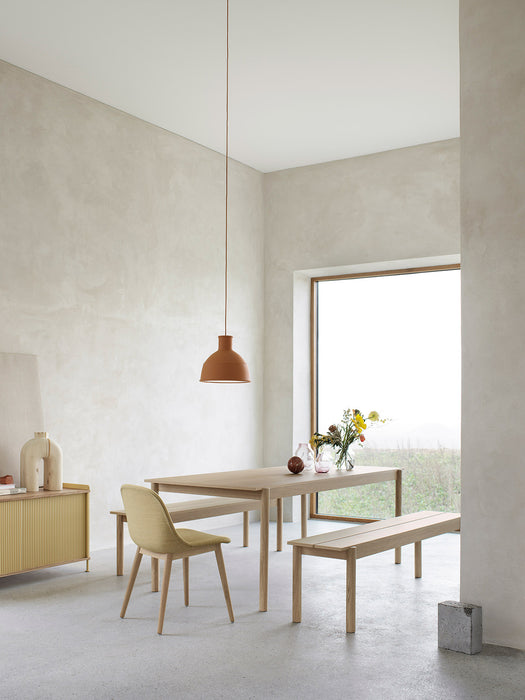

Unfold ceiling lamp
Muuto's Unfold lamp reinterprets the iconic industrial pendant from a contemporary and friendly perspective, combining functionality and visual expressiveness. Made of flexible silicone, its silhouette retains the robust essence of the classic design, but with a softer, more tactile character that brings warmth and a subtle playfulness to the space.
Available in a carefully curated range of vibrant colors or in a translucent version for a more enveloping ambient light, Unfold adapts naturally to a variety of settings: kitchens, dining rooms, workspaces, or contract environments. Its material allows for agile installation and a lightweight presence, making it a versatile option that transforms lighting into a contemporary visual statement.
A lamp that balances shape, texture and color to create atmospheres with personality.
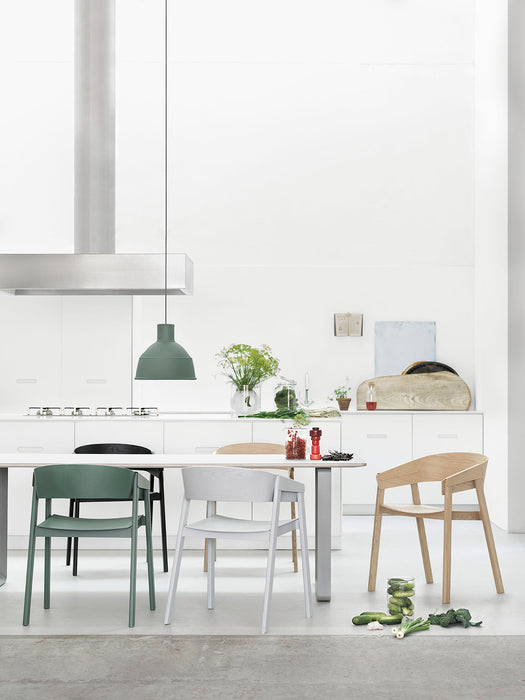

Unfold ceiling lamp
Muuto's Unfold lamp reinterprets the iconic industrial pendant from a contemporary and friendly perspective, combining functionality and visual expressiveness. Made of flexible silicone, its silhouette retains the robust essence of the classic design, but with a softer, more tactile character that brings warmth and a subtle playfulness to the space.
Available in a carefully curated range of vibrant colors or in a translucent version for a more enveloping ambient light, Unfold adapts naturally to a variety of settings: kitchens, dining rooms, workspaces, or contract environments. Its material allows for agile installation and a lightweight presence, making it a versatile option that transforms lighting into a contemporary visual statement.
A lamp that balances shape, texture and color to create atmospheres with personality.
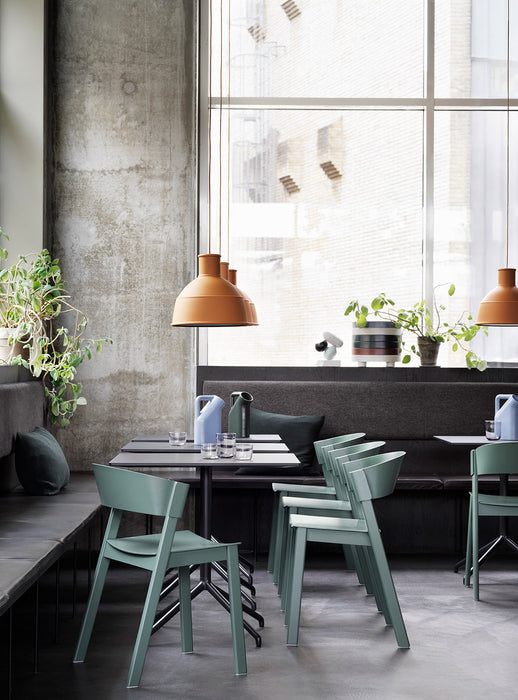

Unfold ceiling lamp
Muuto's Unfold lamp reinterprets the iconic industrial pendant from a contemporary and friendly perspective, combining functionality and visual expressiveness. Made of flexible silicone, its silhouette retains the robust essence of the classic design, but with a softer, more tactile character that brings warmth and a subtle playfulness to the space.
Available in a carefully curated range of vibrant colors or in a translucent version for a more enveloping ambient light, Unfold adapts naturally to a variety of settings: kitchens, dining rooms, workspaces, or contract environments. Its material allows for agile installation and a lightweight presence, making it a versatile option that transforms lighting into a contemporary visual statement.
A lamp that balances shape, texture and color to create atmospheres with personality.
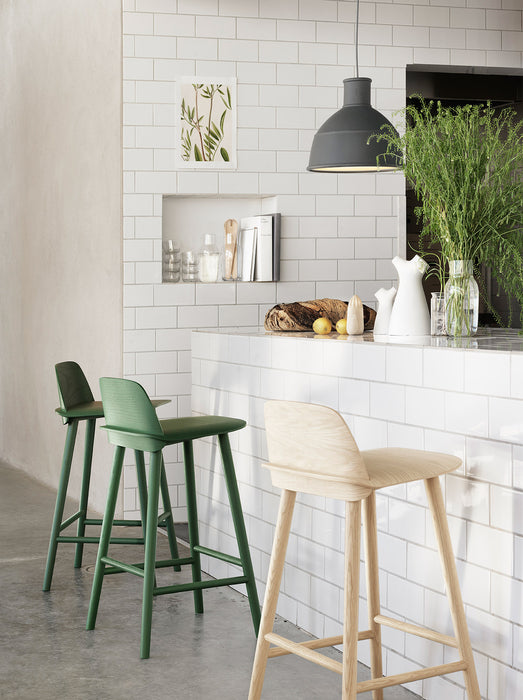

Unfold ceiling lamp
Muuto's Unfold lamp reinterprets the iconic industrial pendant from a contemporary and friendly perspective, combining functionality and visual expressiveness. Made of flexible silicone, its silhouette retains the robust essence of the classic design, but with a softer, more tactile character that brings warmth and a subtle playfulness to the space.
Available in a carefully curated range of vibrant colors or in a translucent version for a more enveloping ambient light, Unfold adapts naturally to a variety of settings: kitchens, dining rooms, workspaces, or contract environments. Its material allows for agile installation and a lightweight presence, making it a versatile option that transforms lighting into a contemporary visual statement.
A lamp that balances shape, texture and color to create atmospheres with personality.
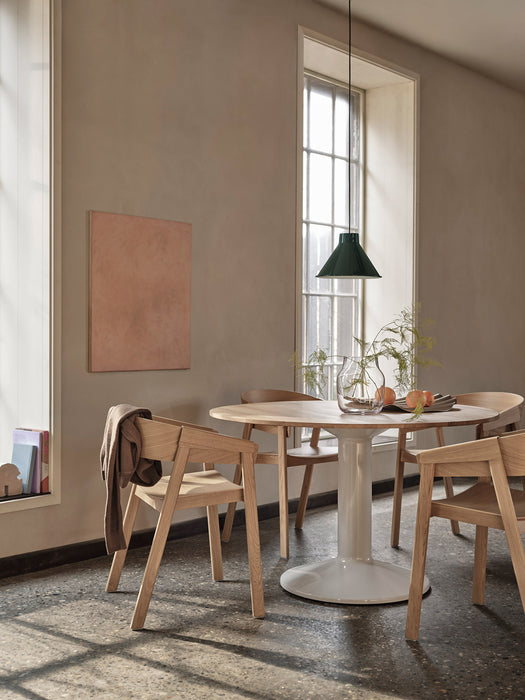

Cover chair with arms
The Muuto Cover chair with arms reinterprets the traditional Scandinavian chair with a contemporary silhouette that combines honest craftsmanship and technical precision. Its curved backrest and folded molded wood armrests delicately surround the frame, creating an enveloping presence and serene comfort. The design, without visible screws, accentuates the visual cleanliness and formal balance of the whole.
Made from molded veneer and a water-based lacquered solid wood base, this version maintains a warm and refined look, perfect for both domestic spaces—living rooms, dining rooms, or bedrooms—and for professional environments, restaurants, or meeting areas. It also boasts EU Ecolabel certification, which guarantees a reduced environmental impact at all stages of its life cycle.
An elegant and versatile piece that embodies the essence of Scandinavian design: refined functionality, honest materiality, and timeless beauty.
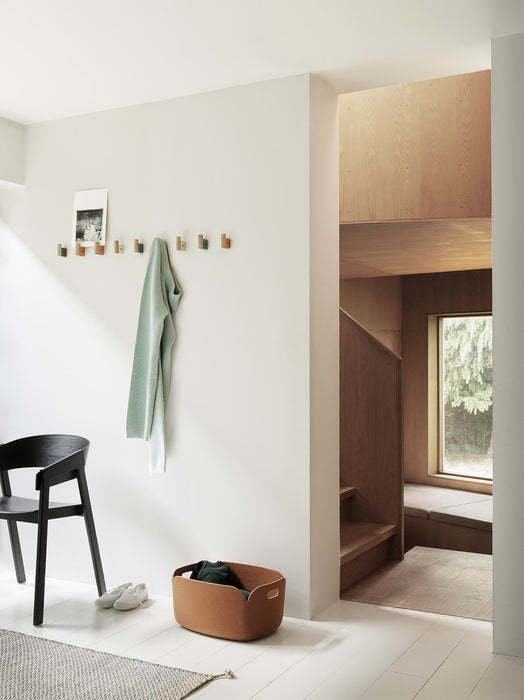

Cover chair with arms
The Muuto Cover chair with arms reinterprets the traditional Scandinavian chair with a contemporary silhouette that combines honest craftsmanship and technical precision. Its curved backrest and folded molded wood armrests delicately surround the frame, creating an enveloping presence and serene comfort. The design, without visible screws, accentuates the visual cleanliness and formal balance of the whole.
Made from molded veneer and a water-based lacquered solid wood base, this version maintains a warm and refined look, perfect for both domestic spaces—living rooms, dining rooms, or bedrooms—and for professional environments, restaurants, or meeting areas. It also boasts EU Ecolabel certification, which guarantees a reduced environmental impact at all stages of its life cycle.
An elegant and versatile piece that embodies the essence of Scandinavian design: refined functionality, honest materiality, and timeless beauty.
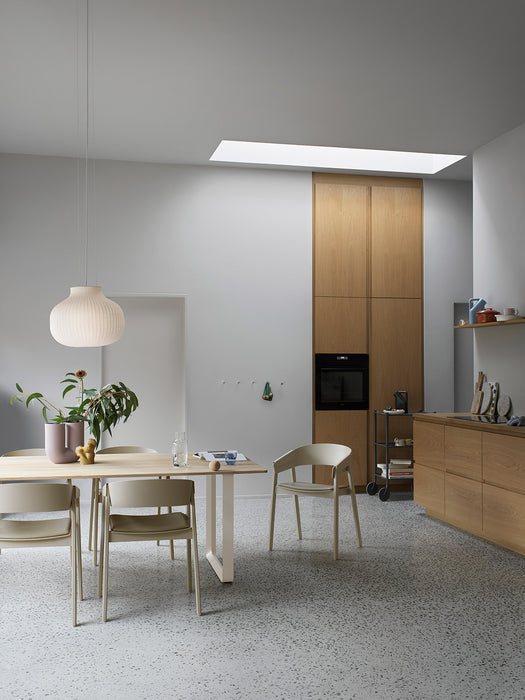

Cover chair with arms
The Muuto Cover chair with arms reinterprets the traditional Scandinavian chair with a contemporary silhouette that combines honest craftsmanship and technical precision. Its curved backrest and folded molded wood armrests delicately surround the frame, creating an enveloping presence and serene comfort. The design, without visible screws, accentuates the visual cleanliness and formal balance of the whole.
Made from molded veneer and a water-based lacquered solid wood base, this version maintains a warm and refined look, perfect for both domestic spaces—living rooms, dining rooms, or bedrooms—and for professional environments, restaurants, or meeting areas. It also boasts EU Ecolabel certification, which guarantees a reduced environmental impact at all stages of its life cycle.
An elegant and versatile piece that embodies the essence of Scandinavian design: refined functionality, honest materiality, and timeless beauty.


Cover chair with arms
The Muuto Cover chair with arms reinterprets the traditional Scandinavian chair with a contemporary silhouette that combines honest craftsmanship and technical precision. Its curved backrest and folded molded wood armrests delicately surround the frame, creating an enveloping presence and serene comfort. The design, without visible screws, accentuates the visual cleanliness and formal balance of the whole.
Made from molded veneer and a water-based lacquered solid wood base, this version maintains a warm and refined look, perfect for both domestic spaces—living rooms, dining rooms, or bedrooms—and for professional environments, restaurants, or meeting areas. It also boasts EU Ecolabel certification, which guarantees a reduced environmental impact at all stages of its life cycle.
An elegant and versatile piece that embodies the essence of Scandinavian design: refined functionality, honest materiality, and timeless beauty.
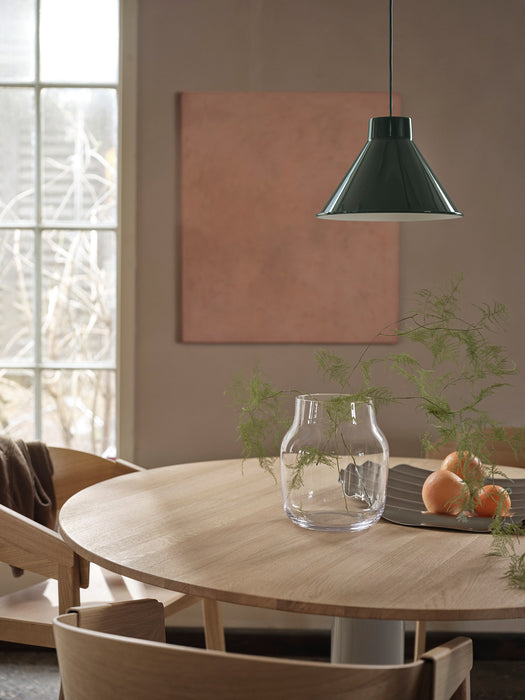

Cover chair with arms
The Muuto Cover chair with arms reinterprets the traditional Scandinavian chair with a contemporary silhouette that combines honest craftsmanship and technical precision. Its curved backrest and folded molded wood armrests delicately surround the frame, creating an enveloping presence and serene comfort. The design, without visible screws, accentuates the visual cleanliness and formal balance of the whole.
Made from molded veneer and a water-based lacquered solid wood base, this version maintains a warm and refined look, perfect for both domestic spaces—living rooms, dining rooms, or bedrooms—and for professional environments, restaurants, or meeting areas. It also boasts EU Ecolabel certification, which guarantees a reduced environmental impact at all stages of its life cycle.
An elegant and versatile piece that embodies the essence of Scandinavian design: refined functionality, honest materiality, and timeless beauty.
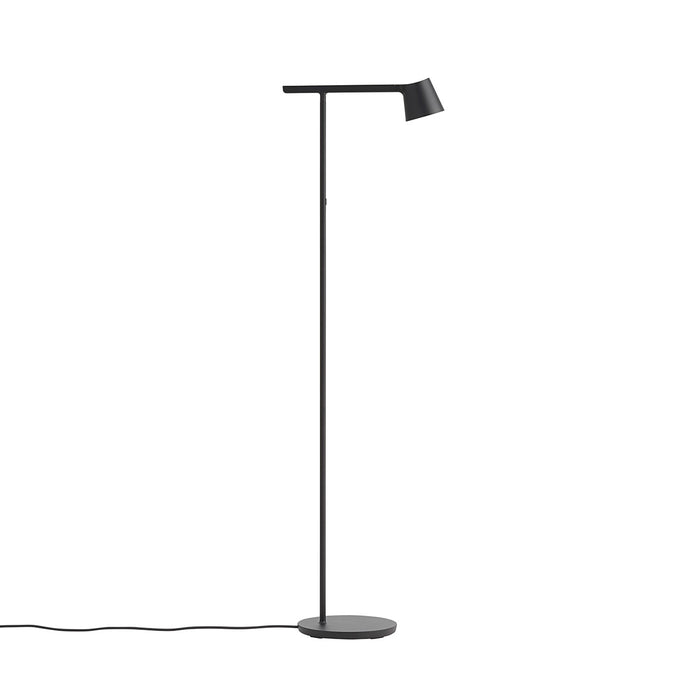

Tip floor lamp
Muuto's Tip floor lamp is based on an exercise in formal refinement: a proposal that reduces design to its essence, balancing functionality, sobriety, and precise attention to the smallest details. Its minimalist aesthetic translates into a discreet yet assertive presence, capable of blending naturally into any space.
With a swivel head and arm, it allows for precise light direction and adapts to different uses: reading, spot lighting, or soft ambient lighting. Equipped with an opal diffuser and dimming function, it offers intuitive control over the volume and quality of light, creating comfortable atmospheres at any time. Its head rotates up to 100 degrees—50 degrees to each side—facilitating quick and practical adjustments.
A piece that combines technical precision, contemporary language, and visual warmth, turning lighting into a functional and aesthetic experience at the same time.
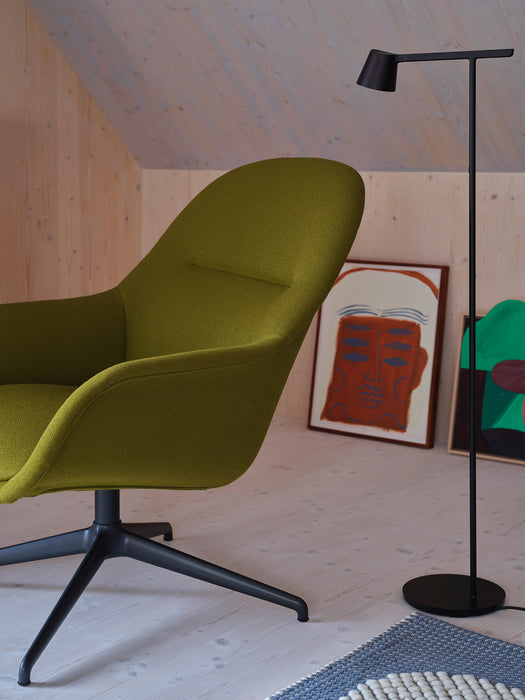

Tip floor lamp
Muuto's Tip floor lamp is based on an exercise in formal refinement: a proposal that reduces design to its essence, balancing functionality, sobriety, and precise attention to the smallest details. Its minimalist aesthetic translates into a discreet yet assertive presence, capable of blending naturally into any space.
With a swivel head and arm, it allows for precise light direction and adapts to different uses: reading, spot lighting, or soft ambient lighting. Equipped with an opal diffuser and dimming function, it offers intuitive control over the volume and quality of light, creating comfortable atmospheres at any time. Its head rotates up to 100 degrees—50 degrees to each side—facilitating quick and practical adjustments.
A piece that combines technical precision, contemporary language, and visual warmth, turning lighting into a functional and aesthetic experience at the same time.
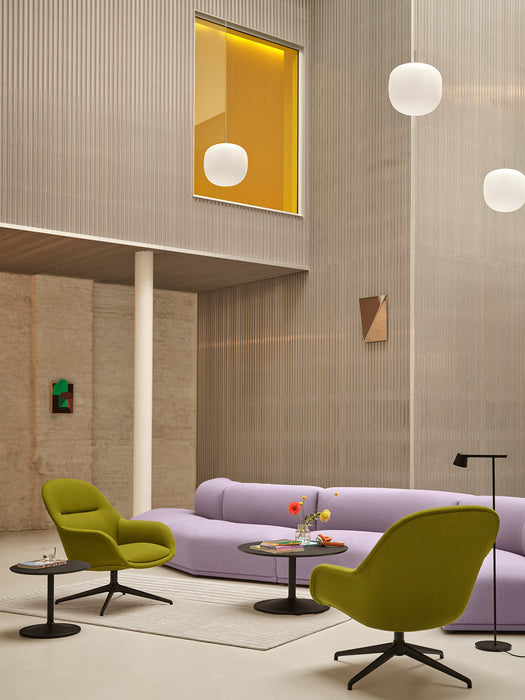

Tip floor lamp
Muuto's Tip floor lamp is based on an exercise in formal refinement: a proposal that reduces design to its essence, balancing functionality, sobriety, and precise attention to the smallest details. Its minimalist aesthetic translates into a discreet yet assertive presence, capable of blending naturally into any space.
With a swivel head and arm, it allows for precise light direction and adapts to different uses: reading, spot lighting, or soft ambient lighting. Equipped with an opal diffuser and dimming function, it offers intuitive control over the volume and quality of light, creating comfortable atmospheres at any time. Its head rotates up to 100 degrees—50 degrees to each side—facilitating quick and practical adjustments.
A piece that combines technical precision, contemporary language, and visual warmth, turning lighting into a functional and aesthetic experience at the same time.
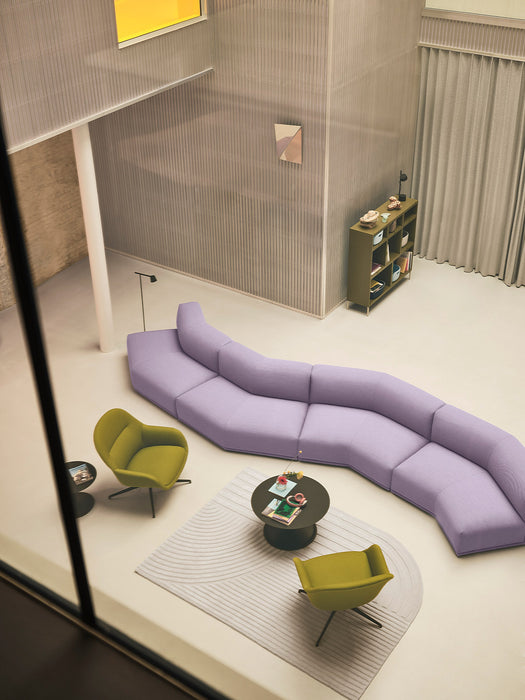

Tip floor lamp
Muuto's Tip floor lamp is based on an exercise in formal refinement: a proposal that reduces design to its essence, balancing functionality, sobriety, and precise attention to the smallest details. Its minimalist aesthetic translates into a discreet yet assertive presence, capable of blending naturally into any space.
With a swivel head and arm, it allows for precise light direction and adapts to different uses: reading, spot lighting, or soft ambient lighting. Equipped with an opal diffuser and dimming function, it offers intuitive control over the volume and quality of light, creating comfortable atmospheres at any time. Its head rotates up to 100 degrees—50 degrees to each side—facilitating quick and practical adjustments.
A piece that combines technical precision, contemporary language, and visual warmth, turning lighting into a functional and aesthetic experience at the same time.
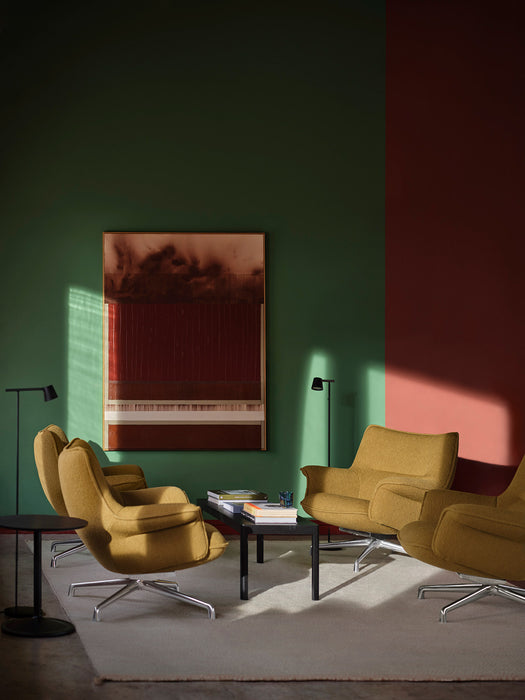

Tip floor lamp
Muuto's Tip floor lamp is based on an exercise in formal refinement: a proposal that reduces design to its essence, balancing functionality, sobriety, and precise attention to the smallest details. Its minimalist aesthetic translates into a discreet yet assertive presence, capable of blending naturally into any space.
With a swivel head and arm, it allows for precise light direction and adapts to different uses: reading, spot lighting, or soft ambient lighting. Equipped with an opal diffuser and dimming function, it offers intuitive control over the volume and quality of light, creating comfortable atmospheres at any time. Its head rotates up to 100 degrees—50 degrees to each side—facilitating quick and practical adjustments.
A piece that combines technical precision, contemporary language, and visual warmth, turning lighting into a functional and aesthetic experience at the same time.
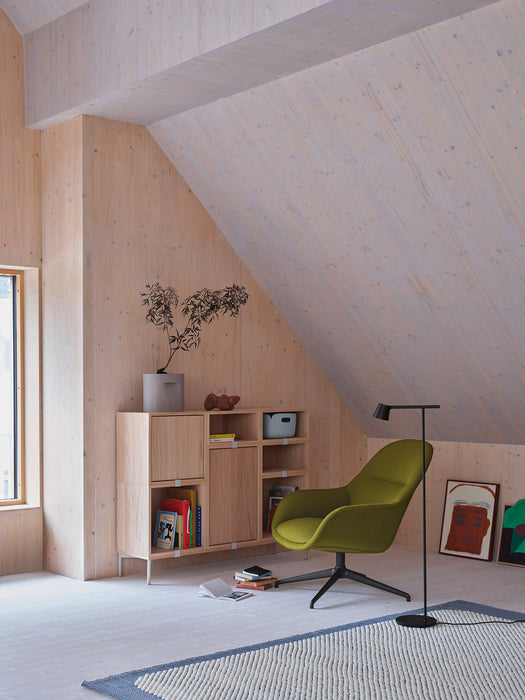

Tip floor lamp
Muuto's Tip floor lamp is based on an exercise in formal refinement: a proposal that reduces design to its essence, balancing functionality, sobriety, and precise attention to the smallest details. Its minimalist aesthetic translates into a discreet yet assertive presence, capable of blending naturally into any space.
With a swivel head and arm, it allows for precise light direction and adapts to different uses: reading, spot lighting, or soft ambient lighting. Equipped with an opal diffuser and dimming function, it offers intuitive control over the volume and quality of light, creating comfortable atmospheres at any time. Its head rotates up to 100 degrees—50 degrees to each side—facilitating quick and practical adjustments.
A piece that combines technical precision, contemporary language, and visual warmth, turning lighting into a functional and aesthetic experience at the same time.
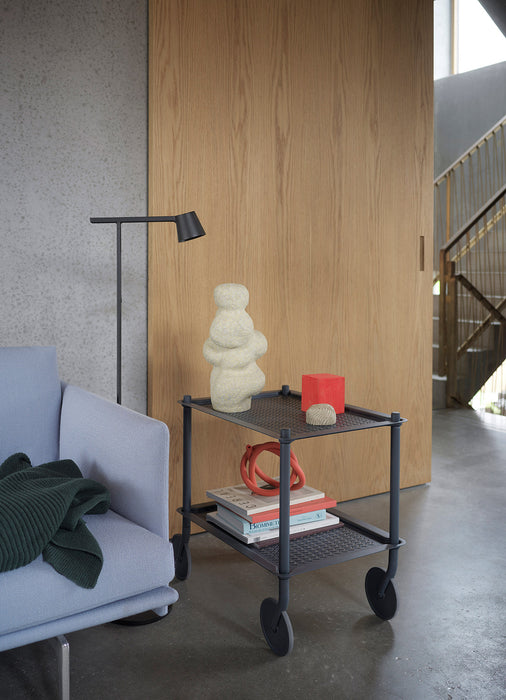

Tip floor lamp
Muuto's Tip floor lamp is based on an exercise in formal refinement: a proposal that reduces design to its essence, balancing functionality, sobriety, and precise attention to the smallest details. Its minimalist aesthetic translates into a discreet yet assertive presence, capable of blending naturally into any space.
With a swivel head and arm, it allows for precise light direction and adapts to different uses: reading, spot lighting, or soft ambient lighting. Equipped with an opal diffuser and dimming function, it offers intuitive control over the volume and quality of light, creating comfortable atmospheres at any time. Its head rotates up to 100 degrees—50 degrees to each side—facilitating quick and practical adjustments.
A piece that combines technical precision, contemporary language, and visual warmth, turning lighting into a functional and aesthetic experience at the same time.
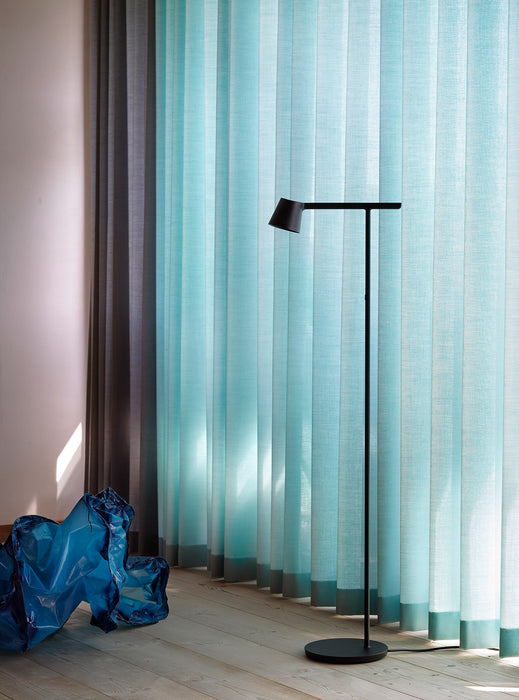

Tip floor lamp
Muuto's Tip floor lamp is based on an exercise in formal refinement: a proposal that reduces design to its essence, balancing functionality, sobriety, and precise attention to the smallest details. Its minimalist aesthetic translates into a discreet yet assertive presence, capable of blending naturally into any space.
With a swivel head and arm, it allows for precise light direction and adapts to different uses: reading, spot lighting, or soft ambient lighting. Equipped with an opal diffuser and dimming function, it offers intuitive control over the volume and quality of light, creating comfortable atmospheres at any time. Its head rotates up to 100 degrees—50 degrees to each side—facilitating quick and practical adjustments.
A piece that combines technical precision, contemporary language, and visual warmth, turning lighting into a functional and aesthetic experience at the same time.
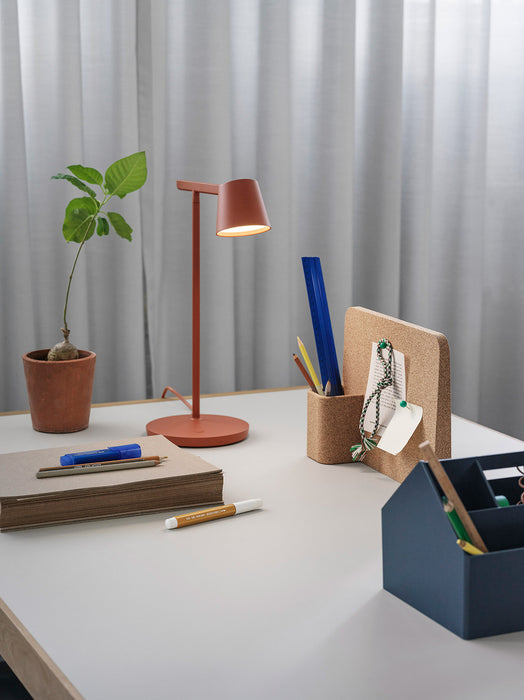

Tip table lamp
Muuto's Tip lamp was born from a desire to reduce design to its essence, offering a functional and understated design with meticulous attention to detail. Its clean, contemporary silhouette is complemented by a swivel head and arm that allow the light to be directed precisely, adapting to different needs and times of day.
Thanks to its opal diffuser and dimmable function, the Tip Table Lamp provides both direct and ambient light, creating balanced atmospheres in home or business settings. Its head can rotate up to 100 degrees—50 degrees to each side—allowing for easy angle adjustment.
A piece that combines technical precision and aesthetic sensitivity to integrate light into everyday life with naturalness and elegance.
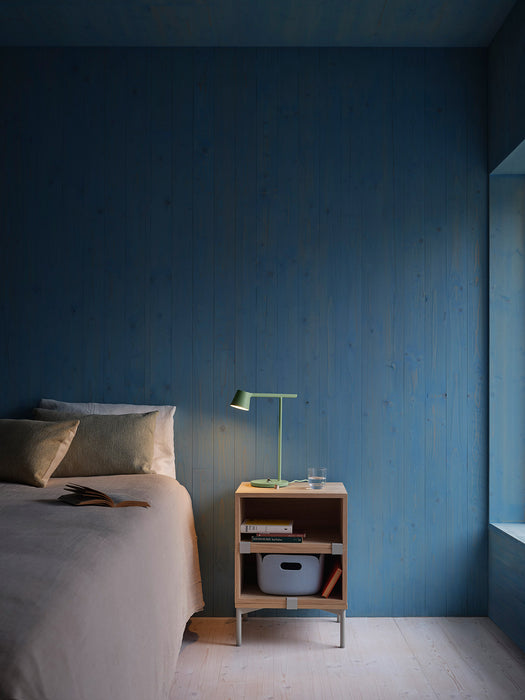

Tip table lamp
Muuto's Tip lamp was born from a desire to reduce design to its essence, offering a functional and understated design with meticulous attention to detail. Its clean, contemporary silhouette is complemented by a swivel head and arm that allow the light to be directed precisely, adapting to different needs and times of day.
Thanks to its opal diffuser and dimmable function, the Tip Table Lamp provides both direct and ambient light, creating balanced atmospheres in home or business settings. Its head can rotate up to 100 degrees—50 degrees to each side—allowing for easy angle adjustment.
A piece that combines technical precision and aesthetic sensitivity to integrate light into everyday life with naturalness and elegance.
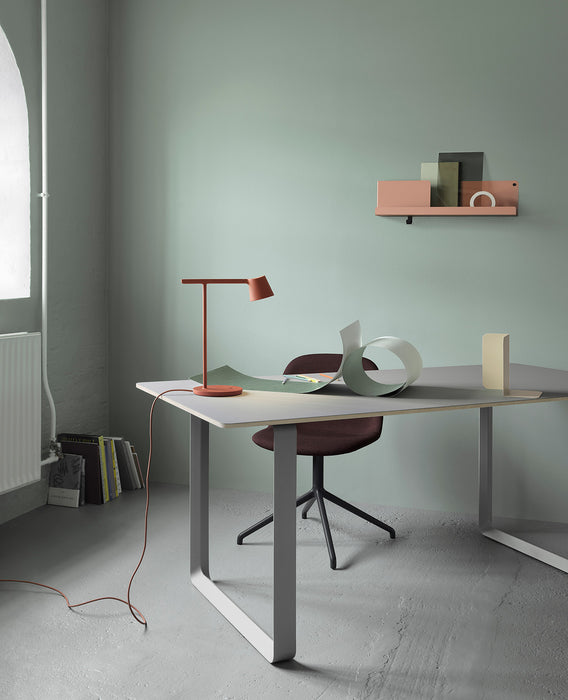

Tip table lamp
Muuto's Tip lamp was born from a desire to reduce design to its essence, offering a functional and understated design with meticulous attention to detail. Its clean, contemporary silhouette is complemented by a swivel head and arm that allow the light to be directed precisely, adapting to different needs and times of day.
Thanks to its opal diffuser and dimmable function, the Tip Table Lamp provides both direct and ambient light, creating balanced atmospheres in home or business settings. Its head can rotate up to 100 degrees—50 degrees to each side—allowing for easy angle adjustment.
A piece that combines technical precision and aesthetic sensitivity to integrate light into everyday life with naturalness and elegance.
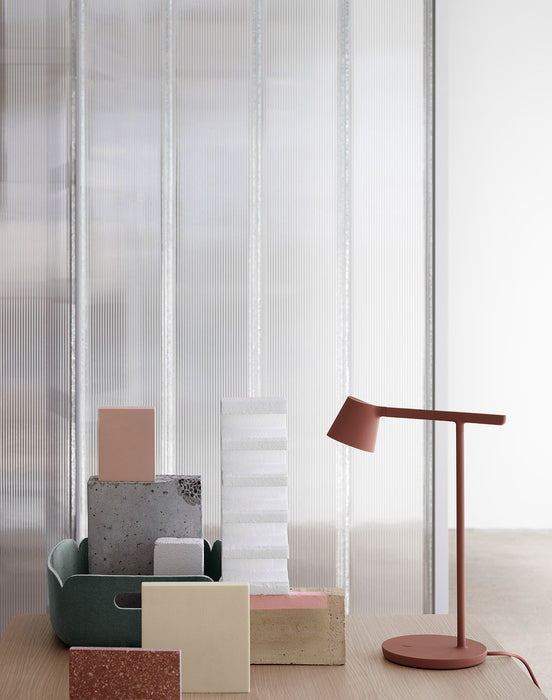

Tip table lamp
Muuto's Tip lamp was born from a desire to reduce design to its essence, offering a functional and understated design with meticulous attention to detail. Its clean, contemporary silhouette is complemented by a swivel head and arm that allow the light to be directed precisely, adapting to different needs and times of day.
Thanks to its opal diffuser and dimmable function, the Tip Table Lamp provides both direct and ambient light, creating balanced atmospheres in home or business settings. Its head can rotate up to 100 degrees—50 degrees to each side—allowing for easy angle adjustment.
A piece that combines technical precision and aesthetic sensitivity to integrate light into everyday life with naturalness and elegance.
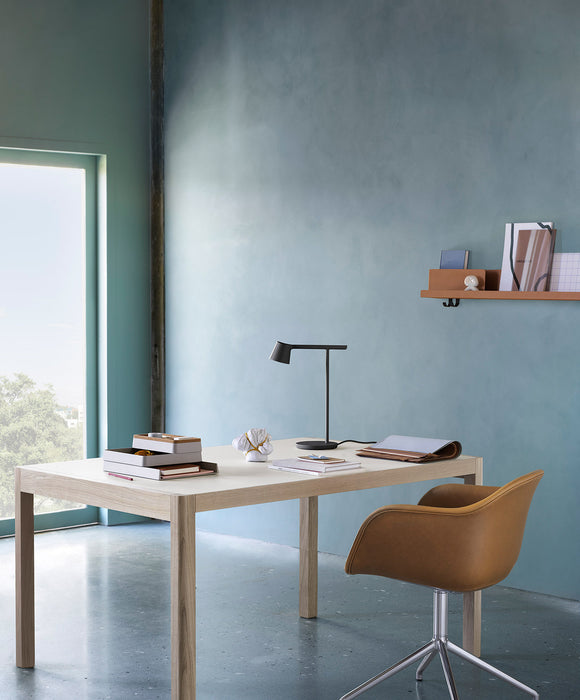

Tip table lamp
Muuto's Tip lamp was born from a desire to reduce design to its essence, offering a functional and understated design with meticulous attention to detail. Its clean, contemporary silhouette is complemented by a swivel head and arm that allow the light to be directed precisely, adapting to different needs and times of day.
Thanks to its opal diffuser and dimmable function, the Tip Table Lamp provides both direct and ambient light, creating balanced atmospheres in home or business settings. Its head can rotate up to 100 degrees—50 degrees to each side—allowing for easy angle adjustment.
A piece that combines technical precision and aesthetic sensitivity to integrate light into everyday life with naturalness and elegance.
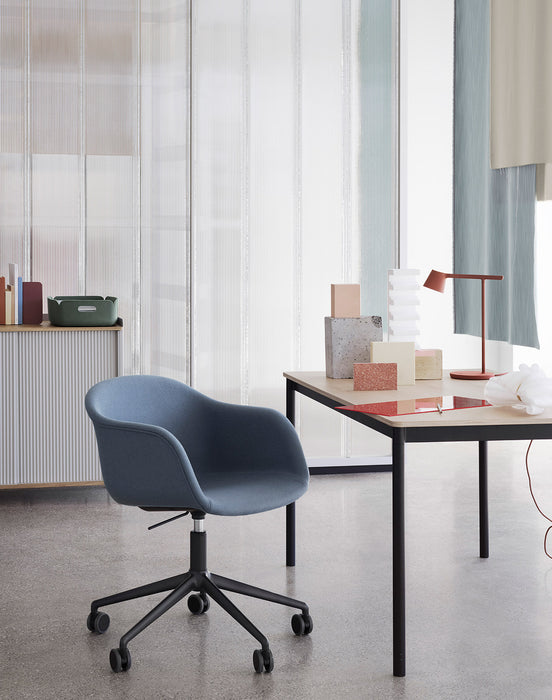

Tip table lamp
Muuto's Tip lamp was born from a desire to reduce design to its essence, offering a functional and understated design with meticulous attention to detail. Its clean, contemporary silhouette is complemented by a swivel head and arm that allow the light to be directed precisely, adapting to different needs and times of day.
Thanks to its opal diffuser and dimmable function, the Tip Table Lamp provides both direct and ambient light, creating balanced atmospheres in home or business settings. Its head can rotate up to 100 degrees—50 degrees to each side—allowing for easy angle adjustment.
A piece that combines technical precision and aesthetic sensitivity to integrate light into everyday life with naturalness and elegance.
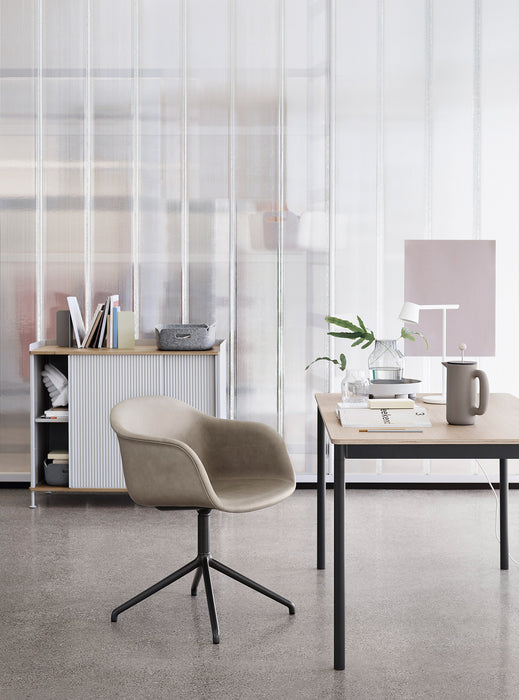

Tip table lamp
Muuto's Tip lamp was born from a desire to reduce design to its essence, offering a functional and understated design with meticulous attention to detail. Its clean, contemporary silhouette is complemented by a swivel head and arm that allow the light to be directed precisely, adapting to different needs and times of day.
Thanks to its opal diffuser and dimmable function, the Tip Table Lamp provides both direct and ambient light, creating balanced atmospheres in home or business settings. Its head can rotate up to 100 degrees—50 degrees to each side—allowing for easy angle adjustment.
A piece that combines technical precision and aesthetic sensitivity to integrate light into everyday life with naturalness and elegance.
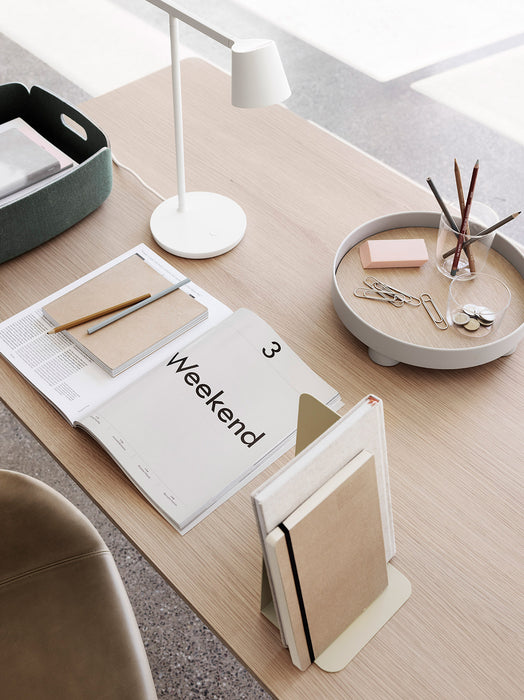

Tip table lamp
Muuto's Tip lamp was born from a desire to reduce design to its essence, offering a functional and understated design with meticulous attention to detail. Its clean, contemporary silhouette is complemented by a swivel head and arm that allow the light to be directed precisely, adapting to different needs and times of day.
Thanks to its opal diffuser and dimmable function, the Tip Table Lamp provides both direct and ambient light, creating balanced atmospheres in home or business settings. Its head can rotate up to 100 degrees—50 degrees to each side—allowing for easy angle adjustment.
A piece that combines technical precision and aesthetic sensitivity to integrate light into everyday life with naturalness and elegance.
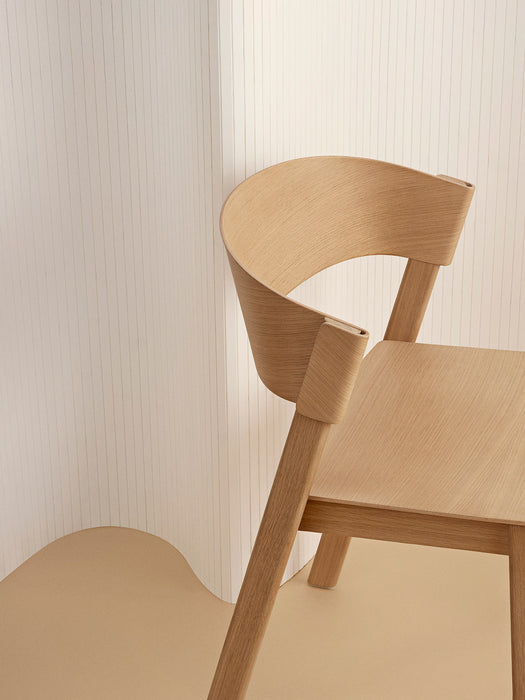

Chair Cover
Muuto's Cover chair reinterprets the classic wooden chair from a contemporary perspective, with an elegant silhouette that combines Scandinavian craftsmanship and technically refined design. Its curved backrest gently folds around the rear legs, a structural gesture that visually unites the whole and gives it a distinctive character.
Made of molded veneer and a water-based lacquered solid wood base, this armless version offers a simple and lightweight look, without sacrificing comfort and solidity. Its stackable design optimizes space in both domestic and professional settings and is EU Ecolabel certified, guaranteeing a reduced environmental impact throughout its entire life cycle, from raw materials to recycling.
A timeless and versatile chair that balances form, functionality, and sustainability with the naturalness of Scandinavian design.
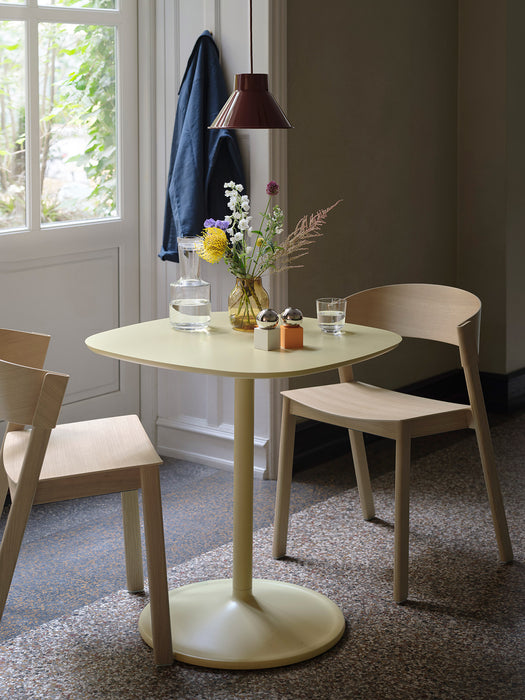

Chair Cover
Muuto's Cover chair reinterprets the classic wooden chair from a contemporary perspective, with an elegant silhouette that combines Scandinavian craftsmanship and technically refined design. Its curved backrest gently folds around the rear legs, a structural gesture that visually unites the whole and gives it a distinctive character.
Made of molded veneer and a water-based lacquered solid wood base, this armless version offers a simple and lightweight look, without sacrificing comfort and solidity. Its stackable design optimizes space in both domestic and professional settings and is EU Ecolabel certified, guaranteeing a reduced environmental impact throughout its entire life cycle, from raw materials to recycling.
A timeless and versatile chair that balances form, functionality, and sustainability with the naturalness of Scandinavian design.
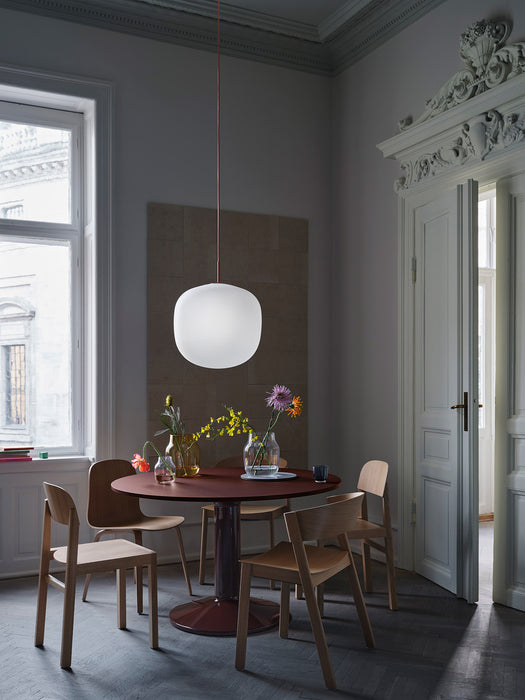

Chair Cover
Muuto's Cover chair reinterprets the classic wooden chair from a contemporary perspective, with an elegant silhouette that combines Scandinavian craftsmanship and technically refined design. Its curved backrest gently folds around the rear legs, a structural gesture that visually unites the whole and gives it a distinctive character.
Made of molded veneer and a water-based lacquered solid wood base, this armless version offers a simple and lightweight look, without sacrificing comfort and solidity. Its stackable design optimizes space in both domestic and professional settings and is EU Ecolabel certified, guaranteeing a reduced environmental impact throughout its entire life cycle, from raw materials to recycling.
A timeless and versatile chair that balances form, functionality, and sustainability with the naturalness of Scandinavian design.
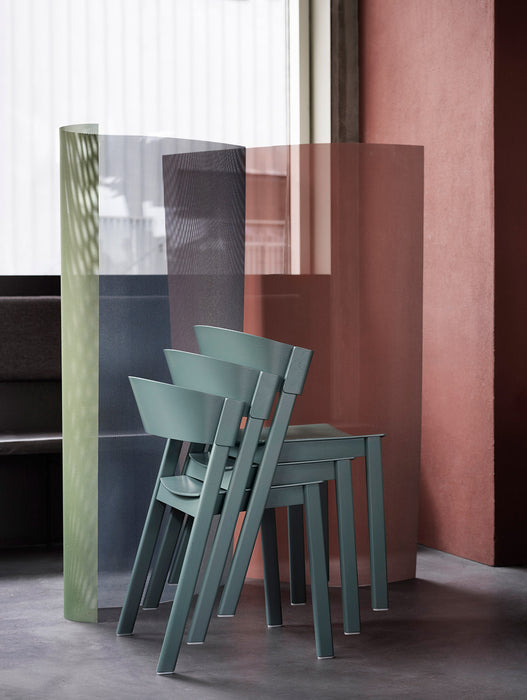

Chair Cover
Muuto's Cover chair reinterprets the classic wooden chair from a contemporary perspective, with an elegant silhouette that combines Scandinavian craftsmanship and technically refined design. Its curved backrest gently folds around the rear legs, a structural gesture that visually unites the whole and gives it a distinctive character.
Made of molded veneer and a water-based lacquered solid wood base, this armless version offers a simple and lightweight look, without sacrificing comfort and solidity. Its stackable design optimizes space in both domestic and professional settings and is EU Ecolabel certified, guaranteeing a reduced environmental impact throughout its entire life cycle, from raw materials to recycling.
A timeless and versatile chair that balances form, functionality, and sustainability with the naturalness of Scandinavian design.
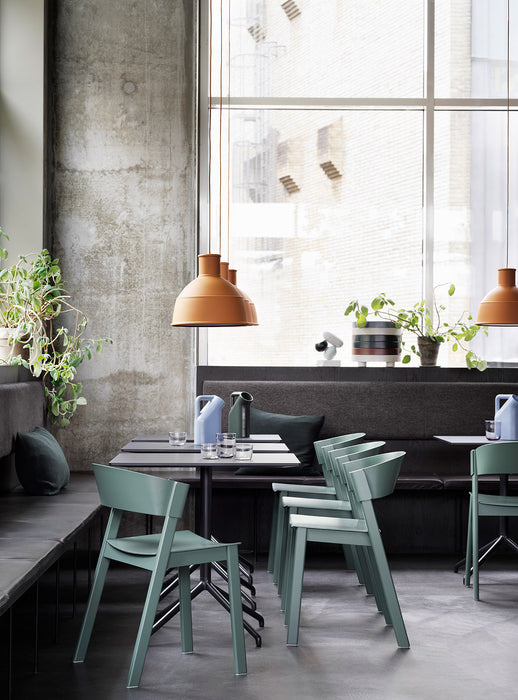

Chair Cover
Muuto's Cover chair reinterprets the classic wooden chair from a contemporary perspective, with an elegant silhouette that combines Scandinavian craftsmanship and technically refined design. Its curved backrest gently folds around the rear legs, a structural gesture that visually unites the whole and gives it a distinctive character.
Made of molded veneer and a water-based lacquered solid wood base, this armless version offers a simple and lightweight look, without sacrificing comfort and solidity. Its stackable design optimizes space in both domestic and professional settings and is EU Ecolabel certified, guaranteeing a reduced environmental impact throughout its entire life cycle, from raw materials to recycling.
A timeless and versatile chair that balances form, functionality, and sustainability with the naturalness of Scandinavian design.
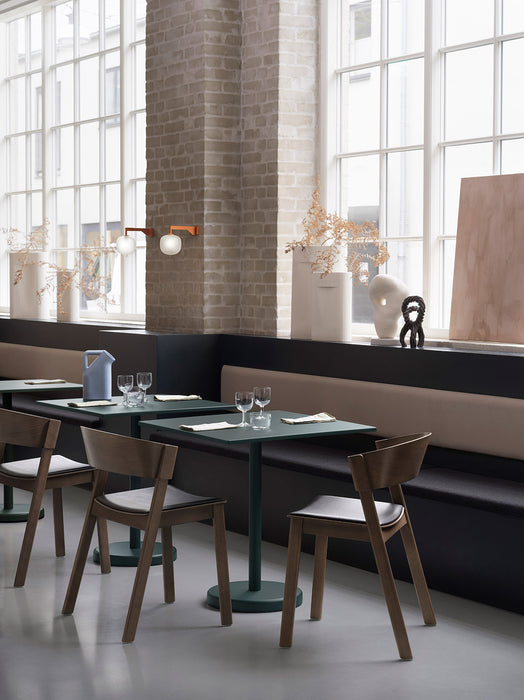

Chair Cover
Muuto's Cover chair reinterprets the classic wooden chair from a contemporary perspective, with an elegant silhouette that combines Scandinavian craftsmanship and technically refined design. Its curved backrest gently folds around the rear legs, a structural gesture that visually unites the whole and gives it a distinctive character.
Made of molded veneer and a water-based lacquered solid wood base, this armless version offers a simple and lightweight look, without sacrificing comfort and solidity. Its stackable design optimizes space in both domestic and professional settings and is EU Ecolabel certified, guaranteeing a reduced environmental impact throughout its entire life cycle, from raw materials to recycling.
A timeless and versatile chair that balances form, functionality, and sustainability with the naturalness of Scandinavian design.
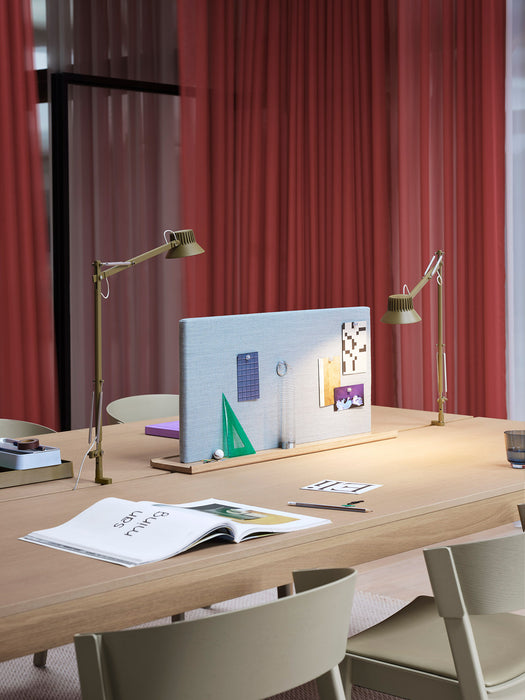

Chair Cover
Muuto's Cover chair reinterprets the classic wooden chair from a contemporary perspective, with an elegant silhouette that combines Scandinavian craftsmanship and technically refined design. Its curved backrest gently folds around the rear legs, a structural gesture that visually unites the whole and gives it a distinctive character.
Made of molded veneer and a water-based lacquered solid wood base, this armless version offers a simple and lightweight look, without sacrificing comfort and solidity. Its stackable design optimizes space in both domestic and professional settings and is EU Ecolabel certified, guaranteeing a reduced environmental impact throughout its entire life cycle, from raw materials to recycling.
A timeless and versatile chair that balances form, functionality, and sustainability with the naturalness of Scandinavian design.
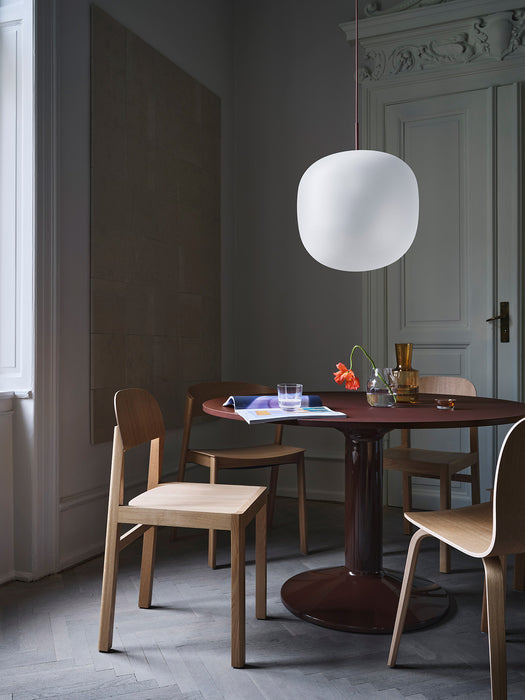

Chair Cover
Muuto's Cover chair reinterprets the classic wooden chair from a contemporary perspective, with an elegant silhouette that combines Scandinavian craftsmanship and technically refined design. Its curved backrest gently folds around the rear legs, a structural gesture that visually unites the whole and gives it a distinctive character.
Made of molded veneer and a water-based lacquered solid wood base, this armless version offers a simple and lightweight look, without sacrificing comfort and solidity. Its stackable design optimizes space in both domestic and professional settings and is EU Ecolabel certified, guaranteeing a reduced environmental impact throughout its entire life cycle, from raw materials to recycling.
A timeless and versatile chair that balances form, functionality, and sustainability with the naturalness of Scandinavian design.
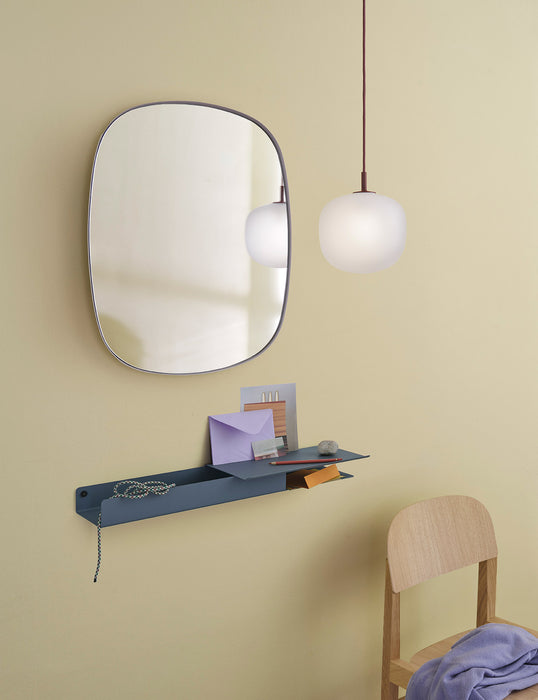

Folded Shelf
Muuto's Folded shelf offers a practical and visually lightweight solution for organizing and displaying objects with a contemporary touch. Inspired by the appearance of folded paper, its minimalist design is made of metal, providing solidity without compromising on elegance.
Its clean, continuous surface makes it a versatile display for decorative pieces, books, or everyday objects, adapting naturally to different environments, from homes to workspaces. It includes two hooks and screws for wall mounting, facilitating a functional and aesthetic installation.
A discreet and sophisticated piece that elevates everyday storage through the language of design.
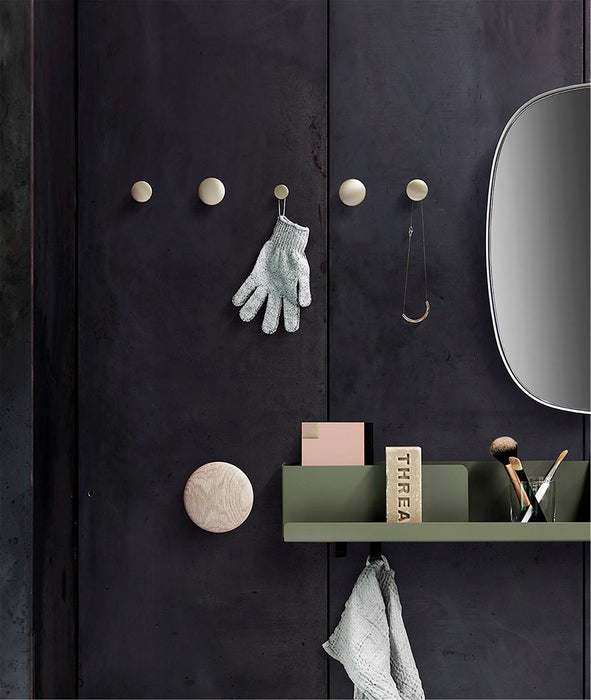

Folded Shelf
Muuto's Folded shelf offers a practical and visually lightweight solution for organizing and displaying objects with a contemporary touch. Inspired by the appearance of folded paper, its minimalist design is made of metal, providing solidity without compromising on elegance.
Its clean, continuous surface makes it a versatile display for decorative pieces, books, or everyday objects, adapting naturally to different environments, from homes to workspaces. It includes two hooks and screws for wall mounting, facilitating a functional and aesthetic installation.
A discreet and sophisticated piece that elevates everyday storage through the language of design.
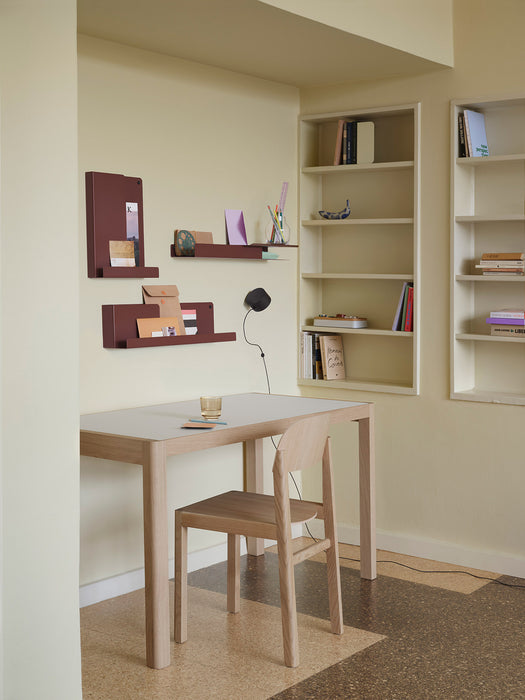

Folded Shelf
Muuto's Folded shelf offers a practical and visually lightweight solution for organizing and displaying objects with a contemporary touch. Inspired by the appearance of folded paper, its minimalist design is made of metal, providing solidity without compromising on elegance.
Its clean, continuous surface makes it a versatile display for decorative pieces, books, or everyday objects, adapting naturally to different environments, from homes to workspaces. It includes two hooks and screws for wall mounting, facilitating a functional and aesthetic installation.
A discreet and sophisticated piece that elevates everyday storage through the language of design.
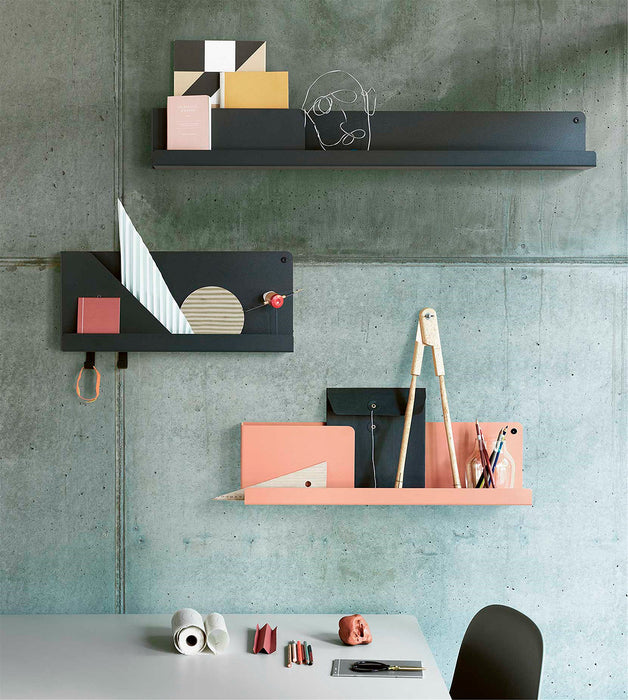

Folded Shelving
Muuto's Folded shelving unit combines contemporary functionality with a visually lightweight design reminiscent of folded paper, yet is made entirely of metal. Its geometric shape and clean profile create a subtle sculptural effect, bringing order and character to any wall while maintaining a sense of lightness.
Designed as a practical and decorative solution, it includes two hooks and mounting screws that allow it to be easily integrated into domestic or professional spaces. Its seemingly simple structure incorporates folds that delineate visual compartments and offer a versatile support for books, decorative objects, or everyday utensils.
A functional and expressive piece that transforms storage into a design statement.
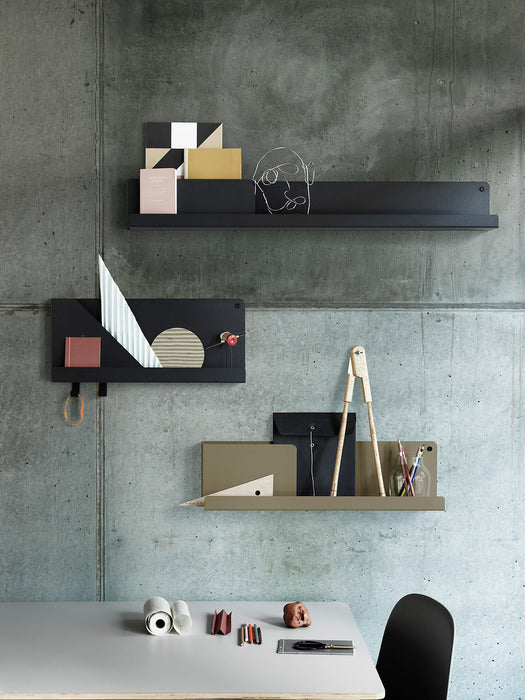

Folded Shelving
Muuto's Folded shelving unit combines contemporary functionality with a visually lightweight design reminiscent of folded paper, yet is made entirely of metal. Its geometric shape and clean profile create a subtle sculptural effect, bringing order and character to any wall while maintaining a sense of lightness.
Designed as a practical and decorative solution, it includes two hooks and mounting screws that allow it to be easily integrated into domestic or professional spaces. Its seemingly simple structure incorporates folds that delineate visual compartments and offer a versatile support for books, decorative objects, or everyday utensils.
A functional and expressive piece that transforms storage into a design statement.
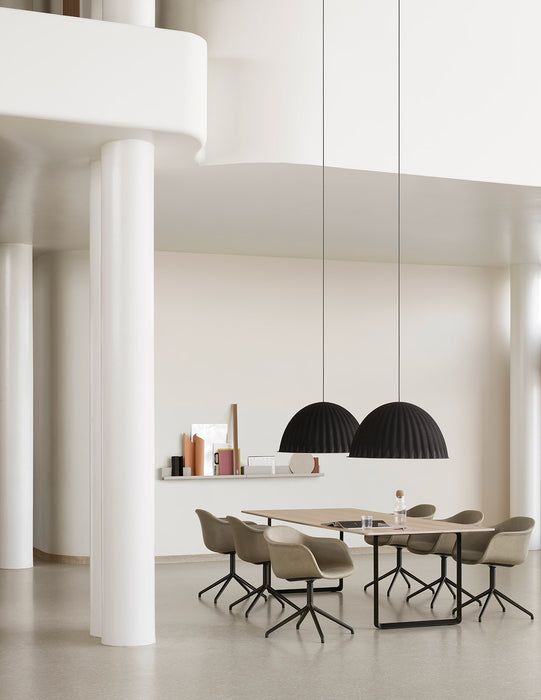

Folded Shelving
Muuto's Folded shelving unit combines contemporary functionality with a visually lightweight design reminiscent of folded paper, yet is made entirely of metal. Its geometric shape and clean profile create a subtle sculptural effect, bringing order and character to any wall while maintaining a sense of lightness.
Designed as a practical and decorative solution, it includes two hooks and mounting screws that allow it to be easily integrated into domestic or professional spaces. Its seemingly simple structure incorporates folds that delineate visual compartments and offer a versatile support for books, decorative objects, or everyday utensils.
A functional and expressive piece that transforms storage into a design statement.
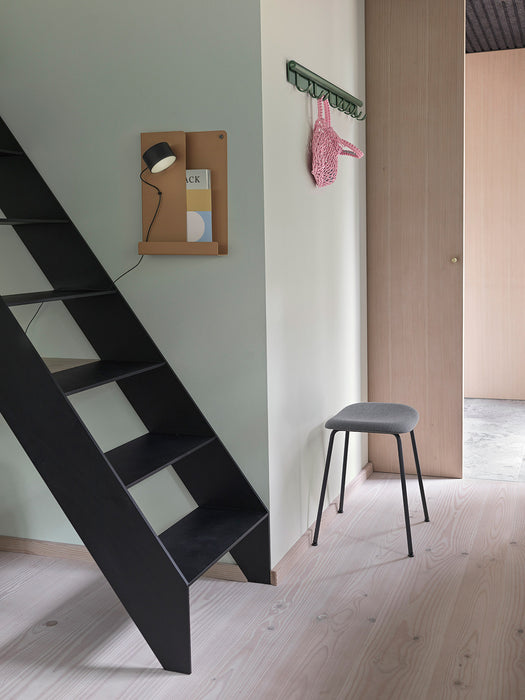

Folded Shelving
Muuto's Folded shelving unit combines contemporary functionality with a visually lightweight design reminiscent of folded paper, yet is made entirely of metal. Its geometric shape and clean profile create a subtle sculptural effect, bringing order and character to any wall while maintaining a sense of lightness.
Designed as a practical and decorative solution, it includes two hooks and mounting screws that allow it to be easily integrated into domestic or professional spaces. Its seemingly simple structure incorporates folds that delineate visual compartments and offer a versatile support for books, decorative objects, or everyday utensils.
A functional and expressive piece that transforms storage into a design statement.
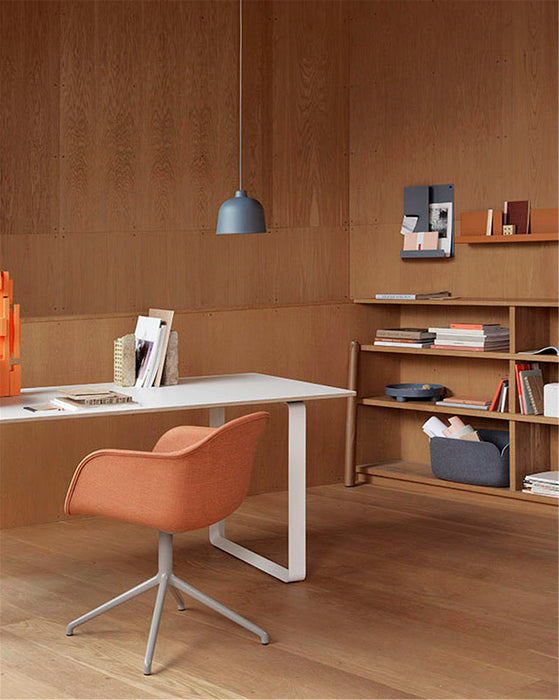

Folded Shelving
Muuto's Folded shelving unit combines contemporary functionality with a visually lightweight design reminiscent of folded paper, yet is made entirely of metal. Its geometric shape and clean profile create a subtle sculptural effect, bringing order and character to any wall while maintaining a sense of lightness.
Designed as a practical and decorative solution, it includes two hooks and mounting screws that allow it to be easily integrated into domestic or professional spaces. Its seemingly simple structure incorporates folds that delineate visual compartments and offer a versatile support for books, decorative objects, or everyday utensils.
A functional and expressive piece that transforms storage into a design statement.
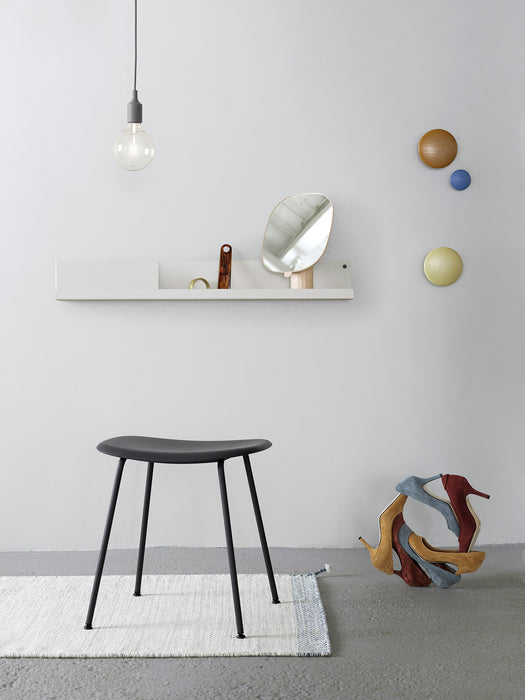

Folded Shelving
Muuto's Folded shelving unit combines contemporary functionality with a visually lightweight design reminiscent of folded paper, yet is made entirely of metal. Its geometric shape and clean profile create a subtle sculptural effect, bringing order and character to any wall while maintaining a sense of lightness.
Designed as a practical and decorative solution, it includes two hooks and mounting screws that allow it to be easily integrated into domestic or professional spaces. Its seemingly simple structure incorporates folds that delineate visual compartments and offer a versatile support for books, decorative objects, or everyday utensils.
A functional and expressive piece that transforms storage into a design statement.
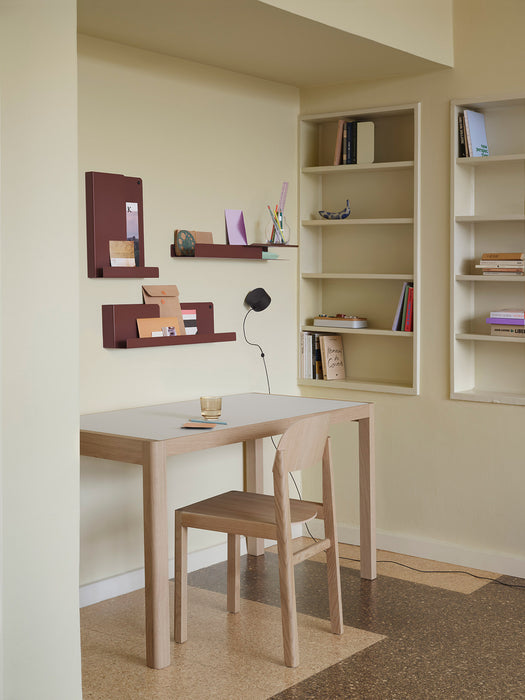

Folded Shelving
Muuto's Folded shelving unit combines contemporary functionality with a visually lightweight design reminiscent of folded paper, yet is made entirely of metal. Its geometric shape and clean profile create a subtle sculptural effect, bringing order and character to any wall while maintaining a sense of lightness.
Designed as a practical and decorative solution, it includes two hooks and mounting screws that allow it to be easily integrated into domestic or professional spaces. Its seemingly simple structure incorporates folds that delineate visual compartments and offer a versatile support for books, decorative objects, or everyday utensils.
A functional and expressive piece that transforms storage into a design statement.
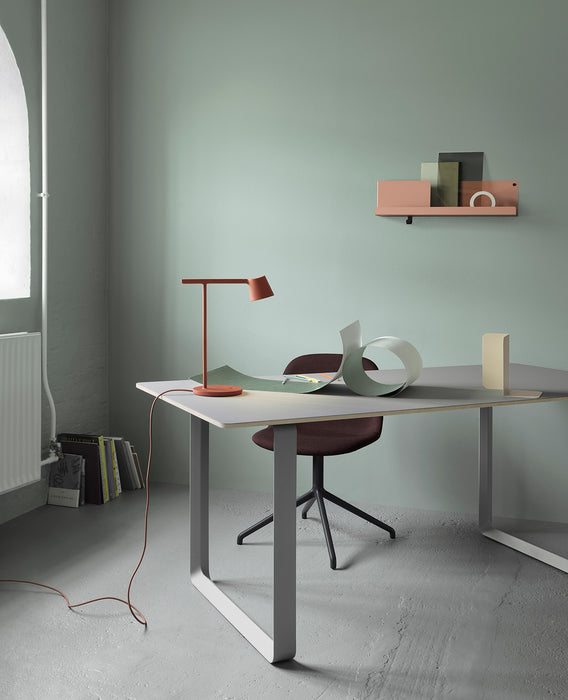

Folded Shelving
Muuto's Folded shelving unit combines contemporary functionality with a visually lightweight design reminiscent of folded paper, yet is made entirely of metal. Its geometric shape and clean profile create a subtle sculptural effect, bringing order and character to any wall while maintaining a sense of lightness.
Designed as a practical and decorative solution, it includes two hooks and mounting screws that allow it to be easily integrated into domestic or professional spaces. Its seemingly simple structure incorporates folds that delineate visual compartments and offer a versatile support for books, decorative objects, or everyday utensils.
A functional and expressive piece that transforms storage into a design statement.
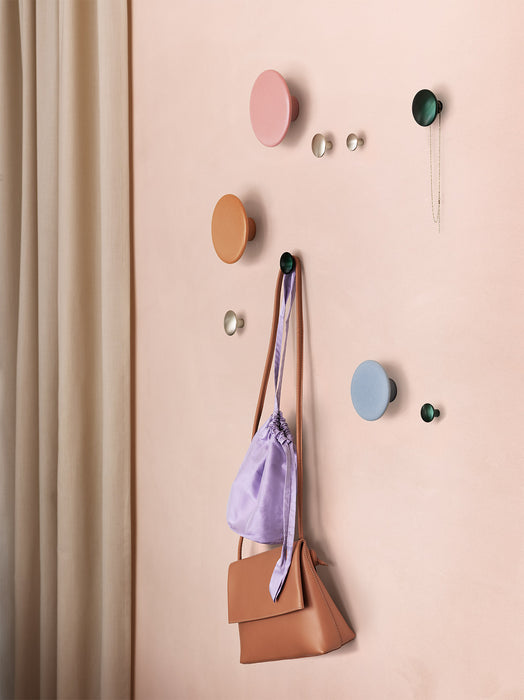

The Dots Ceramic Coat Rack
The Dots Ceramic coat racks bring an artistic and expressive dimension to this iconic Muuto series, reinterpreting the classic wall hook through glazed ceramic with a reactive finish. Each piece features unique nuances on its surface, the result of a handcrafted process that reinforces the individual character of each hook and celebrates the beauty of imperfection.
Made from high-quality earthenware, The Dots Ceramic offer a sophisticated visual presence that transcends functionality, adding texture, depth, and a subtle interplay of reflections to the ensemble. Their sculptural form allows for the creation of customized compositions, combining different sizes and colors, and interacting with the wood or metal versions to create versatile murals with their own unique character.
Ideal for entryways, bedrooms, kitchens, or work areas, Dots Ceramic are much more than a hook: they are a decorative gesture that transforms the wall into a dynamic and living surface.
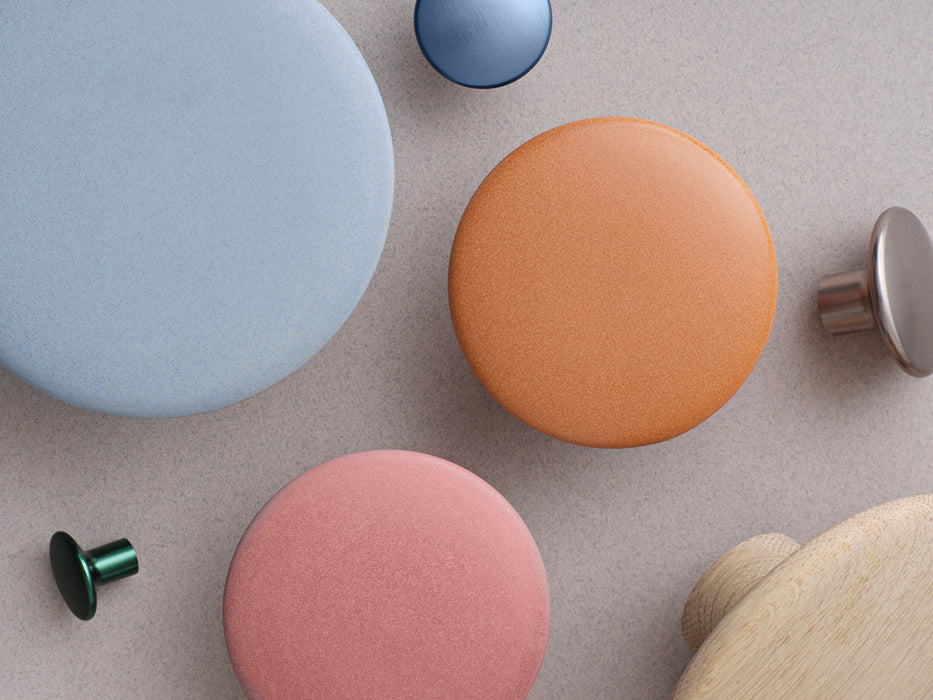

The Dots Ceramic Coat Rack
The Dots Ceramic coat racks bring an artistic and expressive dimension to this iconic Muuto series, reinterpreting the classic wall hook through glazed ceramic with a reactive finish. Each piece features unique nuances on its surface, the result of a handcrafted process that reinforces the individual character of each hook and celebrates the beauty of imperfection.
Made from high-quality earthenware, The Dots Ceramic offer a sophisticated visual presence that transcends functionality, adding texture, depth, and a subtle interplay of reflections to the ensemble. Their sculptural form allows for the creation of customized compositions, combining different sizes and colors, and interacting with the wood or metal versions to create versatile murals with their own unique character.
Ideal for entryways, bedrooms, kitchens, or work areas, Dots Ceramic are much more than a hook: they are a decorative gesture that transforms the wall into a dynamic and living surface.
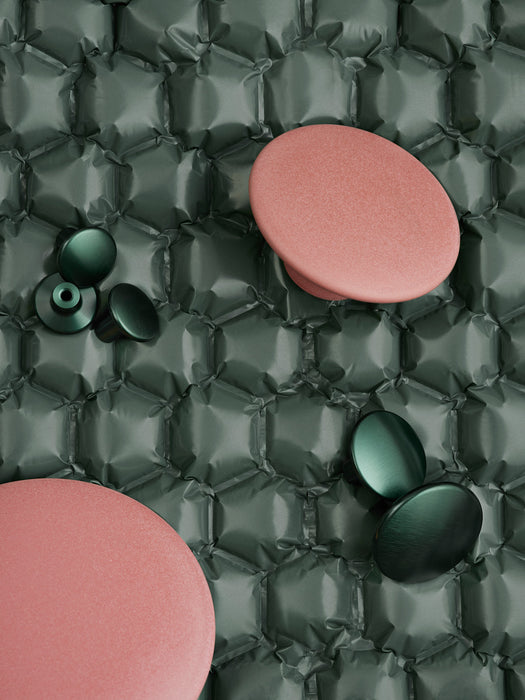

The Dots Ceramic Coat Rack
The Dots Ceramic coat racks bring an artistic and expressive dimension to this iconic Muuto series, reinterpreting the classic wall hook through glazed ceramic with a reactive finish. Each piece features unique nuances on its surface, the result of a handcrafted process that reinforces the individual character of each hook and celebrates the beauty of imperfection.
Made from high-quality earthenware, The Dots Ceramic offer a sophisticated visual presence that transcends functionality, adding texture, depth, and a subtle interplay of reflections to the ensemble. Their sculptural form allows for the creation of customized compositions, combining different sizes and colors, and interacting with the wood or metal versions to create versatile murals with their own unique character.
Ideal for entryways, bedrooms, kitchens, or work areas, Dots Ceramic are much more than a hook: they are a decorative gesture that transforms the wall into a dynamic and living surface.
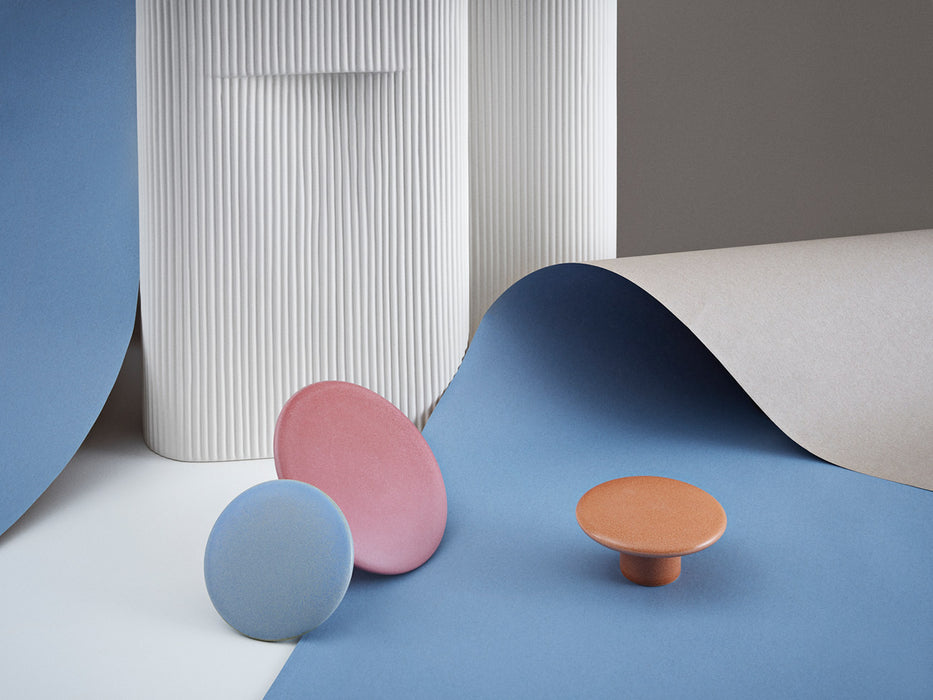

The Dots Ceramic Coat Rack
The Dots Ceramic coat racks bring an artistic and expressive dimension to this iconic Muuto series, reinterpreting the classic wall hook through glazed ceramic with a reactive finish. Each piece features unique nuances on its surface, the result of a handcrafted process that reinforces the individual character of each hook and celebrates the beauty of imperfection.
Made from high-quality earthenware, The Dots Ceramic offer a sophisticated visual presence that transcends functionality, adding texture, depth, and a subtle interplay of reflections to the ensemble. Their sculptural form allows for the creation of customized compositions, combining different sizes and colors, and interacting with the wood or metal versions to create versatile murals with their own unique character.
Ideal for entryways, bedrooms, kitchens, or work areas, Dots Ceramic are much more than a hook: they are a decorative gesture that transforms the wall into a dynamic and living surface.
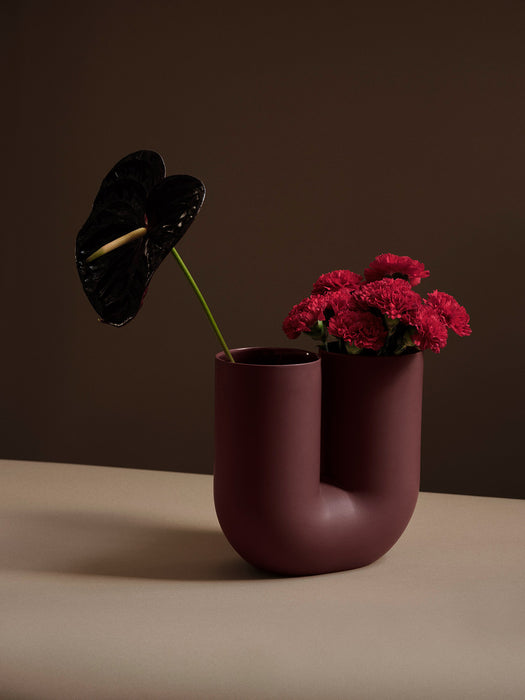

Kink Vase
Muuto's Kink vase transforms the traditional idea of a flower vase through a sculptural silhouette that combines classic craftsmanship with a playful, contemporary design language. Its curved shape, with its double opening, provides a subtle visual tension that enriches any floral arrangement and adds character to the space even when not in use. The satin finish intensifies its refined feel and enhances the natural elegance of its design.
Available in two sizes, the large model can be used as a floor-standing piece or as a stand-alone sculpture, while the smaller format fits harmoniously on shelves, countertops, or windowsills. Beyond its functionality, the Kink vase expresses a new way of inhabiting design, where form and emotion interact naturally.
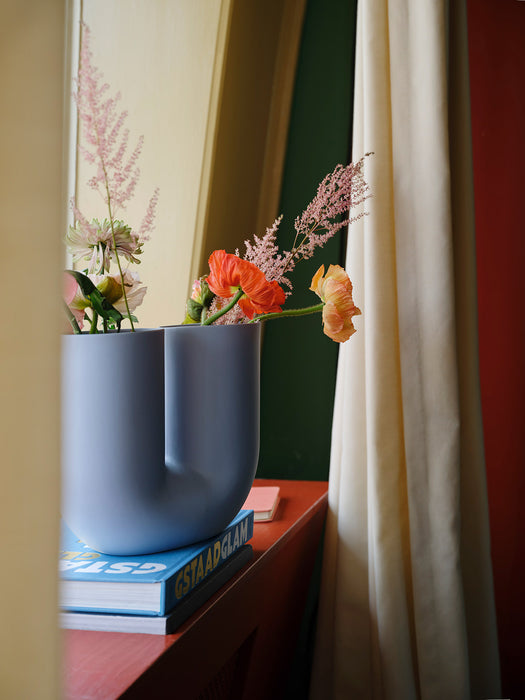

Kink Vase
Muuto's Kink vase transforms the traditional idea of a flower vase through a sculptural silhouette that combines classic craftsmanship with a playful, contemporary design language. Its curved shape, with its double opening, provides a subtle visual tension that enriches any floral arrangement and adds character to the space even when not in use. The satin finish intensifies its refined feel and enhances the natural elegance of its design.
Available in two sizes, the large model can be used as a floor-standing piece or as a stand-alone sculpture, while the smaller format fits harmoniously on shelves, countertops, or windowsills. Beyond its functionality, the Kink vase expresses a new way of inhabiting design, where form and emotion interact naturally.
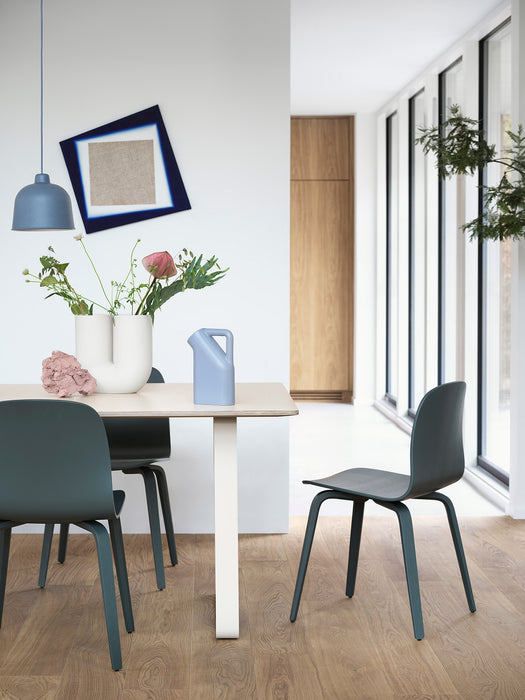

Kink Vase
Muuto's Kink vase transforms the traditional idea of a flower vase through a sculptural silhouette that combines classic craftsmanship with a playful, contemporary design language. Its curved shape, with its double opening, provides a subtle visual tension that enriches any floral arrangement and adds character to the space even when not in use. The satin finish intensifies its refined feel and enhances the natural elegance of its design.
Available in two sizes, the large model can be used as a floor-standing piece or as a stand-alone sculpture, while the smaller format fits harmoniously on shelves, countertops, or windowsills. Beyond its functionality, the Kink vase expresses a new way of inhabiting design, where form and emotion interact naturally.
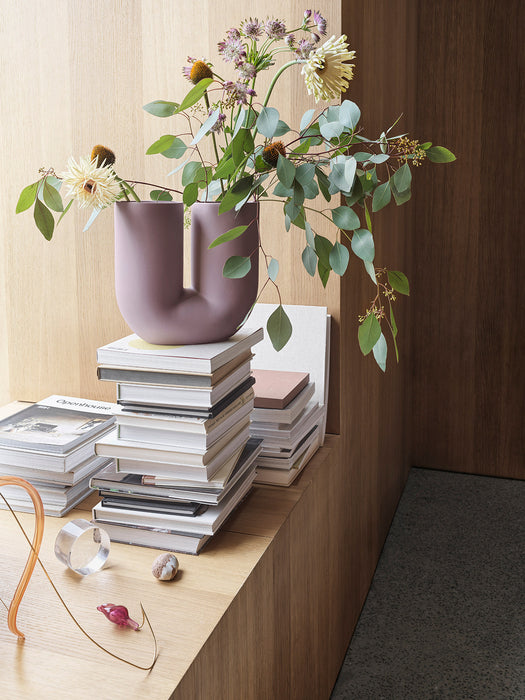

Kink Vase
Muuto's Kink vase transforms the traditional idea of a flower vase through a sculptural silhouette that combines classic craftsmanship with a playful, contemporary design language. Its curved shape, with its double opening, provides a subtle visual tension that enriches any floral arrangement and adds character to the space even when not in use. The satin finish intensifies its refined feel and enhances the natural elegance of its design.
Available in two sizes, the large model can be used as a floor-standing piece or as a stand-alone sculpture, while the smaller format fits harmoniously on shelves, countertops, or windowsills. Beyond its functionality, the Kink vase expresses a new way of inhabiting design, where form and emotion interact naturally.
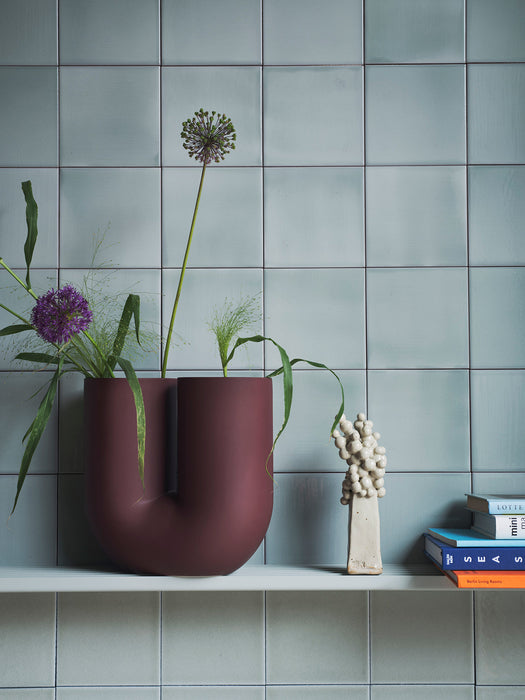

Kink Vase
Muuto's Kink vase transforms the traditional idea of a flower vase through a sculptural silhouette that combines classic craftsmanship with a playful, contemporary design language. Its curved shape, with its double opening, provides a subtle visual tension that enriches any floral arrangement and adds character to the space even when not in use. The satin finish intensifies its refined feel and enhances the natural elegance of its design.
Available in two sizes, the large model can be used as a floor-standing piece or as a stand-alone sculpture, while the smaller format fits harmoniously on shelves, countertops, or windowsills. Beyond its functionality, the Kink vase expresses a new way of inhabiting design, where form and emotion interact naturally.
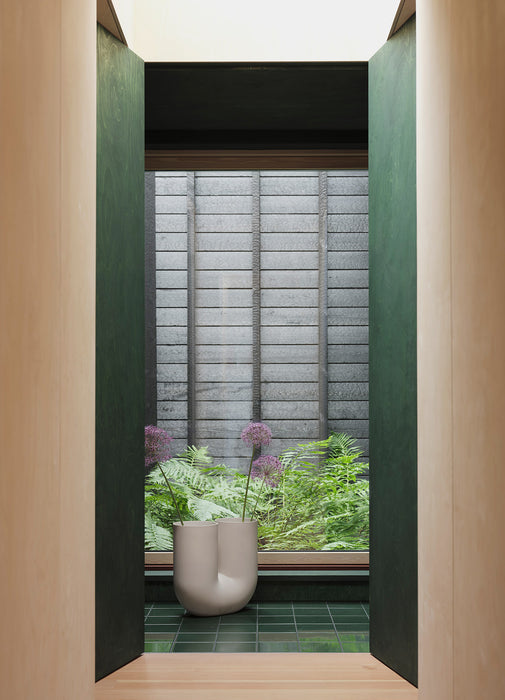

Kink Vase
Muuto's Kink vase transforms the traditional idea of a flower vase through a sculptural silhouette that combines classic craftsmanship with a playful, contemporary design language. Its curved shape, with its double opening, provides a subtle visual tension that enriches any floral arrangement and adds character to the space even when not in use. The satin finish intensifies its refined feel and enhances the natural elegance of its design.
Available in two sizes, the large model can be used as a floor-standing piece or as a stand-alone sculpture, while the smaller format fits harmoniously on shelves, countertops, or windowsills. Beyond its functionality, the Kink vase expresses a new way of inhabiting design, where form and emotion interact naturally.
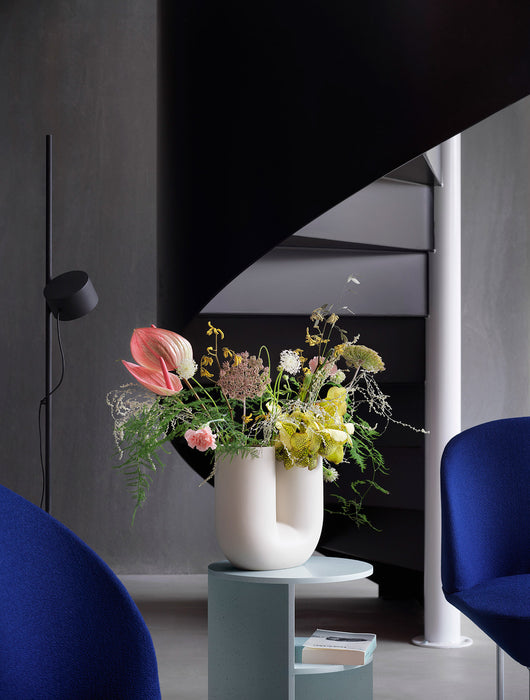

Kink Vase
Muuto's Kink vase transforms the traditional idea of a flower vase through a sculptural silhouette that combines classic craftsmanship with a playful, contemporary design language. Its curved shape, with its double opening, provides a subtle visual tension that enriches any floral arrangement and adds character to the space even when not in use. The satin finish intensifies its refined feel and enhances the natural elegance of its design.
Available in two sizes, the large model can be used as a floor-standing piece or as a stand-alone sculpture, while the smaller format fits harmoniously on shelves, countertops, or windowsills. Beyond its functionality, the Kink vase expresses a new way of inhabiting design, where form and emotion interact naturally.
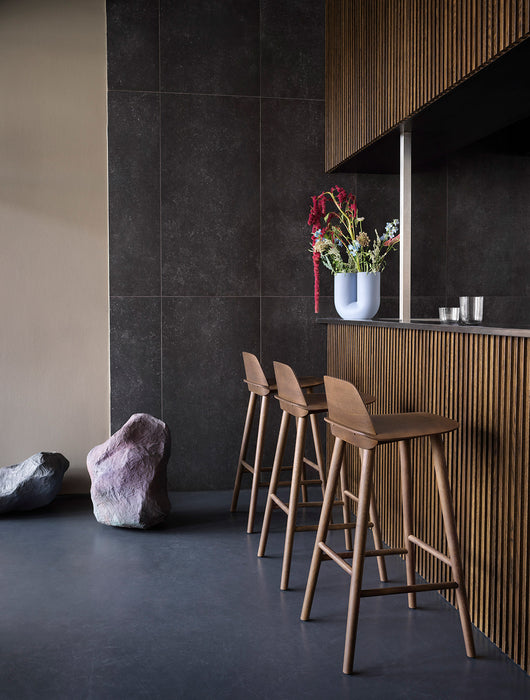

Kink Vase
Muuto's Kink vase transforms the traditional idea of a flower vase through a sculptural silhouette that combines classic craftsmanship with a playful, contemporary design language. Its curved shape, with its double opening, provides a subtle visual tension that enriches any floral arrangement and adds character to the space even when not in use. The satin finish intensifies its refined feel and enhances the natural elegance of its design.
Available in two sizes, the large model can be used as a floor-standing piece or as a stand-alone sculpture, while the smaller format fits harmoniously on shelves, countertops, or windowsills. Beyond its functionality, the Kink vase expresses a new way of inhabiting design, where form and emotion interact naturally.
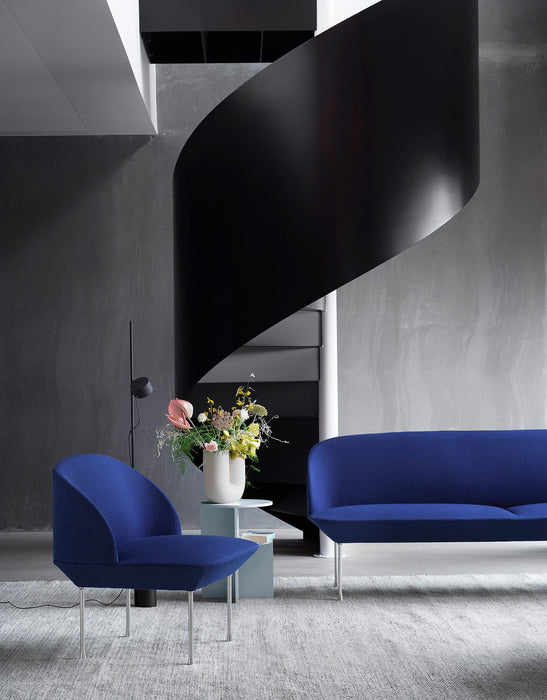

Kink Vase
Muuto's Kink vase transforms the traditional idea of a flower vase through a sculptural silhouette that combines classic craftsmanship with a playful, contemporary design language. Its curved shape, with its double opening, provides a subtle visual tension that enriches any floral arrangement and adds character to the space even when not in use. The satin finish intensifies its refined feel and enhances the natural elegance of its design.
Available in two sizes, the large model can be used as a floor-standing piece or as a stand-alone sculpture, while the smaller format fits harmoniously on shelves, countertops, or windowsills. Beyond its functionality, the Kink vase expresses a new way of inhabiting design, where form and emotion interact naturally.
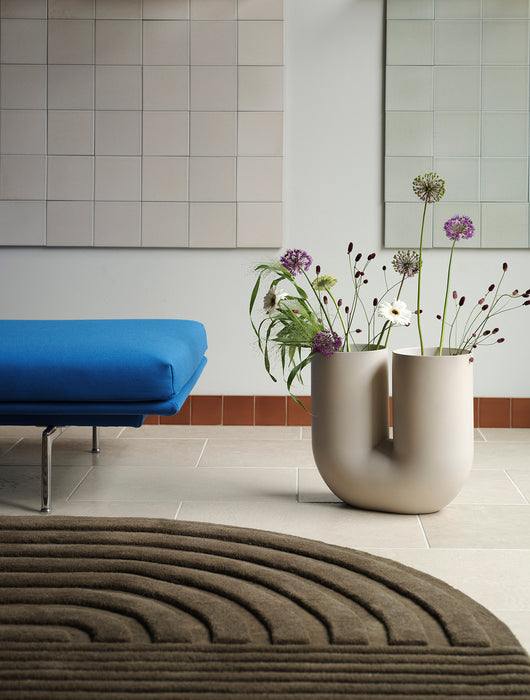

Kink Vase
Muuto's Kink vase transforms the traditional idea of a flower vase through a sculptural silhouette that combines classic craftsmanship with a playful, contemporary design language. Its curved shape, with its double opening, provides a subtle visual tension that enriches any floral arrangement and adds character to the space even when not in use. The satin finish intensifies its refined feel and enhances the natural elegance of its design.
Available in two sizes, the large model can be used as a floor-standing piece or as a stand-alone sculpture, while the smaller format fits harmoniously on shelves, countertops, or windowsills. Beyond its functionality, the Kink vase expresses a new way of inhabiting design, where form and emotion interact naturally.
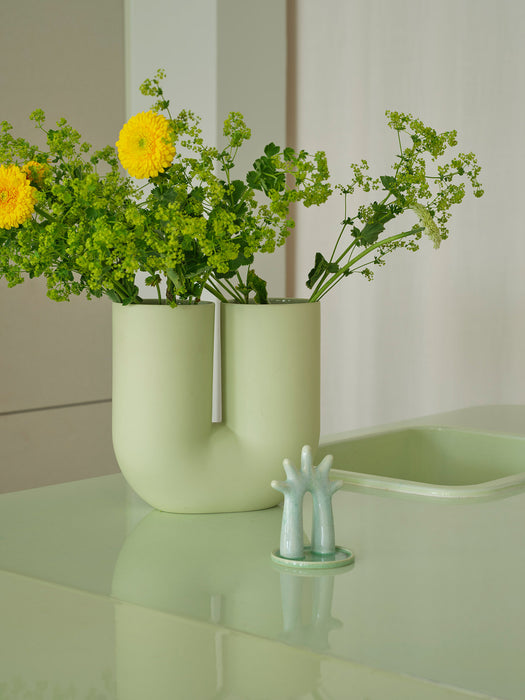

Kink Vase
Muuto's Kink vase transforms the traditional idea of a flower vase through a sculptural silhouette that combines classic craftsmanship with a playful, contemporary design language. Its curved shape, with its double opening, provides a subtle visual tension that enriches any floral arrangement and adds character to the space even when not in use. The satin finish intensifies its refined feel and enhances the natural elegance of its design.
Available in two sizes, the large model can be used as a floor-standing piece or as a stand-alone sculpture, while the smaller format fits harmoniously on shelves, countertops, or windowsills. Beyond its functionality, the Kink vase expresses a new way of inhabiting design, where form and emotion interact naturally.
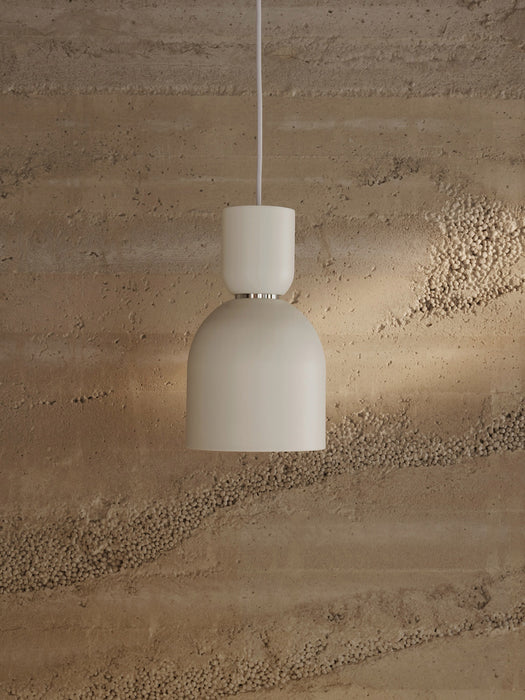

Collect Bell Ceiling Lamp
The Collect Lighting collection by Ferm Living is a modular lighting concept that allows you to design your own lamp by combining different lamp holders and shades. With a versatile and functional approach, this series is designed to adapt to any space and style, offering a wide variety of shapes, finishes, and sizes to customize the light to suit each setting.
Each piece in the collection is a fusion of Scandinavian design and contemporary functionality, where simplicity and high-quality materials create an elegant and timeless aesthetic. Designed to blend into any environment, Collect Lighting lamps are perfect for highlighting light as a key element of interior design.
The combination of the lamp holder and the Bell shade creates a luminaire with a sweeping silhouette and fluid lines. Its bell shape gently directs light downward, creating a warm and inviting atmosphere, ideal for illuminating dining tables, kitchen islands, or gathering areas. Made of powder-coated steel, the Bell shade stands out for its durability and matte finish, available in a sleek, contemporary color palette that allows it to blend in or out with the surroundings.
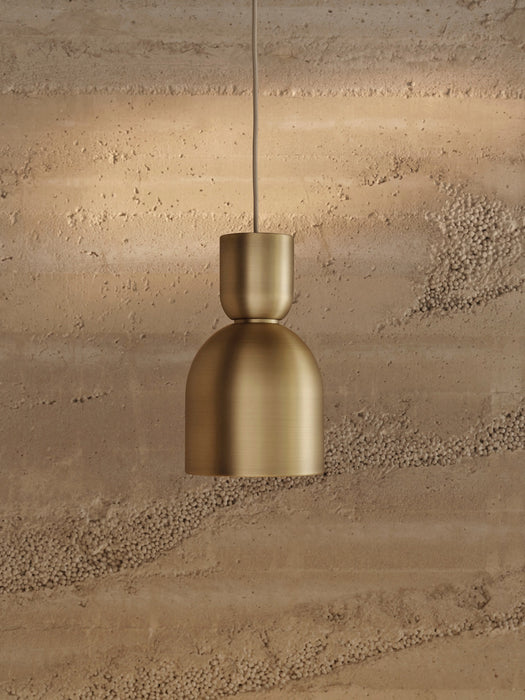

Collect Bell Ceiling Lamp
The Collect Lighting collection by Ferm Living is a modular lighting concept that allows you to design your own lamp by combining different lamp holders and shades. With a versatile and functional approach, this series is designed to adapt to any space and style, offering a wide variety of shapes, finishes, and sizes to customize the light to suit each setting.
Each piece in the collection is a fusion of Scandinavian design and contemporary functionality, where simplicity and high-quality materials create an elegant and timeless aesthetic. Designed to blend into any environment, Collect Lighting lamps are perfect for highlighting light as a key element of interior design.
The combination of the lamp holder and the Bell shade creates a luminaire with a sweeping silhouette and fluid lines. Its bell shape gently directs light downward, creating a warm and inviting atmosphere, ideal for illuminating dining tables, kitchen islands, or gathering areas. Made of powder-coated steel, the Bell shade stands out for its durability and matte finish, available in a sleek, contemporary color palette that allows it to blend in or out with the surroundings.
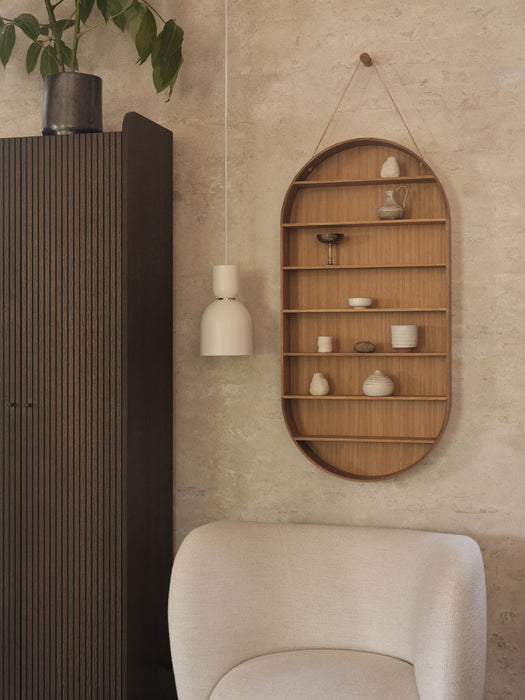

Collect Bell Ceiling Lamp
The Collect Lighting collection by Ferm Living is a modular lighting concept that allows you to design your own lamp by combining different lamp holders and shades. With a versatile and functional approach, this series is designed to adapt to any space and style, offering a wide variety of shapes, finishes, and sizes to customize the light to suit each setting.
Each piece in the collection is a fusion of Scandinavian design and contemporary functionality, where simplicity and high-quality materials create an elegant and timeless aesthetic. Designed to blend into any environment, Collect Lighting lamps are perfect for highlighting light as a key element of interior design.
The combination of the lamp holder and the Bell shade creates a luminaire with a sweeping silhouette and fluid lines. Its bell shape gently directs light downward, creating a warm and inviting atmosphere, ideal for illuminating dining tables, kitchen islands, or gathering areas. Made of powder-coated steel, the Bell shade stands out for its durability and matte finish, available in a sleek, contemporary color palette that allows it to blend in or out with the surroundings.
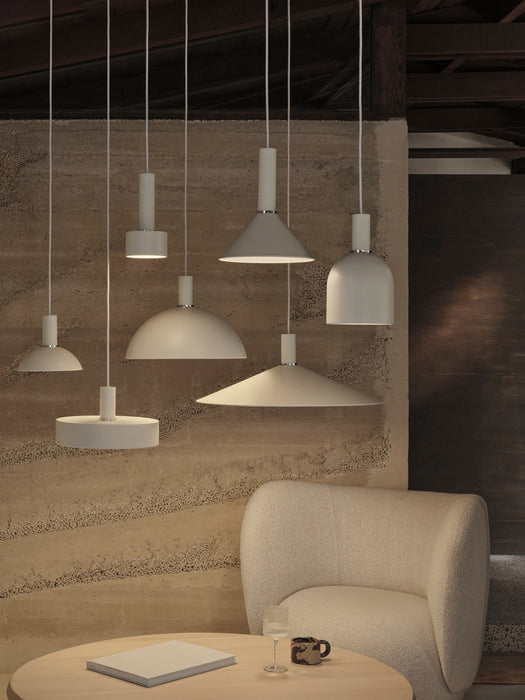

Collect Bell Ceiling Lamp
The Collect Lighting collection by Ferm Living is a modular lighting concept that allows you to design your own lamp by combining different lamp holders and shades. With a versatile and functional approach, this series is designed to adapt to any space and style, offering a wide variety of shapes, finishes, and sizes to customize the light to suit each setting.
Each piece in the collection is a fusion of Scandinavian design and contemporary functionality, where simplicity and high-quality materials create an elegant and timeless aesthetic. Designed to blend into any environment, Collect Lighting lamps are perfect for highlighting light as a key element of interior design.
The combination of the lamp holder and the Bell shade creates a luminaire with a sweeping silhouette and fluid lines. Its bell shape gently directs light downward, creating a warm and inviting atmosphere, ideal for illuminating dining tables, kitchen islands, or gathering areas. Made of powder-coated steel, the Bell shade stands out for its durability and matte finish, available in a sleek, contemporary color palette that allows it to blend in or out with the surroundings.
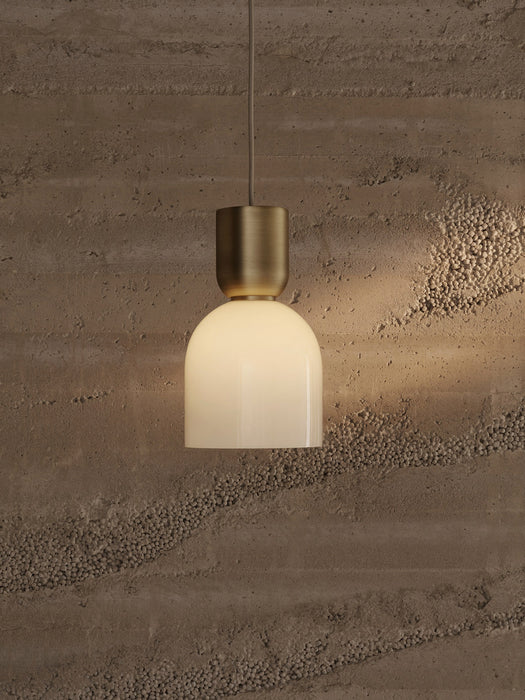

Collect Bell Ceiling Lamp
The Collect Lighting collection by Ferm Living is a modular lighting concept that allows you to design your own lamp by combining different lamp holders and shades. With a versatile and functional approach, this series is designed to adapt to any space and style, offering a wide variety of shapes, finishes, and sizes to customize the light to suit each setting.
Each piece in the collection is a fusion of Scandinavian design and contemporary functionality, where simplicity and high-quality materials create an elegant and timeless aesthetic. Designed to blend into any environment, Collect Lighting lamps are perfect for highlighting light as a key element of interior design.
The combination of the lamp holder and the Bell shade creates a luminaire with a sweeping silhouette and fluid lines. Its bell shape gently directs light downward, creating a warm and inviting atmosphere, ideal for illuminating dining tables, kitchen islands, or gathering areas. Made of powder-coated steel, the Bell shade stands out for its durability and matte finish, available in a sleek, contemporary color palette that allows it to blend in or out with the surroundings.
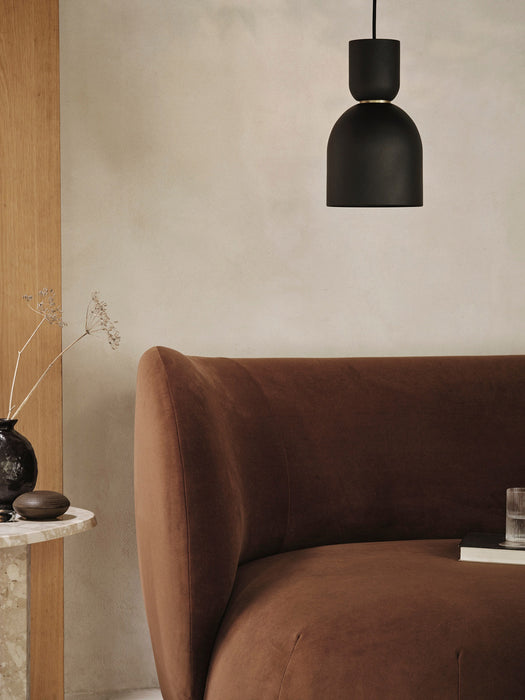

Collect Bell Ceiling Lamp
The Collect Lighting collection by Ferm Living is a modular lighting concept that allows you to design your own lamp by combining different lamp holders and shades. With a versatile and functional approach, this series is designed to adapt to any space and style, offering a wide variety of shapes, finishes, and sizes to customize the light to suit each setting.
Each piece in the collection is a fusion of Scandinavian design and contemporary functionality, where simplicity and high-quality materials create an elegant and timeless aesthetic. Designed to blend into any environment, Collect Lighting lamps are perfect for highlighting light as a key element of interior design.
The combination of the lamp holder and the Bell shade creates a luminaire with a sweeping silhouette and fluid lines. Its bell shape gently directs light downward, creating a warm and inviting atmosphere, ideal for illuminating dining tables, kitchen islands, or gathering areas. Made of powder-coated steel, the Bell shade stands out for its durability and matte finish, available in a sleek, contemporary color palette that allows it to blend in or out with the surroundings.
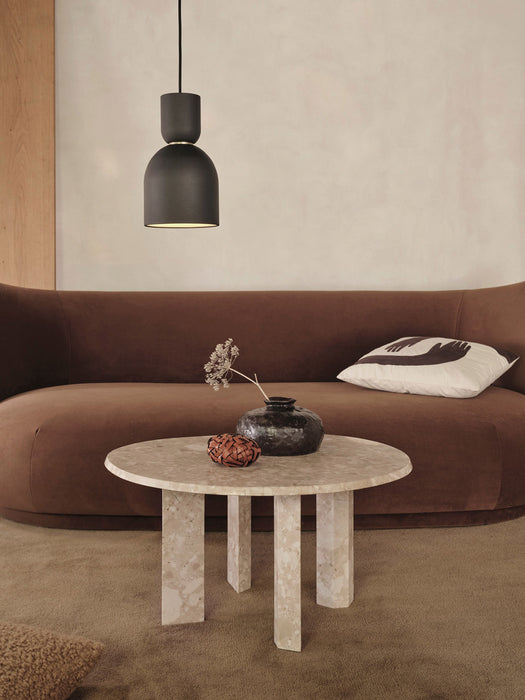

Collect Bell Ceiling Lamp
The Collect Lighting collection by Ferm Living is a modular lighting concept that allows you to design your own lamp by combining different lamp holders and shades. With a versatile and functional approach, this series is designed to adapt to any space and style, offering a wide variety of shapes, finishes, and sizes to customize the light to suit each setting.
Each piece in the collection is a fusion of Scandinavian design and contemporary functionality, where simplicity and high-quality materials create an elegant and timeless aesthetic. Designed to blend into any environment, Collect Lighting lamps are perfect for highlighting light as a key element of interior design.
The combination of the lamp holder and the Bell shade creates a luminaire with a sweeping silhouette and fluid lines. Its bell shape gently directs light downward, creating a warm and inviting atmosphere, ideal for illuminating dining tables, kitchen islands, or gathering areas. Made of powder-coated steel, the Bell shade stands out for its durability and matte finish, available in a sleek, contemporary color palette that allows it to blend in or out with the surroundings.
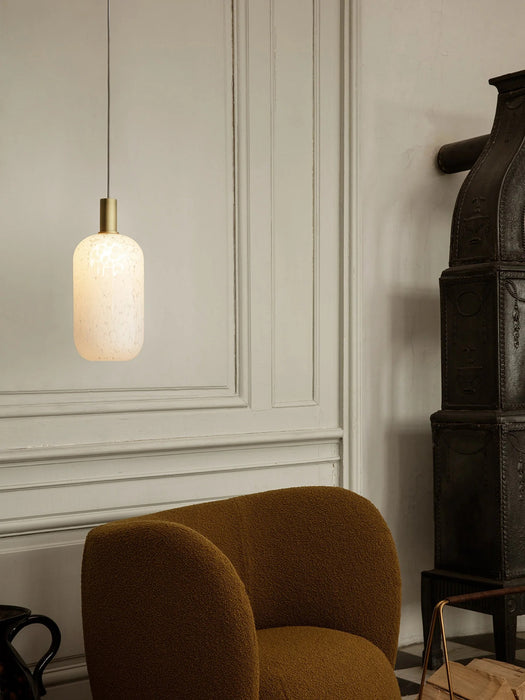

Collect Tall Ceiling Lamp
The Collect Lighting collection by Ferm Living is a modular lighting concept that allows you to design your own lamp by combining different lamp holders and shades. With a versatile and functional approach, this series is designed to adapt to any space and style, offering a wide variety of shapes, finishes, and sizes to customize the light to suit each setting.
Each piece in the collection is a fusion of Scandinavian design and contemporary functionality, where simplicity and high-quality materials create an elegant and timeless aesthetic. Designed to blend into any environment, Collect Lighting lamps are perfect for highlighting light as a key element of interior design.
The combination of the lamp holder and the Opal Shade Tall shade creates a luminaire with soft, vertical lines, ideal for spaces seeking diffused, enveloping light. Made of mouth-blown opal glass, its translucent finish filters the light evenly, creating a serene and elegant atmosphere. Its elongated and proportionate shape makes it a perfect choice for hanging individually or in series, over side tables, in reading nooks, or as a central lamp in intimate settings.
A timeless piece that transforms light into a sculptural element.
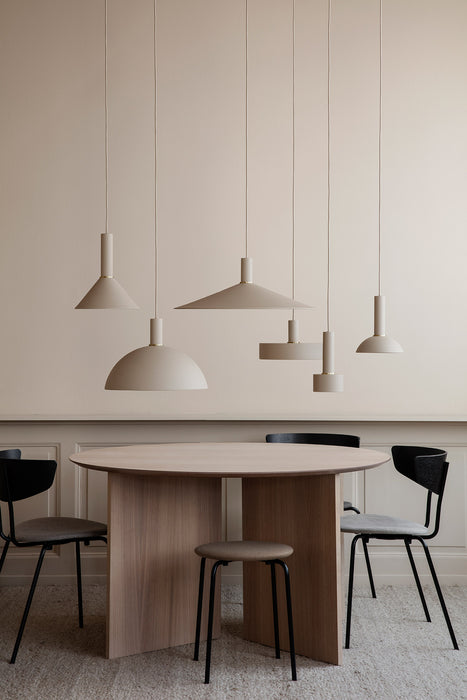

Collect Tall Ceiling Lamp
The Collect Lighting collection by Ferm Living is a modular lighting concept that allows you to design your own lamp by combining different lamp holders and shades. With a versatile and functional approach, this series is designed to adapt to any space and style, offering a wide variety of shapes, finishes, and sizes to customize the light to suit each setting.
Each piece in the collection is a fusion of Scandinavian design and contemporary functionality, where simplicity and high-quality materials create an elegant and timeless aesthetic. Designed to blend into any environment, Collect Lighting lamps are perfect for highlighting light as a key element of interior design.
The combination of the lamp holder and the Opal Shade Tall shade creates a luminaire with soft, vertical lines, ideal for spaces seeking diffused, enveloping light. Made of mouth-blown opal glass, its translucent finish filters the light evenly, creating a serene and elegant atmosphere. Its elongated and proportionate shape makes it a perfect choice for hanging individually or in series, over side tables, in reading nooks, or as a central lamp in intimate settings.
A timeless piece that transforms light into a sculptural element.
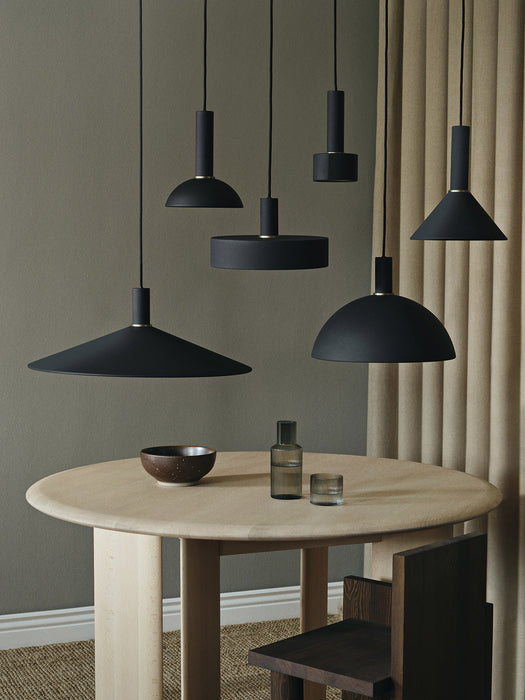

Collect Tall Ceiling Lamp
The Collect Lighting collection by Ferm Living is a modular lighting concept that allows you to design your own lamp by combining different lamp holders and shades. With a versatile and functional approach, this series is designed to adapt to any space and style, offering a wide variety of shapes, finishes, and sizes to customize the light to suit each setting.
Each piece in the collection is a fusion of Scandinavian design and contemporary functionality, where simplicity and high-quality materials create an elegant and timeless aesthetic. Designed to blend into any environment, Collect Lighting lamps are perfect for highlighting light as a key element of interior design.
The combination of the lamp holder and the Opal Shade Tall shade creates a luminaire with soft, vertical lines, ideal for spaces seeking diffused, enveloping light. Made of mouth-blown opal glass, its translucent finish filters the light evenly, creating a serene and elegant atmosphere. Its elongated and proportionate shape makes it a perfect choice for hanging individually or in series, over side tables, in reading nooks, or as a central lamp in intimate settings.
A timeless piece that transforms light into a sculptural element.
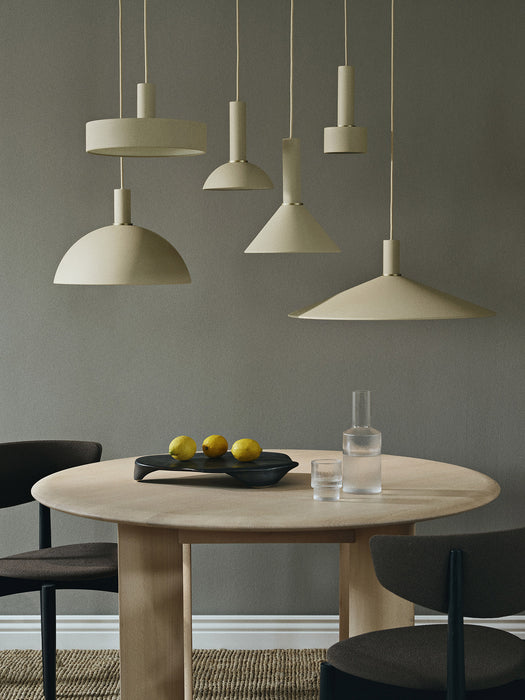

Collect Tall Ceiling Lamp
The Collect Lighting collection by Ferm Living is a modular lighting concept that allows you to design your own lamp by combining different lamp holders and shades. With a versatile and functional approach, this series is designed to adapt to any space and style, offering a wide variety of shapes, finishes, and sizes to customize the light to suit each setting.
Each piece in the collection is a fusion of Scandinavian design and contemporary functionality, where simplicity and high-quality materials create an elegant and timeless aesthetic. Designed to blend into any environment, Collect Lighting lamps are perfect for highlighting light as a key element of interior design.
The combination of the lamp holder and the Opal Shade Tall shade creates a luminaire with soft, vertical lines, ideal for spaces seeking diffused, enveloping light. Made of mouth-blown opal glass, its translucent finish filters the light evenly, creating a serene and elegant atmosphere. Its elongated and proportionate shape makes it a perfect choice for hanging individually or in series, over side tables, in reading nooks, or as a central lamp in intimate settings.
A timeless piece that transforms light into a sculptural element.
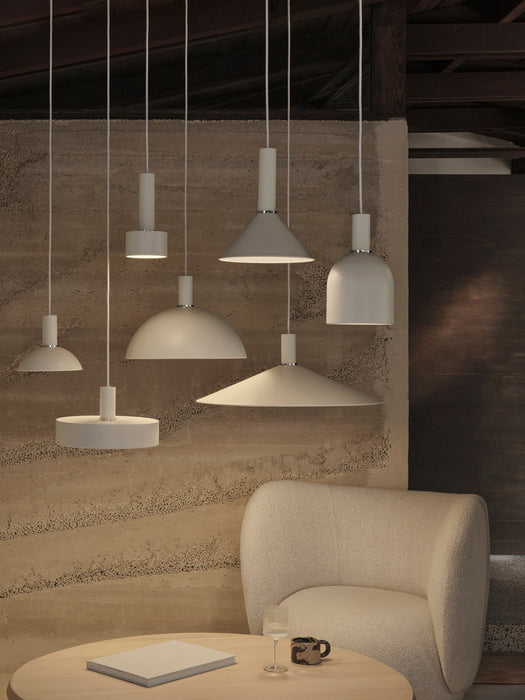

Collect Tall Ceiling Lamp
The Collect Lighting collection by Ferm Living is a modular lighting concept that allows you to design your own lamp by combining different lamp holders and shades. With a versatile and functional approach, this series is designed to adapt to any space and style, offering a wide variety of shapes, finishes, and sizes to customize the light to suit each setting.
Each piece in the collection is a fusion of Scandinavian design and contemporary functionality, where simplicity and high-quality materials create an elegant and timeless aesthetic. Designed to blend into any environment, Collect Lighting lamps are perfect for highlighting light as a key element of interior design.
The combination of the lamp holder and the Opal Shade Tall shade creates a luminaire with soft, vertical lines, ideal for spaces seeking diffused, enveloping light. Made of mouth-blown opal glass, its translucent finish filters the light evenly, creating a serene and elegant atmosphere. Its elongated and proportionate shape makes it a perfect choice for hanging individually or in series, over side tables, in reading nooks, or as a central lamp in intimate settings.
A timeless piece that transforms light into a sculptural element.
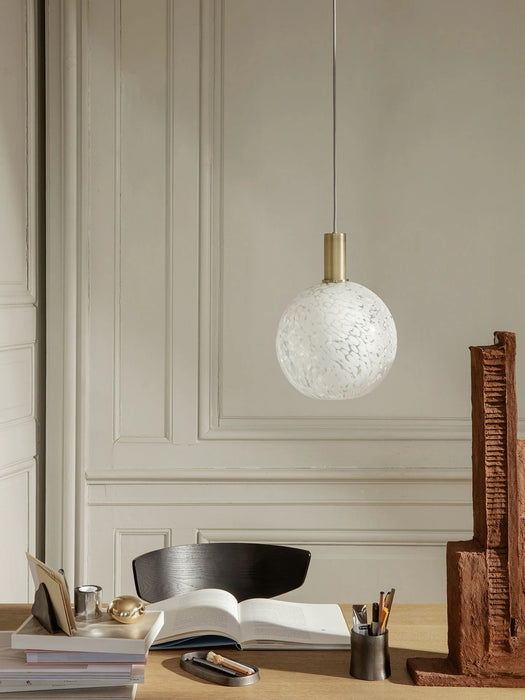

Collect Sphere ceiling lamp
The Collect Lighting collection by Ferm Living is a modular lighting concept that allows you to design your own lamp by combining different lamp holders and shades. With a versatile and functional approach, this series is designed to adapt to any space and style, offering a wide variety of shapes, finishes, and sizes to customize the light to suit each setting.
Each piece in the collection is a fusion of Scandinavian design and contemporary functionality, where simplicity and high-quality materials create an elegant and timeless aesthetic. Designed to blend into any environment, Collect Lighting lamps are perfect for highlighting light as a key element of interior design.
The Collect Sphere configuration reinterprets the timeless elegance of Venetian opal glass in a contemporary lighting piece. Its spherical shape and translucent finish disperse light evenly, creating a soft, enveloping atmosphere in any space. Perfect for adding a classic and sophisticated touch to living rooms, bedrooms, or kitchens within the Collect Lighting series.
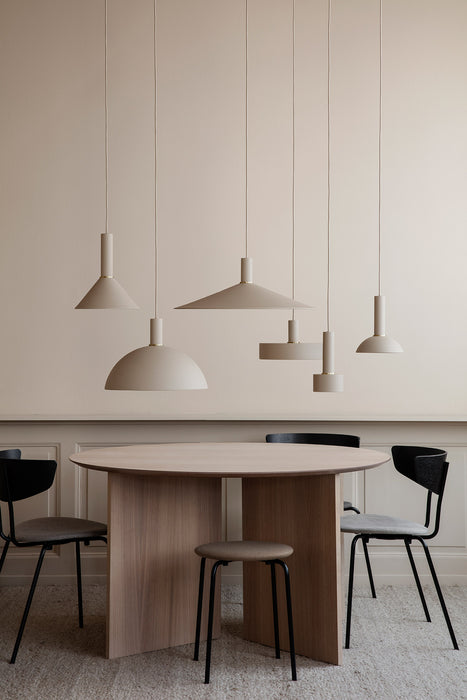

Collect Sphere ceiling lamp
The Collect Lighting collection by Ferm Living is a modular lighting concept that allows you to design your own lamp by combining different lamp holders and shades. With a versatile and functional approach, this series is designed to adapt to any space and style, offering a wide variety of shapes, finishes, and sizes to customize the light to suit each setting.
Each piece in the collection is a fusion of Scandinavian design and contemporary functionality, where simplicity and high-quality materials create an elegant and timeless aesthetic. Designed to blend into any environment, Collect Lighting lamps are perfect for highlighting light as a key element of interior design.
The Collect Sphere configuration reinterprets the timeless elegance of Venetian opal glass in a contemporary lighting piece. Its spherical shape and translucent finish disperse light evenly, creating a soft, enveloping atmosphere in any space. Perfect for adding a classic and sophisticated touch to living rooms, bedrooms, or kitchens within the Collect Lighting series.
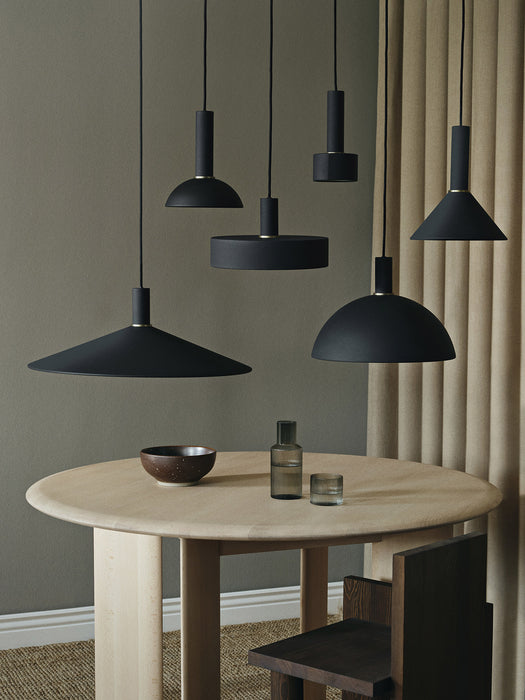

Collect Sphere ceiling lamp
The Collect Lighting collection by Ferm Living is a modular lighting concept that allows you to design your own lamp by combining different lamp holders and shades. With a versatile and functional approach, this series is designed to adapt to any space and style, offering a wide variety of shapes, finishes, and sizes to customize the light to suit each setting.
Each piece in the collection is a fusion of Scandinavian design and contemporary functionality, where simplicity and high-quality materials create an elegant and timeless aesthetic. Designed to blend into any environment, Collect Lighting lamps are perfect for highlighting light as a key element of interior design.
The Collect Sphere configuration reinterprets the timeless elegance of Venetian opal glass in a contemporary lighting piece. Its spherical shape and translucent finish disperse light evenly, creating a soft, enveloping atmosphere in any space. Perfect for adding a classic and sophisticated touch to living rooms, bedrooms, or kitchens within the Collect Lighting series.
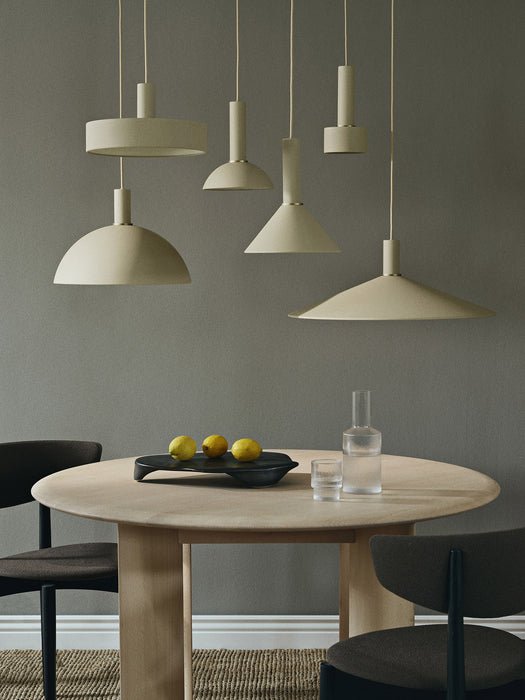

Collect Sphere ceiling lamp
The Collect Lighting collection by Ferm Living is a modular lighting concept that allows you to design your own lamp by combining different lamp holders and shades. With a versatile and functional approach, this series is designed to adapt to any space and style, offering a wide variety of shapes, finishes, and sizes to customize the light to suit each setting.
Each piece in the collection is a fusion of Scandinavian design and contemporary functionality, where simplicity and high-quality materials create an elegant and timeless aesthetic. Designed to blend into any environment, Collect Lighting lamps are perfect for highlighting light as a key element of interior design.
The Collect Sphere configuration reinterprets the timeless elegance of Venetian opal glass in a contemporary lighting piece. Its spherical shape and translucent finish disperse light evenly, creating a soft, enveloping atmosphere in any space. Perfect for adding a classic and sophisticated touch to living rooms, bedrooms, or kitchens within the Collect Lighting series.
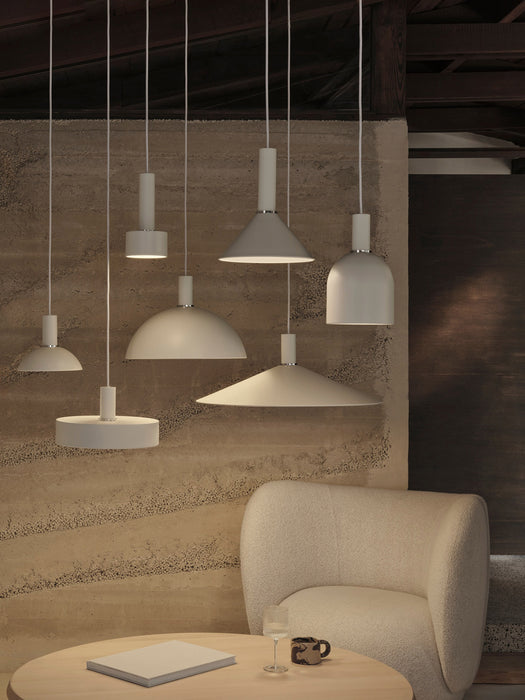

Collect Sphere ceiling lamp
The Collect Lighting collection by Ferm Living is a modular lighting concept that allows you to design your own lamp by combining different lamp holders and shades. With a versatile and functional approach, this series is designed to adapt to any space and style, offering a wide variety of shapes, finishes, and sizes to customize the light to suit each setting.
Each piece in the collection is a fusion of Scandinavian design and contemporary functionality, where simplicity and high-quality materials create an elegant and timeless aesthetic. Designed to blend into any environment, Collect Lighting lamps are perfect for highlighting light as a key element of interior design.
The Collect Sphere configuration reinterprets the timeless elegance of Venetian opal glass in a contemporary lighting piece. Its spherical shape and translucent finish disperse light evenly, creating a soft, enveloping atmosphere in any space. Perfect for adding a classic and sophisticated touch to living rooms, bedrooms, or kitchens within the Collect Lighting series.
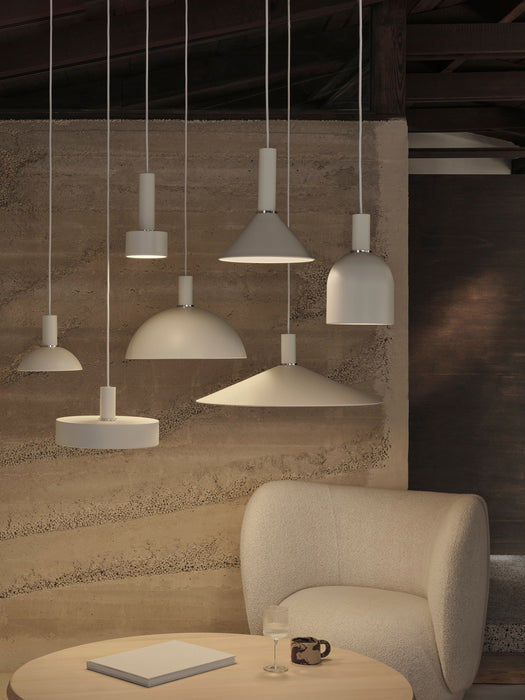

Collect Record Ceiling Lamp
The Collect Lighting collection by Ferm Living is a modular lighting concept that allows you to design your own lamp by combining different lamp holders and shades. With a versatile and functional approach, this series is designed to adapt to any space and style, offering a wide variety of shapes, finishes, and sizes to customize the light to suit each setting.
Each piece in the collection is a fusion of Scandinavian design and contemporary functionality, where simplicity and high-quality materials create an elegant and timeless aesthetic. Designed to blend into any environment, Collect Lighting lamps are perfect for highlighting light as a key element of interior design.
The Collect Record configuration adds a retro and sophisticated touch to any space. Its disc-shaped design, with an elegant silhouette and a reflective interior surface, projects a powerful, focused light downwards, ideal for illuminating dining tables, countertops, or cozy corners. Its timeless aesthetic makes it a distinctive decorative element within the Collect Lighting series.
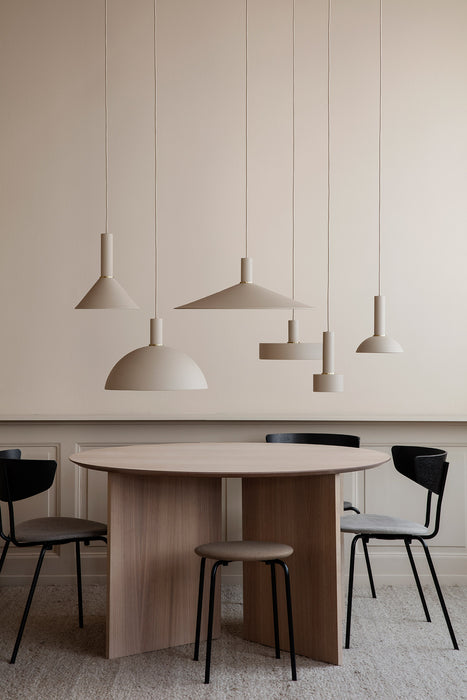

Collect Record Ceiling Lamp
The Collect Lighting collection by Ferm Living is a modular lighting concept that allows you to design your own lamp by combining different lamp holders and shades. With a versatile and functional approach, this series is designed to adapt to any space and style, offering a wide variety of shapes, finishes, and sizes to customize the light to suit each setting.
Each piece in the collection is a fusion of Scandinavian design and contemporary functionality, where simplicity and high-quality materials create an elegant and timeless aesthetic. Designed to blend into any environment, Collect Lighting lamps are perfect for highlighting light as a key element of interior design.
The Collect Record configuration adds a retro and sophisticated touch to any space. Its disc-shaped design, with an elegant silhouette and a reflective interior surface, projects a powerful, focused light downwards, ideal for illuminating dining tables, countertops, or cozy corners. Its timeless aesthetic makes it a distinctive decorative element within the Collect Lighting series.
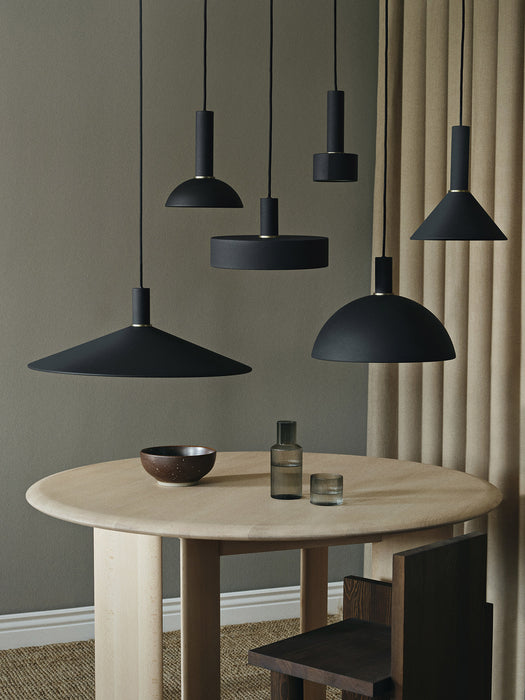

Collect Record Ceiling Lamp
The Collect Lighting collection by Ferm Living is a modular lighting concept that allows you to design your own lamp by combining different lamp holders and shades. With a versatile and functional approach, this series is designed to adapt to any space and style, offering a wide variety of shapes, finishes, and sizes to customize the light to suit each setting.
Each piece in the collection is a fusion of Scandinavian design and contemporary functionality, where simplicity and high-quality materials create an elegant and timeless aesthetic. Designed to blend into any environment, Collect Lighting lamps are perfect for highlighting light as a key element of interior design.
The Collect Record configuration adds a retro and sophisticated touch to any space. Its disc-shaped design, with an elegant silhouette and a reflective interior surface, projects a powerful, focused light downwards, ideal for illuminating dining tables, countertops, or cozy corners. Its timeless aesthetic makes it a distinctive decorative element within the Collect Lighting series.
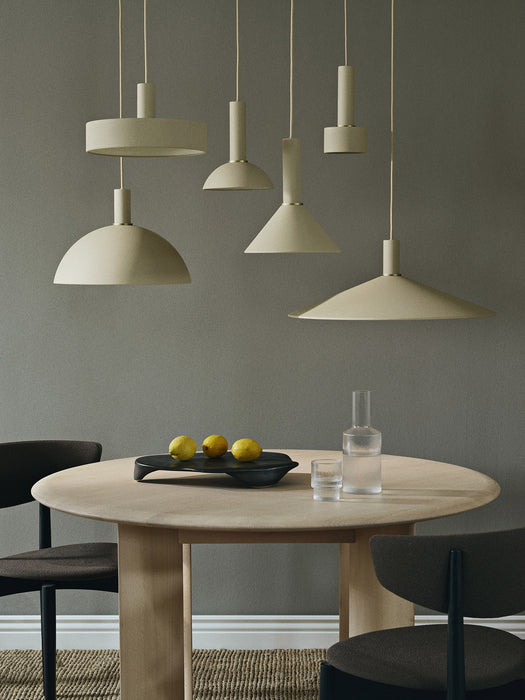

Collect Record Ceiling Lamp
The Collect Lighting collection by Ferm Living is a modular lighting concept that allows you to design your own lamp by combining different lamp holders and shades. With a versatile and functional approach, this series is designed to adapt to any space and style, offering a wide variety of shapes, finishes, and sizes to customize the light to suit each setting.
Each piece in the collection is a fusion of Scandinavian design and contemporary functionality, where simplicity and high-quality materials create an elegant and timeless aesthetic. Designed to blend into any environment, Collect Lighting lamps are perfect for highlighting light as a key element of interior design.
The Collect Record configuration adds a retro and sophisticated touch to any space. Its disc-shaped design, with an elegant silhouette and a reflective interior surface, projects a powerful, focused light downwards, ideal for illuminating dining tables, countertops, or cozy corners. Its timeless aesthetic makes it a distinctive decorative element within the Collect Lighting series.
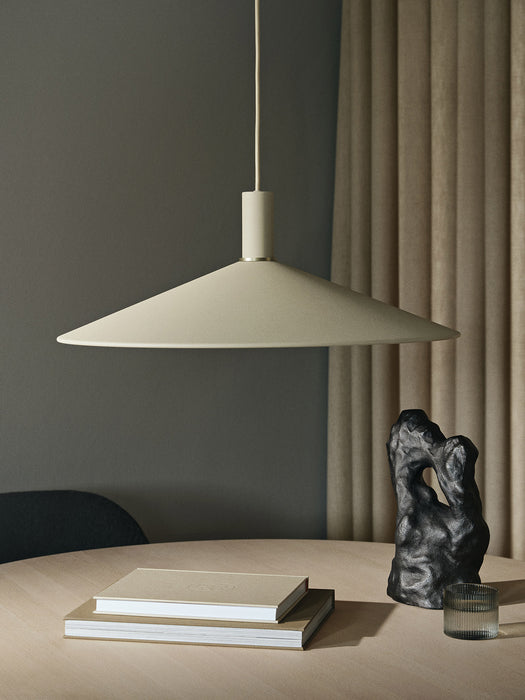

Collect Angle ceiling lamp
The Collect Lighting collection by Ferm Living is a modular lighting concept that allows you to design your own lamp by combining different lamp holders and shades. With a versatile and functional approach, this series is designed to adapt to any space and style, offering a wide variety of shapes, finishes, and sizes to customize the light to suit each setting.
Each piece in the collection is a fusion of Scandinavian design and contemporary functionality, where simplicity and high-quality materials create an elegant and timeless aesthetic. Designed to blend into any environment, Collect Lighting lamps are perfect for highlighting light as a key element of interior design.
The Collect Angle configuration stands out for its large format and sculptural presence. Designed to provide powerful, immersive lighting, this open metal shade brings character and functionality to any space. Its geometric silhouette makes it a focal point above dining tables or in large spaces, while its clean lines ensure a harmonious integration into any interior style.
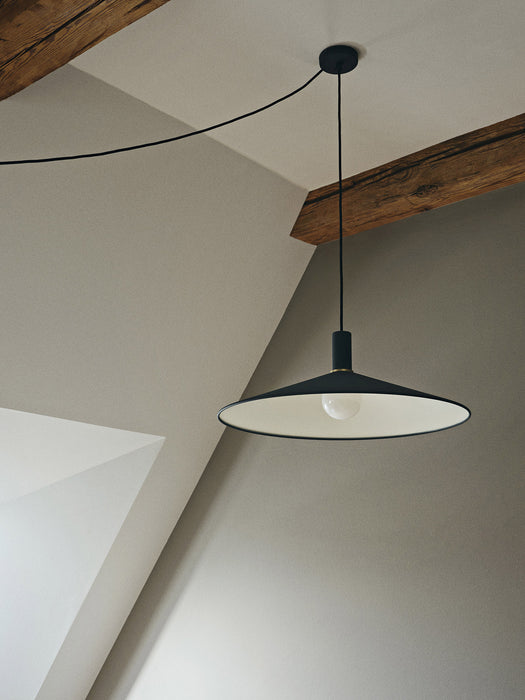

Collect Angle ceiling lamp
The Collect Lighting collection by Ferm Living is a modular lighting concept that allows you to design your own lamp by combining different lamp holders and shades. With a versatile and functional approach, this series is designed to adapt to any space and style, offering a wide variety of shapes, finishes, and sizes to customize the light to suit each setting.
Each piece in the collection is a fusion of Scandinavian design and contemporary functionality, where simplicity and high-quality materials create an elegant and timeless aesthetic. Designed to blend into any environment, Collect Lighting lamps are perfect for highlighting light as a key element of interior design.
The Collect Angle configuration stands out for its large format and sculptural presence. Designed to provide powerful, immersive lighting, this open metal shade brings character and functionality to any space. Its geometric silhouette makes it a focal point above dining tables or in large spaces, while its clean lines ensure a harmonious integration into any interior style.
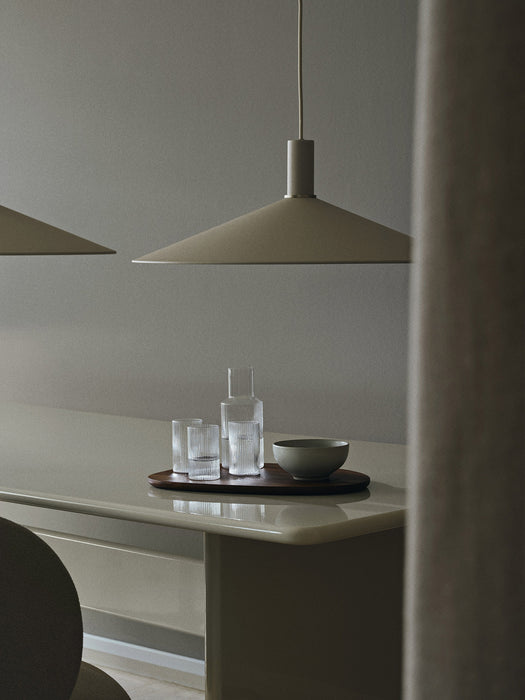

Collect Angle ceiling lamp
The Collect Lighting collection by Ferm Living is a modular lighting concept that allows you to design your own lamp by combining different lamp holders and shades. With a versatile and functional approach, this series is designed to adapt to any space and style, offering a wide variety of shapes, finishes, and sizes to customize the light to suit each setting.
Each piece in the collection is a fusion of Scandinavian design and contemporary functionality, where simplicity and high-quality materials create an elegant and timeless aesthetic. Designed to blend into any environment, Collect Lighting lamps are perfect for highlighting light as a key element of interior design.
The Collect Angle configuration stands out for its large format and sculptural presence. Designed to provide powerful, immersive lighting, this open metal shade brings character and functionality to any space. Its geometric silhouette makes it a focal point above dining tables or in large spaces, while its clean lines ensure a harmonious integration into any interior style.
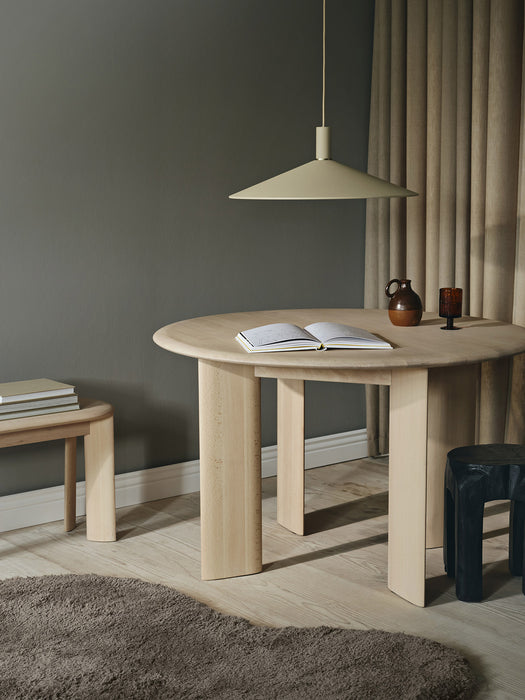

Collect Angle ceiling lamp
The Collect Lighting collection by Ferm Living is a modular lighting concept that allows you to design your own lamp by combining different lamp holders and shades. With a versatile and functional approach, this series is designed to adapt to any space and style, offering a wide variety of shapes, finishes, and sizes to customize the light to suit each setting.
Each piece in the collection is a fusion of Scandinavian design and contemporary functionality, where simplicity and high-quality materials create an elegant and timeless aesthetic. Designed to blend into any environment, Collect Lighting lamps are perfect for highlighting light as a key element of interior design.
The Collect Angle configuration stands out for its large format and sculptural presence. Designed to provide powerful, immersive lighting, this open metal shade brings character and functionality to any space. Its geometric silhouette makes it a focal point above dining tables or in large spaces, while its clean lines ensure a harmonious integration into any interior style.
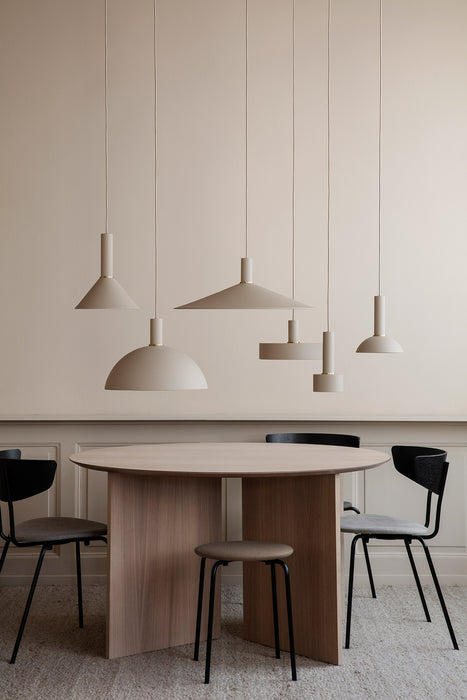

Collect Angle ceiling lamp
The Collect Lighting collection by Ferm Living is a modular lighting concept that allows you to design your own lamp by combining different lamp holders and shades. With a versatile and functional approach, this series is designed to adapt to any space and style, offering a wide variety of shapes, finishes, and sizes to customize the light to suit each setting.
Each piece in the collection is a fusion of Scandinavian design and contemporary functionality, where simplicity and high-quality materials create an elegant and timeless aesthetic. Designed to blend into any environment, Collect Lighting lamps are perfect for highlighting light as a key element of interior design.
The Collect Angle configuration stands out for its large format and sculptural presence. Designed to provide powerful, immersive lighting, this open metal shade brings character and functionality to any space. Its geometric silhouette makes it a focal point above dining tables or in large spaces, while its clean lines ensure a harmonious integration into any interior style.
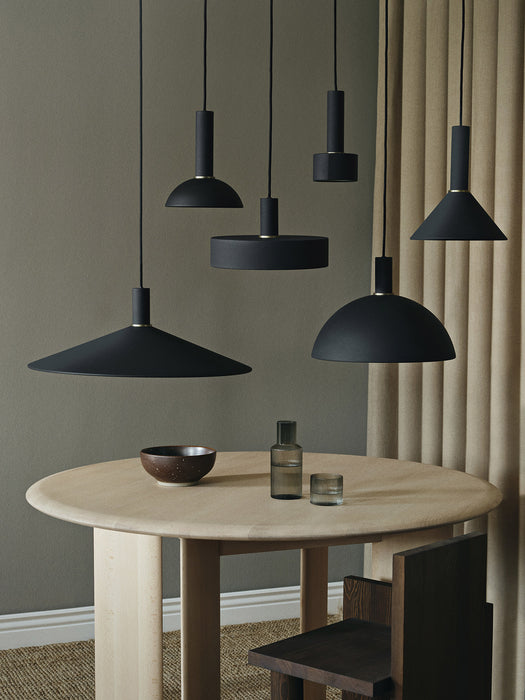

Collect Angle ceiling lamp
The Collect Lighting collection by Ferm Living is a modular lighting concept that allows you to design your own lamp by combining different lamp holders and shades. With a versatile and functional approach, this series is designed to adapt to any space and style, offering a wide variety of shapes, finishes, and sizes to customize the light to suit each setting.
Each piece in the collection is a fusion of Scandinavian design and contemporary functionality, where simplicity and high-quality materials create an elegant and timeless aesthetic. Designed to blend into any environment, Collect Lighting lamps are perfect for highlighting light as a key element of interior design.
The Collect Angle configuration stands out for its large format and sculptural presence. Designed to provide powerful, immersive lighting, this open metal shade brings character and functionality to any space. Its geometric silhouette makes it a focal point above dining tables or in large spaces, while its clean lines ensure a harmonious integration into any interior style.
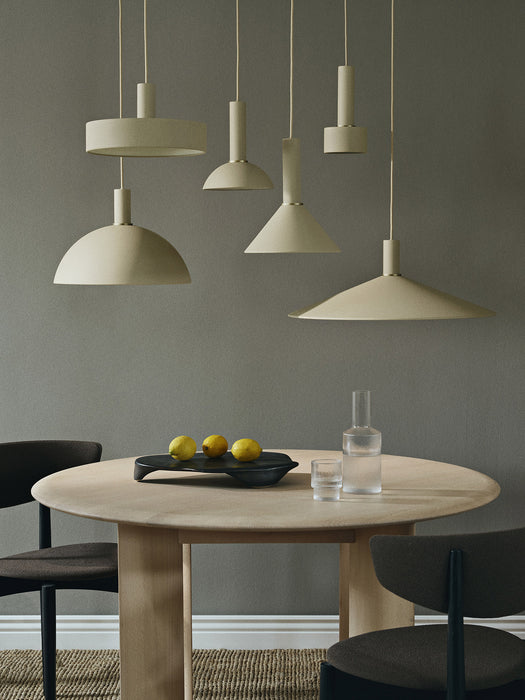

Collect Angle ceiling lamp
The Collect Lighting collection by Ferm Living is a modular lighting concept that allows you to design your own lamp by combining different lamp holders and shades. With a versatile and functional approach, this series is designed to adapt to any space and style, offering a wide variety of shapes, finishes, and sizes to customize the light to suit each setting.
Each piece in the collection is a fusion of Scandinavian design and contemporary functionality, where simplicity and high-quality materials create an elegant and timeless aesthetic. Designed to blend into any environment, Collect Lighting lamps are perfect for highlighting light as a key element of interior design.
The Collect Angle configuration stands out for its large format and sculptural presence. Designed to provide powerful, immersive lighting, this open metal shade brings character and functionality to any space. Its geometric silhouette makes it a focal point above dining tables or in large spaces, while its clean lines ensure a harmonious integration into any interior style.
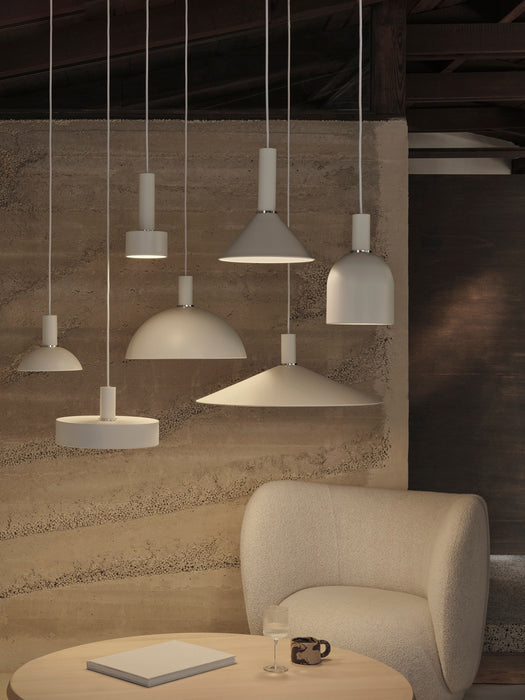

Collect Angle ceiling lamp
The Collect Lighting collection by Ferm Living is a modular lighting concept that allows you to design your own lamp by combining different lamp holders and shades. With a versatile and functional approach, this series is designed to adapt to any space and style, offering a wide variety of shapes, finishes, and sizes to customize the light to suit each setting.
Each piece in the collection is a fusion of Scandinavian design and contemporary functionality, where simplicity and high-quality materials create an elegant and timeless aesthetic. Designed to blend into any environment, Collect Lighting lamps are perfect for highlighting light as a key element of interior design.
The Collect Angle configuration stands out for its large format and sculptural presence. Designed to provide powerful, immersive lighting, this open metal shade brings character and functionality to any space. Its geometric silhouette makes it a focal point above dining tables or in large spaces, while its clean lines ensure a harmonious integration into any interior style.
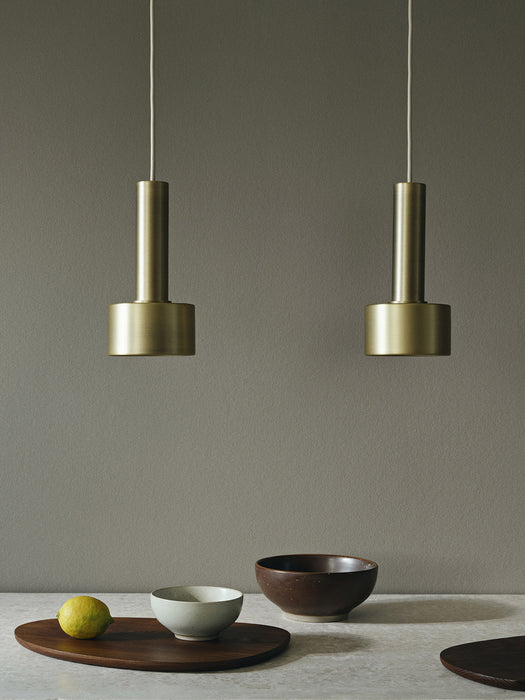

Collect Disc ceiling lamp
The Collect Lighting collection by Ferm Living is a modular lighting concept that allows you to design your own lamp by combining different lamp holders and shades. With a versatile and functional approach, this series is designed to adapt to any space and style, offering a wide variety of shapes, finishes, and sizes to customize the light to suit each setting.
Each piece in the collection is a fusion of Scandinavian design and contemporary functionality, where simplicity and high-quality materials create an elegant and timeless aesthetic. Designed to blend into any environment, Collect Lighting lamps are perfect for highlighting light as a key element of interior design.
The Collect Disc configuration fuses retro shapes with a contemporary aesthetic. Its low-profile metal shade projects a powerful, focused light downward, ideal for illuminating dining tables, countertops, or workspaces with style and functionality. Thanks to its reflective white interior, it ensures optimal illumination while adding a subtle decorative touch to any space.
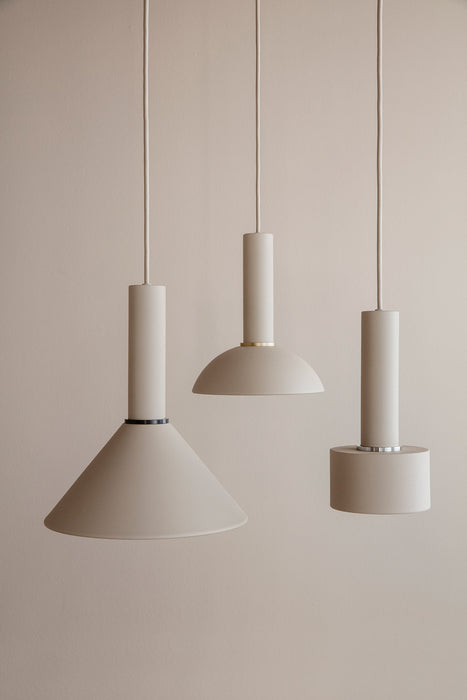

Collect Disc ceiling lamp
The Collect Lighting collection by Ferm Living is a modular lighting concept that allows you to design your own lamp by combining different lamp holders and shades. With a versatile and functional approach, this series is designed to adapt to any space and style, offering a wide variety of shapes, finishes, and sizes to customize the light to suit each setting.
Each piece in the collection is a fusion of Scandinavian design and contemporary functionality, where simplicity and high-quality materials create an elegant and timeless aesthetic. Designed to blend into any environment, Collect Lighting lamps are perfect for highlighting light as a key element of interior design.
The Collect Disc configuration fuses retro shapes with a contemporary aesthetic. Its low-profile metal shade projects a powerful, focused light downward, ideal for illuminating dining tables, countertops, or workspaces with style and functionality. Thanks to its reflective white interior, it ensures optimal illumination while adding a subtle decorative touch to any space.
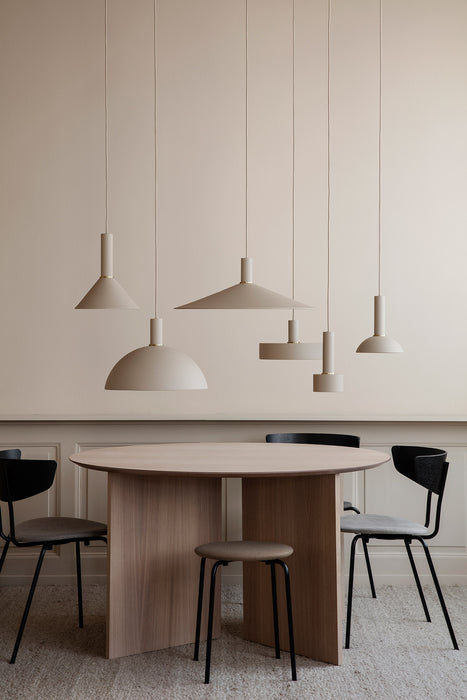

Collect Disc ceiling lamp
The Collect Lighting collection by Ferm Living is a modular lighting concept that allows you to design your own lamp by combining different lamp holders and shades. With a versatile and functional approach, this series is designed to adapt to any space and style, offering a wide variety of shapes, finishes, and sizes to customize the light to suit each setting.
Each piece in the collection is a fusion of Scandinavian design and contemporary functionality, where simplicity and high-quality materials create an elegant and timeless aesthetic. Designed to blend into any environment, Collect Lighting lamps are perfect for highlighting light as a key element of interior design.
The Collect Disc configuration fuses retro shapes with a contemporary aesthetic. Its low-profile metal shade projects a powerful, focused light downward, ideal for illuminating dining tables, countertops, or workspaces with style and functionality. Thanks to its reflective white interior, it ensures optimal illumination while adding a subtle decorative touch to any space.
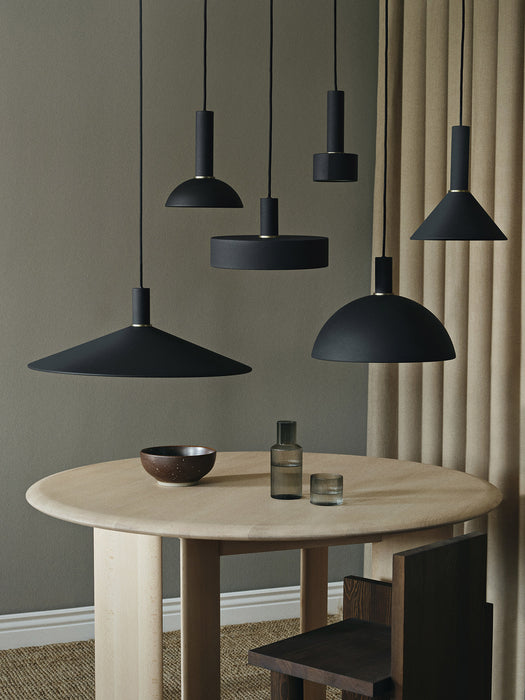

Collect Disc ceiling lamp
The Collect Lighting collection by Ferm Living is a modular lighting concept that allows you to design your own lamp by combining different lamp holders and shades. With a versatile and functional approach, this series is designed to adapt to any space and style, offering a wide variety of shapes, finishes, and sizes to customize the light to suit each setting.
Each piece in the collection is a fusion of Scandinavian design and contemporary functionality, where simplicity and high-quality materials create an elegant and timeless aesthetic. Designed to blend into any environment, Collect Lighting lamps are perfect for highlighting light as a key element of interior design.
The Collect Disc configuration fuses retro shapes with a contemporary aesthetic. Its low-profile metal shade projects a powerful, focused light downward, ideal for illuminating dining tables, countertops, or workspaces with style and functionality. Thanks to its reflective white interior, it ensures optimal illumination while adding a subtle decorative touch to any space.
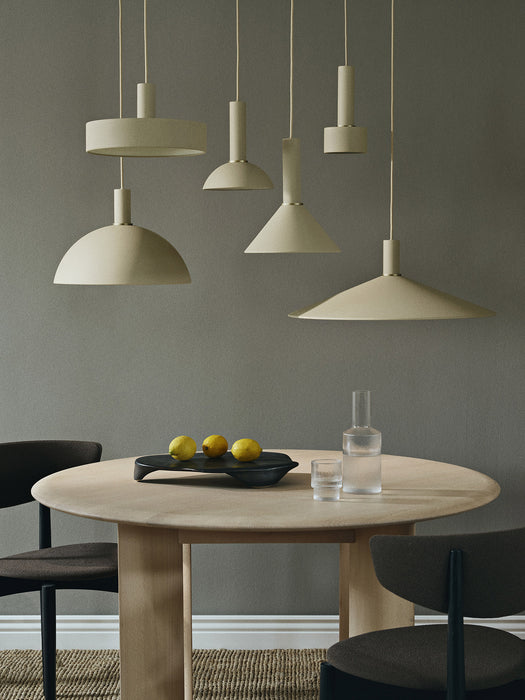

Collect Disc ceiling lamp
The Collect Lighting collection by Ferm Living is a modular lighting concept that allows you to design your own lamp by combining different lamp holders and shades. With a versatile and functional approach, this series is designed to adapt to any space and style, offering a wide variety of shapes, finishes, and sizes to customize the light to suit each setting.
Each piece in the collection is a fusion of Scandinavian design and contemporary functionality, where simplicity and high-quality materials create an elegant and timeless aesthetic. Designed to blend into any environment, Collect Lighting lamps are perfect for highlighting light as a key element of interior design.
The Collect Disc configuration fuses retro shapes with a contemporary aesthetic. Its low-profile metal shade projects a powerful, focused light downward, ideal for illuminating dining tables, countertops, or workspaces with style and functionality. Thanks to its reflective white interior, it ensures optimal illumination while adding a subtle decorative touch to any space.
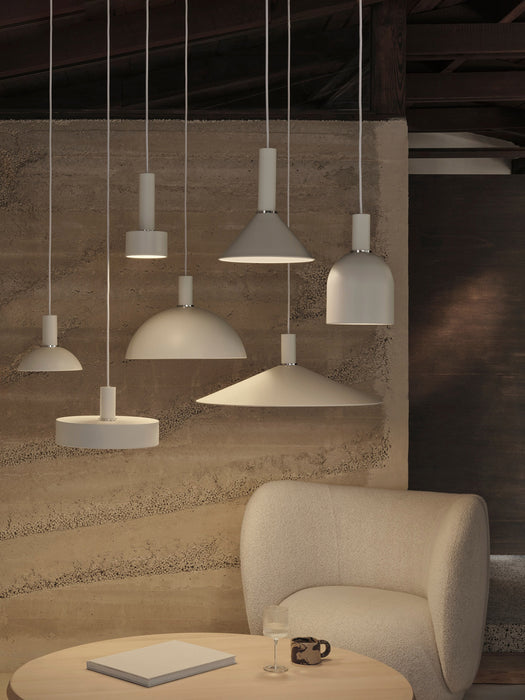

Collect Disc ceiling lamp
The Collect Lighting collection by Ferm Living is a modular lighting concept that allows you to design your own lamp by combining different lamp holders and shades. With a versatile and functional approach, this series is designed to adapt to any space and style, offering a wide variety of shapes, finishes, and sizes to customize the light to suit each setting.
Each piece in the collection is a fusion of Scandinavian design and contemporary functionality, where simplicity and high-quality materials create an elegant and timeless aesthetic. Designed to blend into any environment, Collect Lighting lamps are perfect for highlighting light as a key element of interior design.
The Collect Disc configuration fuses retro shapes with a contemporary aesthetic. Its low-profile metal shade projects a powerful, focused light downward, ideal for illuminating dining tables, countertops, or workspaces with style and functionality. Thanks to its reflective white interior, it ensures optimal illumination while adding a subtle decorative touch to any space.
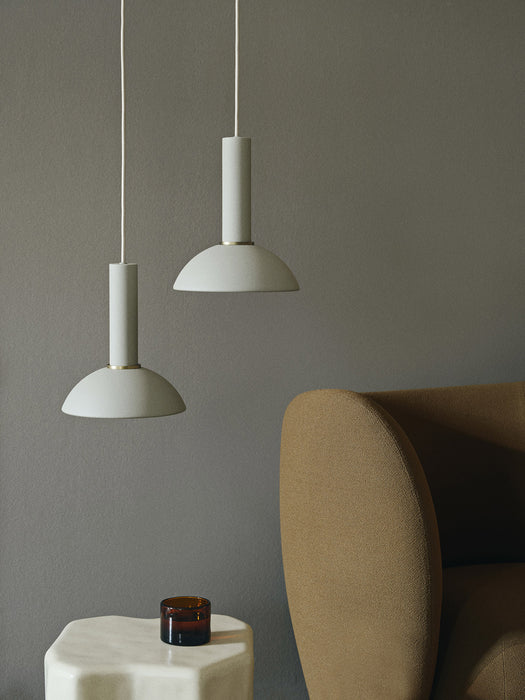

Collect Hoop Ceiling Lamp
The Collect Lighting collection by Ferm Living is a modular lighting concept that allows you to design your own lamp by combining different lamp holders and shades. With a versatile and functional approach, this series is designed to adapt to any space and style, offering a wide variety of shapes, finishes, and sizes to customize the light to suit each setting.
Each piece in the collection is a fusion of Scandinavian design and contemporary functionality, where simplicity and high-quality materials create an elegant and timeless aesthetic. Designed to blend into any environment, Collect Lighting lamps are perfect for highlighting light as a key element of interior design.
The Collect Hoop configuration adds a touch of subtle elegance with its curvilinear, minimalist design. Its metal hoop-shaped shade diffuses light softly and delicately, perfect for creating a cozy atmosphere on bedside tables, kitchen countertops, or in special corners. Its reflective white interior maximizes illumination, ensuring a balance between functionality and refined style.
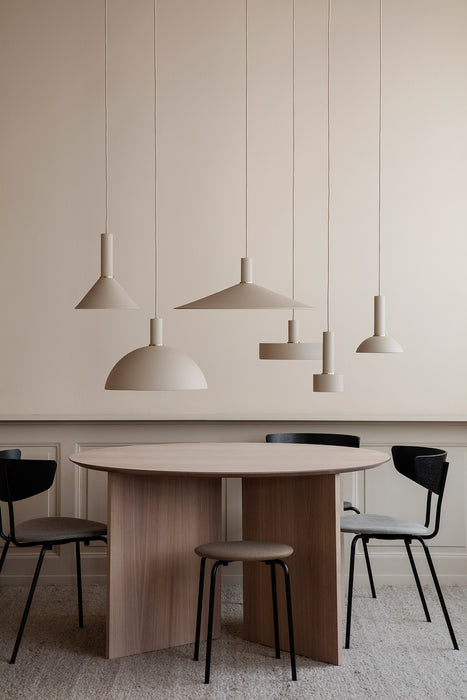

Collect Hoop Ceiling Lamp
The Collect Lighting collection by Ferm Living is a modular lighting concept that allows you to design your own lamp by combining different lamp holders and shades. With a versatile and functional approach, this series is designed to adapt to any space and style, offering a wide variety of shapes, finishes, and sizes to customize the light to suit each setting.
Each piece in the collection is a fusion of Scandinavian design and contemporary functionality, where simplicity and high-quality materials create an elegant and timeless aesthetic. Designed to blend into any environment, Collect Lighting lamps are perfect for highlighting light as a key element of interior design.
The Collect Hoop configuration adds a touch of subtle elegance with its curvilinear, minimalist design. Its metal hoop-shaped shade diffuses light softly and delicately, perfect for creating a cozy atmosphere on bedside tables, kitchen countertops, or in special corners. Its reflective white interior maximizes illumination, ensuring a balance between functionality and refined style.
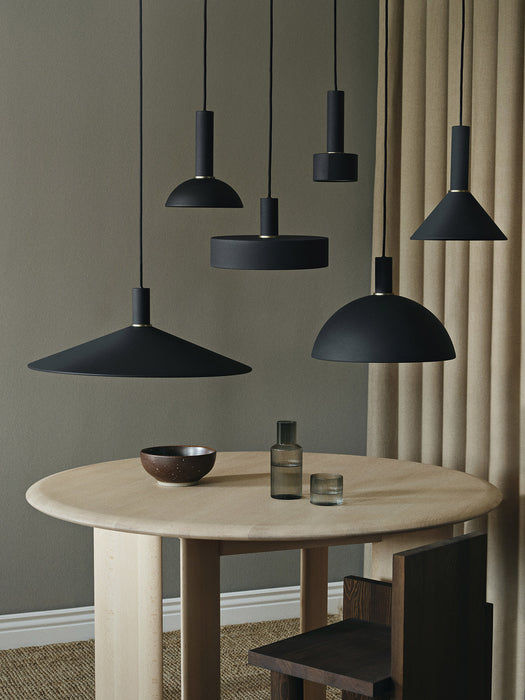

Collect Hoop Ceiling Lamp
The Collect Lighting collection by Ferm Living is a modular lighting concept that allows you to design your own lamp by combining different lamp holders and shades. With a versatile and functional approach, this series is designed to adapt to any space and style, offering a wide variety of shapes, finishes, and sizes to customize the light to suit each setting.
Each piece in the collection is a fusion of Scandinavian design and contemporary functionality, where simplicity and high-quality materials create an elegant and timeless aesthetic. Designed to blend into any environment, Collect Lighting lamps are perfect for highlighting light as a key element of interior design.
The Collect Hoop configuration adds a touch of subtle elegance with its curvilinear, minimalist design. Its metal hoop-shaped shade diffuses light softly and delicately, perfect for creating a cozy atmosphere on bedside tables, kitchen countertops, or in special corners. Its reflective white interior maximizes illumination, ensuring a balance between functionality and refined style.
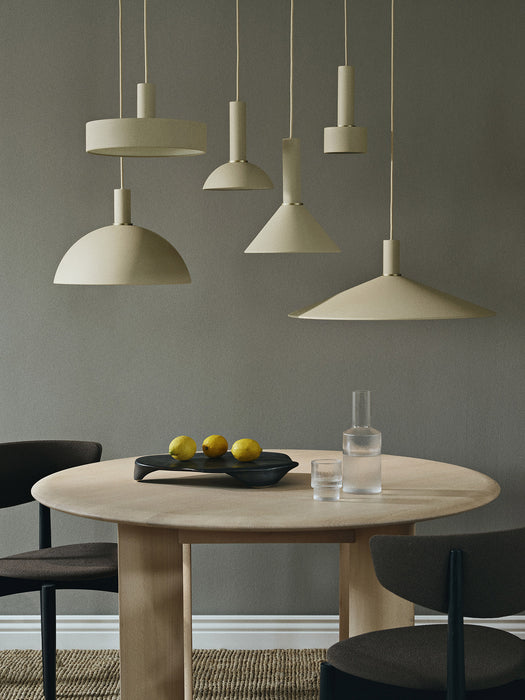

Collect Hoop Ceiling Lamp
The Collect Lighting collection by Ferm Living is a modular lighting concept that allows you to design your own lamp by combining different lamp holders and shades. With a versatile and functional approach, this series is designed to adapt to any space and style, offering a wide variety of shapes, finishes, and sizes to customize the light to suit each setting.
Each piece in the collection is a fusion of Scandinavian design and contemporary functionality, where simplicity and high-quality materials create an elegant and timeless aesthetic. Designed to blend into any environment, Collect Lighting lamps are perfect for highlighting light as a key element of interior design.
The Collect Hoop configuration adds a touch of subtle elegance with its curvilinear, minimalist design. Its metal hoop-shaped shade diffuses light softly and delicately, perfect for creating a cozy atmosphere on bedside tables, kitchen countertops, or in special corners. Its reflective white interior maximizes illumination, ensuring a balance between functionality and refined style.
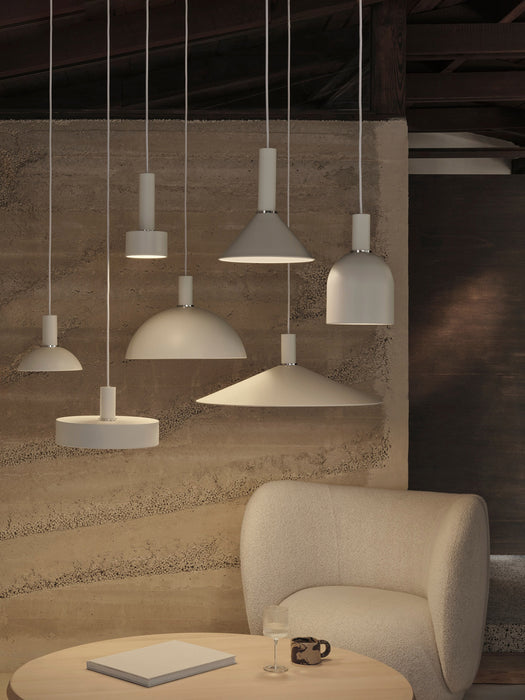

Collect Hoop Ceiling Lamp
The Collect Lighting collection by Ferm Living is a modular lighting concept that allows you to design your own lamp by combining different lamp holders and shades. With a versatile and functional approach, this series is designed to adapt to any space and style, offering a wide variety of shapes, finishes, and sizes to customize the light to suit each setting.
Each piece in the collection is a fusion of Scandinavian design and contemporary functionality, where simplicity and high-quality materials create an elegant and timeless aesthetic. Designed to blend into any environment, Collect Lighting lamps are perfect for highlighting light as a key element of interior design.
The Collect Hoop configuration adds a touch of subtle elegance with its curvilinear, minimalist design. Its metal hoop-shaped shade diffuses light softly and delicately, perfect for creating a cozy atmosphere on bedside tables, kitchen countertops, or in special corners. Its reflective white interior maximizes illumination, ensuring a balance between functionality and refined style.
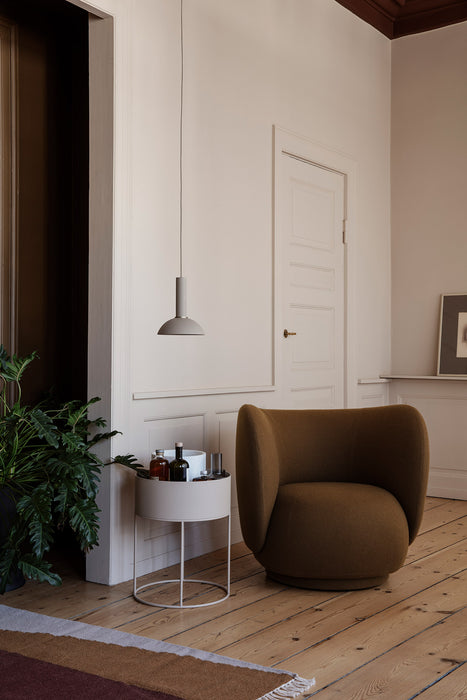

Collect Hoop Ceiling Lamp
The Collect Lighting collection by Ferm Living is a modular lighting concept that allows you to design your own lamp by combining different lamp holders and shades. With a versatile and functional approach, this series is designed to adapt to any space and style, offering a wide variety of shapes, finishes, and sizes to customize the light to suit each setting.
Each piece in the collection is a fusion of Scandinavian design and contemporary functionality, where simplicity and high-quality materials create an elegant and timeless aesthetic. Designed to blend into any environment, Collect Lighting lamps are perfect for highlighting light as a key element of interior design.
The Collect Hoop configuration adds a touch of subtle elegance with its curvilinear, minimalist design. Its metal hoop-shaped shade diffuses light softly and delicately, perfect for creating a cozy atmosphere on bedside tables, kitchen countertops, or in special corners. Its reflective white interior maximizes illumination, ensuring a balance between functionality and refined style.
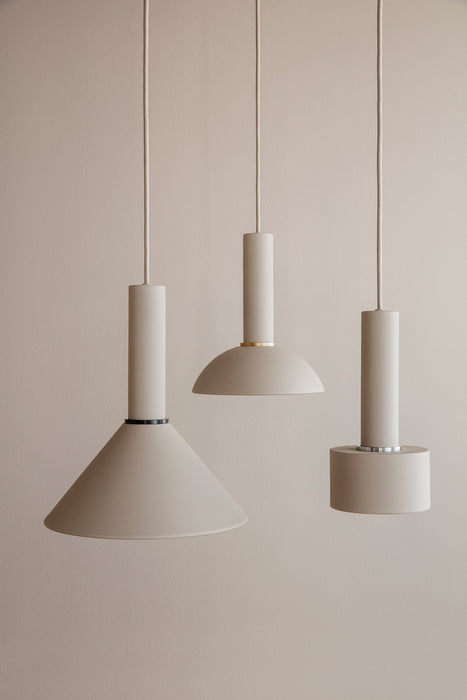

Collect Hoop Ceiling Lamp
The Collect Lighting collection by Ferm Living is a modular lighting concept that allows you to design your own lamp by combining different lamp holders and shades. With a versatile and functional approach, this series is designed to adapt to any space and style, offering a wide variety of shapes, finishes, and sizes to customize the light to suit each setting.
Each piece in the collection is a fusion of Scandinavian design and contemporary functionality, where simplicity and high-quality materials create an elegant and timeless aesthetic. Designed to blend into any environment, Collect Lighting lamps are perfect for highlighting light as a key element of interior design.
The Collect Hoop configuration adds a touch of subtle elegance with its curvilinear, minimalist design. Its metal hoop-shaped shade diffuses light softly and delicately, perfect for creating a cozy atmosphere on bedside tables, kitchen countertops, or in special corners. Its reflective white interior maximizes illumination, ensuring a balance between functionality and refined style.
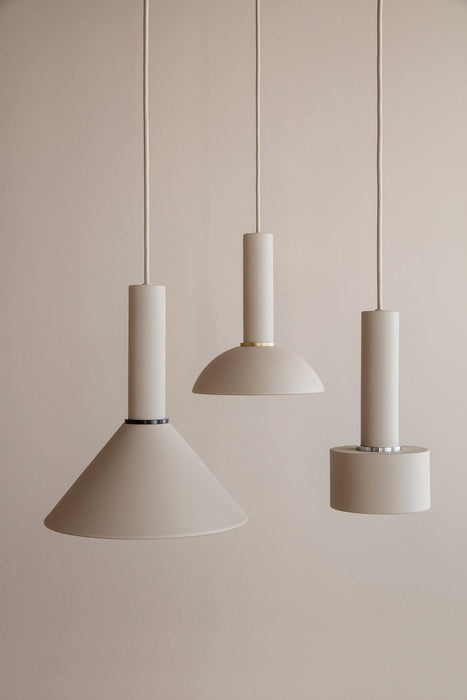

Collect Cone Ceiling Lamp
The Collect Lighting collection by Ferm Living is a modular lighting concept that allows you to design your own lamp by combining different lamp holders and shades. With a versatile and functional approach, this series is designed to adapt to any space and style, offering a wide variety of shapes, finishes, and sizes to customize the light to suit each setting.
Each piece in the collection is a fusion of Scandinavian design and contemporary functionality, where simplicity and high-quality materials create an elegant and timeless aesthetic. Designed to blend into any environment, Collect Lighting lamps are perfect for highlighting light as a key element of interior design.
The Collect Cone configuration combines a classic aesthetic with functional design. Inspired by the iconic Coolie and Empire lamps, its conical metal shade with a reflective white interior projects light precisely, elegantly illuminating any space. Perfect for dining tables, countertops, or reading nooks, its timeless design makes it a versatile choice for both modern and traditional spaces.
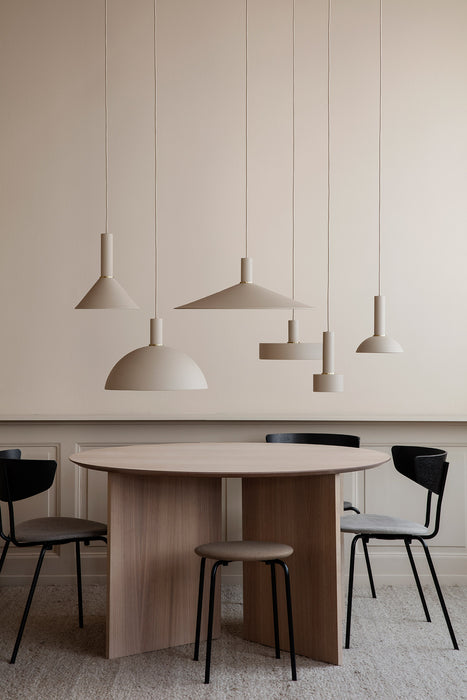

Collect Cone Ceiling Lamp
The Collect Lighting collection by Ferm Living is a modular lighting concept that allows you to design your own lamp by combining different lamp holders and shades. With a versatile and functional approach, this series is designed to adapt to any space and style, offering a wide variety of shapes, finishes, and sizes to customize the light to suit each setting.
Each piece in the collection is a fusion of Scandinavian design and contemporary functionality, where simplicity and high-quality materials create an elegant and timeless aesthetic. Designed to blend into any environment, Collect Lighting lamps are perfect for highlighting light as a key element of interior design.
The Collect Cone configuration combines a classic aesthetic with functional design. Inspired by the iconic Coolie and Empire lamps, its conical metal shade with a reflective white interior projects light precisely, elegantly illuminating any space. Perfect for dining tables, countertops, or reading nooks, its timeless design makes it a versatile choice for both modern and traditional spaces.
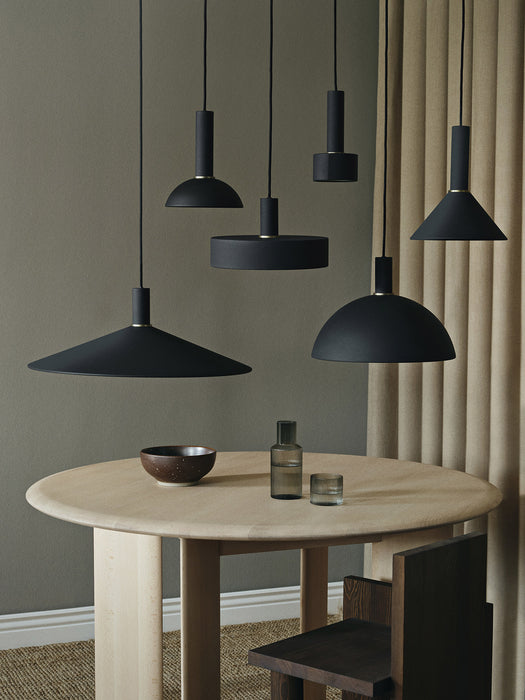

Collect Cone Ceiling Lamp
The Collect Lighting collection by Ferm Living is a modular lighting concept that allows you to design your own lamp by combining different lamp holders and shades. With a versatile and functional approach, this series is designed to adapt to any space and style, offering a wide variety of shapes, finishes, and sizes to customize the light to suit each setting.
Each piece in the collection is a fusion of Scandinavian design and contemporary functionality, where simplicity and high-quality materials create an elegant and timeless aesthetic. Designed to blend into any environment, Collect Lighting lamps are perfect for highlighting light as a key element of interior design.
The Collect Cone configuration combines a classic aesthetic with functional design. Inspired by the iconic Coolie and Empire lamps, its conical metal shade with a reflective white interior projects light precisely, elegantly illuminating any space. Perfect for dining tables, countertops, or reading nooks, its timeless design makes it a versatile choice for both modern and traditional spaces.
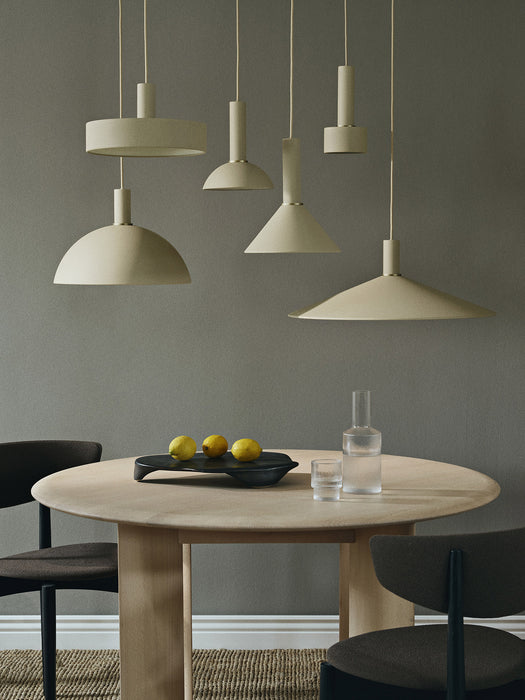

Collect Cone Ceiling Lamp
The Collect Lighting collection by Ferm Living is a modular lighting concept that allows you to design your own lamp by combining different lamp holders and shades. With a versatile and functional approach, this series is designed to adapt to any space and style, offering a wide variety of shapes, finishes, and sizes to customize the light to suit each setting.
Each piece in the collection is a fusion of Scandinavian design and contemporary functionality, where simplicity and high-quality materials create an elegant and timeless aesthetic. Designed to blend into any environment, Collect Lighting lamps are perfect for highlighting light as a key element of interior design.
The Collect Cone configuration combines a classic aesthetic with functional design. Inspired by the iconic Coolie and Empire lamps, its conical metal shade with a reflective white interior projects light precisely, elegantly illuminating any space. Perfect for dining tables, countertops, or reading nooks, its timeless design makes it a versatile choice for both modern and traditional spaces.
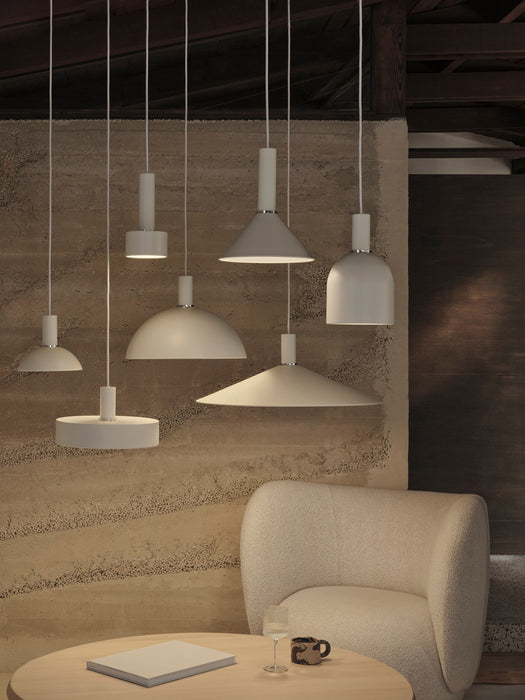

Collect Cone Ceiling Lamp
The Collect Lighting collection by Ferm Living is a modular lighting concept that allows you to design your own lamp by combining different lamp holders and shades. With a versatile and functional approach, this series is designed to adapt to any space and style, offering a wide variety of shapes, finishes, and sizes to customize the light to suit each setting.
Each piece in the collection is a fusion of Scandinavian design and contemporary functionality, where simplicity and high-quality materials create an elegant and timeless aesthetic. Designed to blend into any environment, Collect Lighting lamps are perfect for highlighting light as a key element of interior design.
The Collect Cone configuration combines a classic aesthetic with functional design. Inspired by the iconic Coolie and Empire lamps, its conical metal shade with a reflective white interior projects light precisely, elegantly illuminating any space. Perfect for dining tables, countertops, or reading nooks, its timeless design makes it a versatile choice for both modern and traditional spaces.

